Leading With
















56
64
Winter

















Acct. No. 390907 B ring iel h e h e h e ele r tingThirteen e r Bringing et e i h e le! Now Is The Time Now Is The Day Of Salvation r gener rt hel e ring e i ni e t e i h e le r n the rl le e t n ith e in the e h llenging n r heti ti e t er e n le e i h e le in r el n the n ti n An A ss e mblies o f God W orld Mission - International Ministries r r er n rtner hi hel r i e i n te ini tr te hing i i le hi n e ngeli ti tre h rt nitie ng the e i h e le I Will Bless Those Who Bless You Gen. 12:3

The shape of leadership influencemagazine.com
INFLUENCE MAGAZINE
1445 N. Boonville Avenue
Springfield, MO 65802-1894
Influence magazine is published by The General Council of the Assemblies of God.
Publisher: Douglas E. Clay
Executive Editor: George P. Wood
Lead Editor: Christina Quick
Designers: Steve Lopez, Josh Thomassen Advertising Coordinator: Ron Kopczick
CONTRIBUTORS
Kristel Acevedo, Ericka Andersen, Donna Barrett, Stephen Blandino, Mike Burnette, Doug Clay, Robert C. Crosby, John Cruz, Rollie Dimos, Tammy Dimos, Cheno Echevarria, Joshua Edmon, Donald A. Lichi, Jay Newland, Kara Powell, Julie Pratt, Christina Quick, Darrin J. Rodgers, Carolyn Tennant, Allen Tennison, Michelle Van Loon, Heather Weber, George P. Wood
SPECIAL THANKS
Donna L. Barrett, Malcolm Burleigh, Douglas E. Clay, Wilfredo De Jesús, Rick DuBose, Greg Mundis
EDITORIAL
o in o o ue ies contact edito influencema a ine com
ADVERTISING
Display rates available upon request. Contact advertising@influencemagazine.com. By accepting an advertisement, Influence does not endorse any advertiser or product. We reserve the right to reject advertisements not consistent with the magazine’s objectives.
Website: influencemagazine.com
Twitter: @theinfluencemag
Facebook: facebook.com/theinfluencemag
SUBSCRIPTIONS
To subscribe, go to influencemagazine.com or call 1.855.642.2011. Individual one-year subscriptions are $17. Bundle one-year subscriptions are $12 per subscription, for a minimum of six or more. International one-year subscriptions are $51, postage included. For additional subscription rates, contact subscribe@influencemagazine.com. Please send all other feedback, requests and questions to feedback@influencemagazine.com.
Copyright © 2023 by The General Council of the Assemblies o od oon i e e p in ie d Permission required for reprints. All rights reserved.
All materials published herein including, but not limited to articles, photographs, images, and illustrations are protected by copyright and owned or controlled by Influence magazine of The General Council of the Assemblies of God.
All Scripture quotations, unless otherwise indicated, are taken from the Holy Bible, New International Version®, NIV®. Copyright ©1973, 1978, 1984, 2011 by Biblica, Inc.™ Used by permission of Zondervan (www.zondervan.com). All rights reserved worldwide. The “NIV” and “New International Version” are trademarks registered in the United tates atent and adema k ice i ica nc
Influence magazine (USPS Publication: 0000-7180; ISSN: 2470-6795) is published quarterly by The General Council of the Assemblies of God (1445 N. Boonville Avenue, Springfield, MO 65802-1894). Periodicals postage paid at Springfield, Missouri, and at other mailing offices. Printed in the U.S.A.
Member of Evangelical Press Association

POSTMASTER
Send address changes to Influence ma a ine oon i e enue Springfield, MO 65802-1894
Winter 2023
2 Fall 2022















4 Winter 2023 CONTENTS Issue 41 | Winter 2023 Leading With Ten lessons from the apostle Paul
Why Women Leave Church And how to bring them back
ANDERSEN AG College Guide 2023 126 Prepare to Launch Five essentials for college success | JOSHUA EDMON 136 Directory of AG colleges and universities 46 56 64 72 124 What We Believe About the Trinity A series on the AG Statement of Fundamental Truths ALLEN TENNISON Ministry in Exile Thriving in a post-Christian culture
MIKE BURNETTE
ERICKA
HEATHER WEBER
To


Overcoming
Prisoner
LEADERSHIP
Repairing the Damage James Croone sees God moving amidst brokenness and conflict | GEORGE P. WOOD










Winter 2023 5
THE EDITOR
IT COUNT THIS IS MY STORY 8 10 108 122
DEPARTMENTS FROM
FROM THE HEART OF THE GS MAKE
Manage Time, Manage Attention Make the most of the new year | GEORGE P. WOOD
Rapture Anxiety or Blessed Hope? Why end-times theology should make us incurable optimists | DOUG CLAY
PROFILE SELF HOME PRACTICE ETHICS INSIGHTS HISTORY BOOKS 14 18 22 26 30 34 38 42
Be Still and Know Finding quiet time with God in a noisy world | ROBERT C. CROSBY and DONALD A. LICHI Stretching Your Home Budget How to make the most of your money in a bad economy | ROLLIE AND TAMMY DIMOS Turn Guests Into Disciples Developing an engagement pathway | JOHN CRUZ Managing Exousia in Leadership Four ways to steward the power differential | DONNA BARRETT America’s Changing Spiritual Landscape Five religious trends affecting faith | CHRISTINA QUICK
Preacher, Scholar, Educator The life and ministry of P.C. Nelson | DARRIN J. RODGERS
Reading Quadrilaterally What you should read in the coming year | GEORGE P. WOOD
Leadership Fears A 10-week study for leadership teams | STEPHEN BLANDINO
to Pastor The gospel changes everything | CHENO ECHEVARRIA
Praying for Awakening in 2023 A Conversation with Rick DuBose
Preaching Through the Multiverse Effective sermons for a digital world | JAY NEWLAND

Making Space for God How to lead spiritual gifts in public worship | CAROLYN TENNANT

Abused and Neglected Kids What to look for — and how to respond | JULIE PRATT



Social Media Guidance Helping teens navigate digital spaces | KARA POWELL and KRISTEL ACEVEDO Ministry in the Middle Caring for your congregation’s midlife members | MICHELLE VAN LOON More

6 Winter 2023 podcasts Check out our influencemagazine.com/podcast MINIS TRY Q& A PREACHING WORSHIP KIDS YOUTH ADULTS 84 88 92 96 100 104
than a magazine
Give your people more ways to talk about Jesus.

Access FREE resources that make it easy to share Jesus’ message of radical love.
















He Gets Us is the biggest campaign for Jesus ever. Learn more at HeGetsUsPartners.com/AG

 FROM THE EDITOR
FROM THE EDITOR
To Manage Time, Manage Attention
Make the most of the new year
By GEORGE P. WOOD
or many years , I have taken the turning of the calendar as an opportunity for reflection and resolution. I ask myself, What have I learned in the passing year? What do I want to accomplish in the coming one? Perhaps you do the same.
The answer that connects both questions for me as 2023 dawns is that if I want to manage my time, I must first and foremost manage my attention.



I was startled into this realization when I opened the Screen Time app on my iPhone and saw how much time I spent — wasted, really — on it. One week, I was on my phone nearly 41 hours watching videos, trolling through social media, and surfing the internet.
Over 90% of my phone usage was not related to work, though I hasten to add it occurred after hours or on the weekends. In other words, I wasted personal time, not company time. I doubt that makes things better.

I am not a workaholic who thinks life should be a long, hard slog from sunup to sundown, by the way. There is nothing wrong with a few hours of leisure every day, especially on Saturdays. Still, 41 hours just on my iPhone seems excessive.
A related problem appears when I looked at how I used my 40-hour workweek. As an editor, I have deadlines. either get publications off to the press or do not. ow often did put off necessary tasks until the last minute to focus on less-deadlineintensive interests?
Similarly, as a minister, weekend and midweek services impose hard limits on your time. You have to lead, preach, and pray regardless of whether you have prepared adequately. o you constantly find
yourself less than prepared to do the biggest parts of your job? Is it because you let the urgent crowd out the important? Do you spend too much time reacting to crises rather than working proactively toward long-range goals?
Or have we just whiled away the time viewing frivolities on our smartphones?
This year, I resolve to use my time better, both professionally and personally. I want to accomplish more for Christ and His kingdom and with my family and friends. So, I am deleting some apps, limiting iPhone usage, and focusing my attention where it matters more, both at work and at home. Perhaps you should do the same.
 GEORGE P. WOOD is executive editor of Influence magazine.
GEORGE P. WOOD is executive editor of Influence magazine.
8 Winter 2023





















22-1110-C ©2023 Global University • All Rights Reserved School for Evangelism and Discipleship • Discipleship for everyone • Proven, practical, Pentecostal • Materials in multiple languages Undergraduate School of Bible and Theology • Easy credit transfer • Minister and missionary discounts • Cursos en Español Graduate School of Theology • MA | MDiv | DMin • Minister and missionary discounts • Maestria en Español One UNIVERSITY Five SCHOOLS GLOBALUNIVERSITY.EDU INFO@GLOBALUNIVERSITY.EDU • 1.800.443.1083 AVE. • SPRINGFIELD, MO • 65804 BEREAN SCHOOL OF THE BIBLE 75 years of preparing God’s people for the work of the ministry • Credentialing courses • Continuing education • Leadership training • Discipleship material • Personal edification • Cursos en Español SCHOOL FOR MINISTRY DEVELOPMENT Every community deserves a qualified pastor • Credentialing courses • Accredited Associates Degree • Completely Web-based • Local church practicum • $5000
FROM THE HEART OF THE GS
Rapture Anxiety or Blessed Hope?
Why end-times theology should make us incurable optimists
 By DOUG CLAY
By DOUG CLAY
Will Jesus return in 2023? That question stirs hope in some and anxiety in others.
How can the thought of Jesus’ return produce anxiety? Stories of “Rapture anxiety” received prominent media attention in 2022. Some “exvangelicals” — people raised in Christian homes who now question traditional evangelical doctrines, often because of traumatic experiences — say the teaching of the Rapture caused them anxiety.
As a pastor, my heart aches for people who suffer trauma because of their church e periences.
Should the doctrine be a source of anxiety? Absolutely not!
Article 13 of the Assemblies of God’s Statement of Fundamental Truths says about the Rapture: “The resurrection of those who have fallen asleep in Christ and their translation together with those who are alive and remain unto the coming of the Lord is the imminent and blessed hope of the Church.”
The Rapture should calm anxious Christians rather than causing anxiety. No matter how bad things get, we know that our Blessed Hope is imminent!
10 Winter 2023
Our doctrinal statement lists four texts for the Rapture: 1 Thessalonians 4:16–17; Romans 8:23; Titus 2:13; and 1 Corinthians 15:51–52. A close look at the broader context of each passage reveals how the Rapture inspires hope.
In 1 Thessalonians 4:13–18, Paul addressed Christians who were worried about the deaths of fellow believers. Would they miss out on Christ’s return?
Paul calmed the Thessalonians’ anxiety by reminding them that for Christians, death is like falling asleep. The “trumpet call of God” is the alarm clock that will wake them when Christ comes. The dead will get up first, and then the living will oin them “in the air” to meet Christ.
“And so we will be with the Lord forever,” Paul concluded. “Therefore encourage one another with these words.”
In Romans 8:18–25, believers were troubled by their present sufferings. Those sufferings weren t merely personal; they were cosmic. “The whole creation has been groaning as in the pains of childbirth right up to the present time.”
Few things make us despair as much as deep, persistent suffering. s there an end to our suffering aul wrote that our suffering ends when hrist returns and accomplishes “our adoption to sonship, the redemption of our bodies.”
Paul immediately added this crucial statement: “For in this hope we were saved.”
Hope appears again in Titus 2:11–14. Indeed, verse 13 gives Article 13 of the Statement of Fundamental Truths its title: “The Blessed Hope.”
In this passage, what caused believers anxiety was sin, which Paul described as “ungodliness,” “worldly passions,” and “wickedness.”
Christ’s coming into the world shone a ray of hope on sinful humanity. “The grace of God has appeared that offers salvation to all people, aul wrote. n the meantime, believers should strive to lead godly lives as they await “the blessed hope — the appearing of the glory of our great God and Savior.”
Notice the time stamps on Paul’s words. “The grace of God has appeared” points to the past. Our

wait for “the blessed hope — the appearing of the glory” points to the future. As Christians, we don’t live between one anxiety and another. We live between grace and hope. That is our present reality!

In 1 Corinthians 15:50–58, death once again is the cause of anxiety. Few things worry us as much as our own mortality, not to mention that of our loved ones. We think of death as the end of life, but it isn’t.
“Listen, I tell you a mystery,” Paul wrote. “We will not all sleep, but we will all be changed — in a flash, in the twinkling of an eye, at the last trumpet. For the trumpet will sound, the dead will be raised imperishable, and we will be changed.”
Winter 2023 11
As Christians, we don’t live between one anxiety and another. We live between grace and hope.
For those who put their faith in Christ, death is not the end of life, for Jesus gives eternal life.
And so, we come back to the question: Should the Rapture be a source of anxiety? If we let the Bible teach us doctrine, the answer must be no. Sin, suffering, death — these are sources of anxiety. By contrast, Christ’s coming for His saints is always a source of hope.
I love what former Assemblies of God General Superintendent G. Raymond Carlson said about the link between Christ’s coming and Christian confidence:

The Christian’s hope centers in a Person and the sovereignty and the final triumph of that Person. For this reason, the Christian is the most optimistic person in the world. He knows that the chaos of today was predicted by our Lord as a forerunner to Christ’s second coming. He’s aware that God’s holy purposes will be fulfilled and hrist will be victorious. Belief in the coming of our Lord makes us incurable optimists.
If the Rapture is a source of hope, why do some people experience Rapture anxiety? Let me close by suggesting three reasons and a pastoral remedy for each.

First, too much speculation. Perhaps you remember the believer who published a book titled 88 Reasons Why the Rapture Will Be in 1988. When that didn’t happen, he issued revised editions in 1989, 1993, and 1994. In all four cases, his predictions were wrong.
We shouldn’t be surprised by this. After all, Jesus said, “About that day or hour no one knows, not even the angels in heaven, nor the Son, but only the Father. Be on guard! Be alert! You do not know
when that time will come” (Mark 13:32–33).
If even Christ didn’t know the day or hour of His return, then neither do we. We harm others (and our own reputations) when we claim to know more than we possibly can.
Second, too much bad news. Remember the 1972 end-times thriller A Thief in the Night This film emphasized the horrors of the Great Tribulation that will occur after Christ raptures the Church.
When we overemphasize the bad news of the Great Tribulation, people don’t hear the good news of Christ’s coming for His saints. Our preaching and teaching should not just paint a dark picture of the human condition, but they should also shine the light of God’s grace.
Third, too much legalism. Scripture clearly teaches we are saved by grace through faith, not by works (Ephesians 2:8–9). Titus 2:11–14 encourages us to live godly lives in light of the grace that has appeared and the hope that will appear. Our motivation for godly living, then, is grace and hope, not fear of judgment.
Hope is a fundamental need for people. Everyone needs some kind of hope! If you have a personal relationship with Christ then the message of the Rapture is about the hope of being found. Let’s make sure our preaching about the end times fills people with “blessed hope”!
of God USA.
12 Winter 2023
DOUG CLAY is general superintendent of the Assemblies
Our preaching and teaching should not just paint a dark picture of the human condition, but they should also shine the light of God’s grace.

Repairing the Damage
James Croone sees God moving amidst brokenness and con ict
 By GEORGE P. WOOD
By GEORGE P. WOOD
In his teens and 20s, James Croone ran with gang members and sold drugs. That lifestyle caught up with him in 1998 when he was arrested, tried, and sentenced for criminal activity.
“I got to a place in my life where I knew that there was something else,” Croone says. “There was something missing.”
14 Winter 2023
LEADERSHIP | PROFILE
Fortunately, Croone’s sister took him to church just before he began serving his sentence. They didn’t come from a particularly religious family. Growing up, Croone attended church only on rare occasions when his grandmother took him. That Sunday with his sister, however, he found what was missing from his life and made a commitment to Christ.
Consequently, Croone says, “I went into incarceration already at a place where the transformation had begun.”
Upon his release for good behavior in 1999, Croone matriculated at the A.L. Hardy Academy of Theology in Seattle. He eventually earned a doctorate in religious education in 2005.
Croone dates his call to ministry to this period. He adds, however, “I was more apt to want to teach than to pastor.”
The ardy cademy affirmed that calling and hired Croone as a professor.
In those early years of teaching at Hardy, Croone had an experience that refocused his vision of ministry. He was driving through the neighborhood where he used to sell drugs. Seeing addicts on the streets, Croone felt God prompting him to repair the damage he and other dealers had done there.
In time, this led to Croone’s work at Seattle’s Union Gospel Mission. Today, he is director of the Men’s Recovery Program for that historic mission.
The recovery program serves men who have experienced addiction, homelessness, and incarceration.
In prison, many are forced to join gangs based on race or ethnicity. They make these alliances to survive a physically dangerous place.
ife is different for them on the outside, however.
“When they get out of prison and come to the mission, they have one thing in common: They’re all treated as outcasts,” Croone says.
Prison pushed them apart, but recovery pulls them together as they begin to recognize they all have common struggles.
Based on his personal experience, Croone believes Christ has the power to redeem even the most broken lives.
“Ministering to people in recovery is a beautiful thing,” Croone says. “You see the transformation in their lives because you’re able to give them the gospel.”
Men in the recovery program often express surprise when they learn about Croone’s experiences with drugs and incarceration. “I want to be like you,” some of them say when they see what he achieved post-incarceration.
“You don’t want to be like me,” Croone always replies. “You want to be like Christ, because He’s the one who changed my life to make me who I am today.”
Croone wears many hats in addition to directing the men’s recovery program.
In 2014, Croone earned a master’s degree from Northwest University in Kirkland, Washington. That led to his appointment as an adjunct professor at the Assemblies of God school. Since 2015, Croone has taught introductory courses on the New Testament and the relationship between the gospel and culture.
Croone published his thesis in book form. Titled Seymour and Parham: The Move of God Amid elationship and Conflict, it examines the relationship between William J. Seymour and Charles F. Parham, noting how these leaders cooperated for the sake of evangelism but also clashed because of Parham’s racist attitudes.
Despite the disputes between Seymour and Parham, Croone believes God accomplished His purposes through their ministries.
The relational conflict between Seymour and Parham stands as a testament to many that God is
Winter 2023 15
“I got to a place in my life where I knew that there was something else. There was something missing.”
— James Croone
faithful despite human differences, roone writes in the book’s concluding paragraph. “The ignorance and indecisiveness of humans cannot prevent or hinder the accomplishing of God’s will.”
In 2017, Croone planted Risen Church, an Assemblies of God congregation on Seattle’s south side. (Croone is an ordained AG minister as well as an executive presbyter in the AG’s Northwest Ministry Network.)


“My desire has always been to have a multicultural church,” Croone says.


It is Croone’s way of repairing the damage racism has historically inflicted on merican congregations. His research into Seymour and Parham taught him to distinguish between two very different models of multiculturalism, however.
The first model focuses on assimilation. This was Parham’s model of ministry. He promoted Seymour’s ministry as long as Seymour did what Parham wanted him to do. The moment Parham felt the Azusa Street Mission had stepped out of the narrow confines of what arham felt appropriate, he excoriated the mission in frankly racist terms.
This cultural narrowness continues to be a problem today. Many churches express a desire to diversify their pastoral staff, leadership, and church membership. They want to look diverse, but the majority culture is in control of the congregation’s organizational culture, worship style, and ministry emphases.
n effect, roone says, such churches require new attendees to drop their culture off at the front door because they want everybody to worship God their way.”
A better model for multicultural churches focuses on acculturation. Revelation 7:9 describes the Church this way: “There before me was a great multitude that no one could count, from every nation, tribe, people and language, standing before the throne and before the Lamb” (emphasis added). This requires different groups to sacrifice their cultural preferences and privileges to accommodate others.
After all, according to John’s vision of the heavenly Church, no single race, ethnicity, culture, or language group dominates.
“Instead, they bring their own cultural way of worshipping God, which makes the Church even more magnificent, roone says.
They unite around what they all hold in common: “Salvation” — the ultimate repairing of the damages of sin — “belongs to our God, who sits on the throne, and to the Lamb” (Revelation 7:10).
16 Winter 2023
GEORGE P. WOOD is executive editor of Influence magazine.
“My desire has always been to have a multicultural church.”
— James Croone
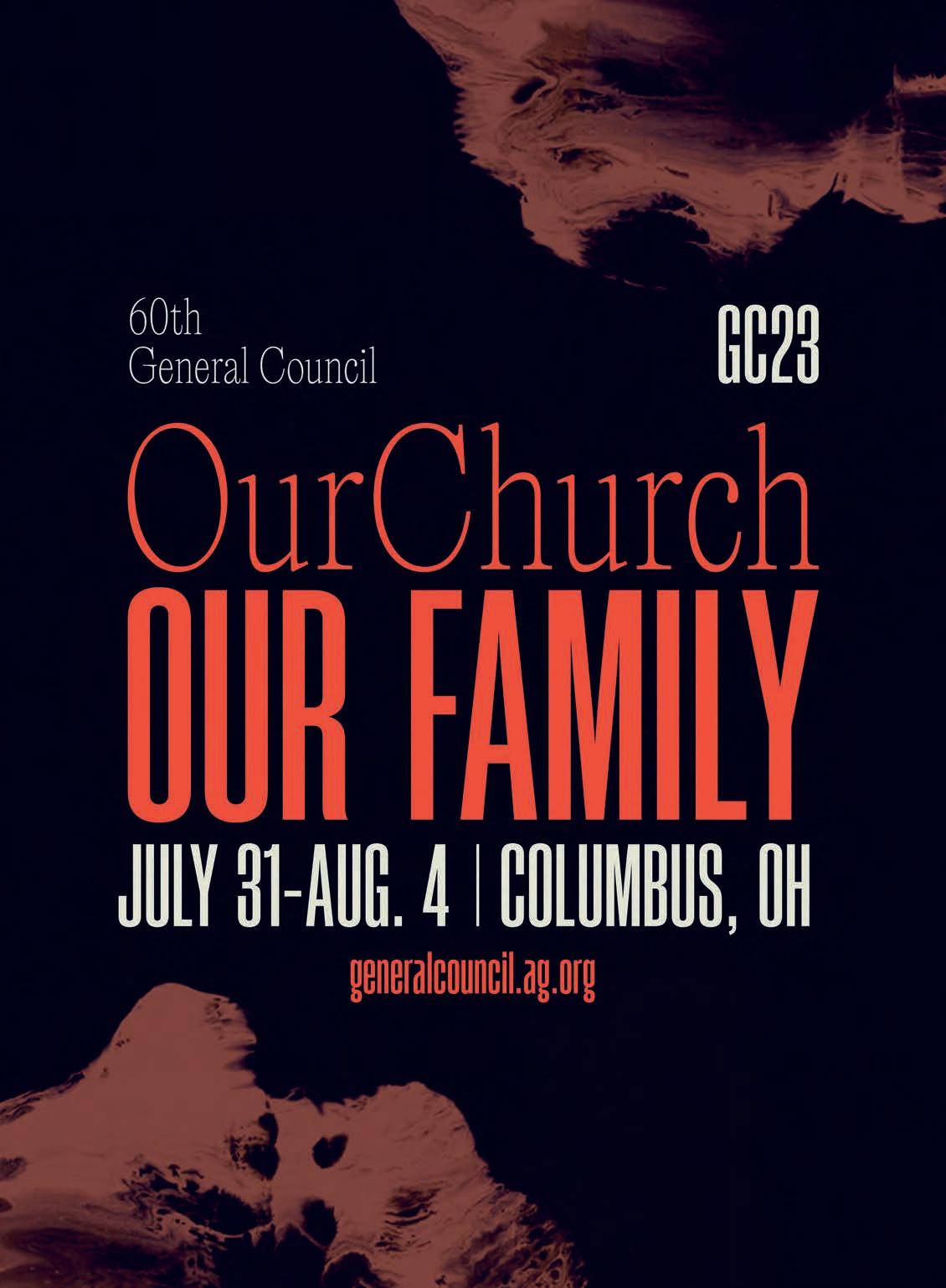
Be Still and Know Finding quiet time with God in a noisy world
By ROBERT C. CROSBY and DONALD A. LICHI
Do you hear that?”
I (Robert) asked my son that question on a recent trip to the Blue Ridge Mountains in North Carolina. When my son replied that he couldn’t hear anything, I told him that was the point.

After several busy months in ministry, this place provided what I most needed to hear: the refreshing sound of silence. We all need it at times.
It can be hard to quiet our souls in God’s presence while living in such a noisy world, but it is a needful discipline.
The Gospel of Mark records a time when Jesus encouraged His disciples to take a break from ministry: Because so many people were coming and going that they did not even have a chance to eat, [Jesus] said to them, “Come with me by yourselves to a quiet place and get some rest.” So they went away by themselves in a boat to a solitary place (6:31–32).
Sometimes we need to pull away from the noise. It is not just auditory commotion that distracts us and competes for our attention. Today’s noise is also visual, technological, and even psychological. Among other things, our smartphones and online
habits disquiet our lives, minds and ministries. Meanwhile, anxiety and depression are on the rise. In such an environment, church leaders need something that is increasingly difficult to find: soul rest.
Pause
Jesus said, “Come to me, all you who are weary and burdened, and I will give you rest. Take my yoke upon you and learn from me, for I am gentle and humble in heart, and you will find rest for your souls” (Matthew 11:28–29).
The only way to remove the debilitating noise in our lives and minds is by deliberately entering the quiet of God’s presence. Jesus himself “often withdrew to lonely places and prayed” (Luke 5:16). We need to do the same … and do it often Silence is among the most powerful therapeutic tools in counseling. A quiet pause is evocative, capturing attention and inviting reflection. uring a counseling session, silence creates space a client can fill with needed — and sometimes transforming — insights and emotions.
There is evidence unplugging from technology and spending time in quiet reflection or prayer
“
LEADERSHIP | SELF 18 Winter 2023
yields physical benefits as well, including lowering blood pressure, increasing focus, reducing stress, calming racing thoughts, improving sleep, and stimulating creativity.

Peace
Coming quietly into God’s presence and experiencing the peace e offers requires some ad ustments.
King David wrote, “My heart is not proud, LORD, my eyes are not haughty; I do not concern myself with great matters or things too wonderful for me. But I have calmed and quieted myself, I am like a weaned child with its mother; like a weaned child I am content” (Psalm 131:1–2).
Every parent has heard the frantic wails of a hungry infant. As children mature, they move past that stage. Noisy demands gradually give way to a growing sense of trust, contentment, and assured love. Similarly, David had learned to calm his soul in confident awareness of od s abiding presence.
For some, silence can be intimidating. Distractions keep us from confronting our inner selves — our fears, sins, histories, weaknesses, hurts, doubts, and regrets. Yet these are the very burdens the Lord wants to lift from our shoulders, in the stillness of lonely places.
When we shed the distractions, we can approach God attentively, with all our senses attuned to the promptings of the Holy Spirit. Quieting our souls helps us hear God’s “gentle whisper” (1 Kings 19:12).
It’s not enough to place “quiet time” with God on our schedules. We need to learn to quiet our souls in od s presence, finding comfort in is goodness rather than just passing Him a list of demands like a runner in a relay race. We regularly need to slow down and rediscover in the present moment what Jesus meant when He said, “Peace I leave with you; my peace I give you” (John 14:27).
Internal strength grows only as we step away from the cacophony of the world around us, lay
Winter 2023 19
The only way to remove the debilitating noise in our lives and minds is by deliberately entering the quiet of God’s presence.
down our burdens, and settle into God’s gentle embrace. When this becomes a consistent practice, it serves as a spiritual and emotional shock absorber through life’s challenges. Isaiah 30:15 says, “In quietness and trust is your strength.”
Pace
We need to become intentional about slowing down and reducing activity for a time. Quieting the soul involves a change of pace as we dial down our busyness and lean in to hear what God is saying. What does that look like in practical terms?
on Him, His Word, and His character. Listen with expectation. This requires silencing your voice and growing more attentive to His.
Stillness may take effort at first. our body may be at rest while your mind races on a bit. If some of the mental noises remain, don’t give up. Calm your concerns and surrender your cares. It often takes time.
Be aware of the attachment you naturally feel to noise, movement, and busyness, and begin to surrender that to od as an offering. Start small when it comes to the amount of time you quiet your soul. Linger in God’s presence, and celebrate every moment you do so.
The key is encountering God. Focus not on doing, but on simply being with God and spending time with Him. Psalm 46:10 says, “Be still, and know that I am God.” This is not about receiving some great insight; it is about becoming more aware of who God is.
Start by finding a place of quiet solitude. t might be a special chair in your church office, a place in your home, or a spot outdoors. Be sure it is a location where you can detach from the noise. Turn off your phone and close your laptop. Put a sign on your door if necessary.
Breathe deeply, relaxing in God’s presence. Rest your heart and mind until you can say, like David, “I have calmed and quieted myself.” If a project, task, or unfinished ob comes to mind, let the thought pass. Alternatively, jot it down to rid your mind of the noise.
This mental shift away from your projects and toward God’s presence is the “better” course Mary of Bethany chose. Jesus said to Mary’s busy sister, Martha, “You are worried and upset about many things, but few things are needed — or indeed only one. Mary has chosen what is better, and it will not be taken away from her” (Luke 10:41–42).
Make time to sit quietly at the feet of Jesus (Luke 10:39). Soak in God’s presence. Ask the Holy Spirit to come into this space. ait on od while reflecting
Expect the living God to be present with you in these moments of holy intimacy. ffer a word of thanksgiving to Him for this time in His presence.
Remember, your Heavenly Father has been looking forward to this time with you as well. He created you for this kind of fellowship. It is your true home — your refuge and place of rest.
ROBERT C. CROSBY, Ph.D., is president of Emerge Counseling Ministries.

DONALD A. LICHI, Ph.D., is vice president emeritus of Emerge Counseling Ministries.

20 Winter 2023
Internal strength grows only as we step away from the cacophony of the world around us, lay down our burdens, and settle into God’s gentle embrace.

























































































Stretching Your Home Budget
How to make the most of your money in a bad economy
 By ROLLIE AND TAMMY DIMOS
By ROLLIE AND TAMMY DIMOS
Amid ising inflati n and a looming recession, mericans are e periencing financial stress. Higher prices on consumer goods are straining monthly budgets, forcing many to trim expenses to make ends meet.
According to a report from Moody’s Analytics, the typical U.S. household in October 2022 needed $445 more per month to purchase the same amount of goods and services they bought 12 months earlier.

Assemblies of God (AG) ministers — who receive an average ministry compensation of $38,511, including benefits — are feeling the strain.
Many ministers take on extra work to supplement their incomes. A 2016 survey commissioned by the AG Empowering Stewardship program revealed that 4 in 10 AG ministers are bivocational.
Few ministers in the survey had adequate personal savings to weather unexpected expenses or a significant increase in daily living e penses. n fact,
83% of respondents reported less than $2,000 in personal savings.
Most ministers (86%) carried some type of debt. About 7 in 10 (69%) had non-mortgage debt, such as student loans, medical bills, and credit card balances. The average non-mortgage debt load was nearly $40,000.
It is not surprising, then, that three-quarters of ministers said they put off activities like home repairs, health care, and vacations during the previous year due to a lack of funds.
Concern for future expenses — including retirement, emergencies, and children’s college educations — were among the most common stressors in the lives of respondents.
Many AG ministers expressed concern about the state of their personal finances in 1 , and 4 did not have confidence their financial situations would improve over the next 10 years. Seven years later, these concerns likely remain for our ministers.
If you can relate, we recommend six ways to make the most of your money during difficult times.
LEADERSHIP | HOME
22 Winter 2023
1. Reign in Spending
There are two ways to stretch a budget when finances are tight: increasing revenue or reducing expenses.

To increase revenue, you can take on a second job or sell some of your belongings. However, reducing expenses is often the most logical place to start.
First, look through your monthly expenses and determine which ones are must-haves (needs) versus nice-to-have (wants).
Review any recurring expenses in the “wants” category. Until the economy rebounds, it may be necessary to eliminate some, if not all, of these expenses.

Perhaps you could shop around for a reasonably priced used car, keep your older vehicle going for another year, or share a ride with a co-worker.
Over the past year, we carefully evaluated what expenses were necessary. As a result, we have become less spontaneous with purchases, putting off things we may want until they become things we absolutely need.
2. Look for Discounts
For expenses you can’t avoid, there may be creative ways to lower their costs. Contact vendors and request a discount for being a loyal customer.
If you have credit card or medical debt, reach out to the service providers and ask for a lower interest rate. In some cases, you can negotiate a lower balance for an immediate payoff.
arrying a thermos of coffee or tea from home rather than making daily coffee shop visits is an obvious way to cut monthly costs. Packing your lunch instead of eating out is another.
Sometimes expense items overlap between the “needs” and “wants” categories. For instance, while a vehicle may be necessary to get to work, consider whether you really need to purchase the latest model, especially if it means going into debt.
Where there are contractual agreements, discounts are not always possible. However, you should review your fi ed e penses at least annually to determine whether lower-cost options are available. You might be able to find a better deal on your phone service, auto insurance, internet, or gym membership. eep an eye on store flyers and advertisements
Look through your monthly expenses
Winter 2023 23
and determine which ones are must-haves (needs) versus nice-to-have (wants).
to take advantage of discounts, coupons, and pricematching offers.
3. Shop Smarter
Buying generic or store-brand items is a time-honored way to save money. But you can also reduce costs by making changes to the kinds of items you purchase.
uring times of inflation, not all goods and services rise at the same rate. In 2022, for example, sweets, cereal products, and bakery goods increased in price more than fresh produce. Picking up a bag of oranges in place of cupcakes could lead to cost savings and better health.
Likewise, preparing meals and snacks from scratch is usually less expensive and more nutritious than purchasing processed foods or eating out. Getting kids involved in the planning and prep work is a great way to spend some family time together.
Buying in bulk can save on per unit prices, but it may require extra storage space.
To avoid purchasing items you don’t really need, make a weekly menu and shopping list before heading to the grocery store. We have discovered the worst thing we can do is shop on an empty stomach, with no real plan in place.
4. Invest
If you have margin in your monthly budget to save some cash, invest those funds wisely. While interest and dividend rates on checking and savings accounts are still relatively low, there are other options for higher rates.
AG Financial and the Assemblies of God Credit nion offer competitive demand and term certificates of deposit. The .S. government is offering the Federal Series I savings bonds (I bonds) at 6.89%.
If you have sizable assets, consider working with a financial e pert who can help you ma imi e your investments.
5. Remain Generous
Generosity is a biblical principle. So even as we tighten our belts, we need to help others.
Winter 2023
Proverbs 11:24–25 speaks of the blessings of giving: “One person gives freely, yet gains even more; another withholds unduly, but comes to poverty. A generous person will prosper; whoever refreshes others will be refreshed.”
And Proverbs 19:17 says, “Whoever is kind to the poor lends to the LORD, and he will reward them for what they have done.”
Ministers must lead by example, including in the areas of giving and showing generosity.
6. Utilize Resources
For more on managing personal finances successfully, read alanced ud et, alanced ife teps to ransfor in our inances Appendix A lists 102 ways to earn more, spend less, and create more margin.

For a limited time, AG ministers can get a free copy of this book by visiting po erin te ardship.co re uests. dditionally, ministers are eligible for financial grants of up to $1,500 to help start a retirement fund, pay medical bills, pay down student loan debt, or reduce financial stress due to the 1 pandemic. For more information on these grants, visit po erin te ardship.co rants.
ROLLIE DIMOS is director of Internal Audit for the Assemblies of God USA, as well as director of Empowering Stewardship, a ministry of the general treasurer’s office.

TAMMY DIMOS is project manager for the Assemblies of God general treasurer’s office and serves on the Empowering Stewardship team.

24



CHURCHES IN UKRAINE NEED OUR HELP WATCH VIDEO Michael W. Smith performs new, inspired instrumental single to help the Ukrainian people through CityServe International and its church network "CRY FOR " Hope CITYSERVE IS SUPPORTING CHURCHES IN UKRAINE AND SURROUNDING COUNTRIES WITH: Development of Church Safe Houses A supply chain of food & emergency supplies A transportation network to rush resources into Ukraine & evacuate people out Hosting pastor retreats for emotional & spiritual support CITYSERVE.US JOIN US IN THIS IMPORTANT WORK!
Turn Guests Into Disciples
Developing an engagement pathway
By JOHN CRUZ
When Candace invites people to church, she views it as an invitation to meet her family. As she explains it, church is where andace finally understood what it means to belong.

A successful professional in her 30s, Candace sees her community as a mission field. She even leads a small group of young women, taking them on the
same discipleship journey she has been traveling.
For Candace, church is not just a weekly event she attends, but a life she lives by serving, giving, and inviting every day.
hen she first visited our church, andace was far from Christ and struggling with anxiety, depression, and loneliness. Today, andace testifies that Jesus saved her, set her free, and gave her hope, purpose, and community.
Engagement Pathway
We all want to replicate stories like Candace’s. The question is, how can we turn guests into regular attendees who are passionately following Jesus? believe the most effective way is by establishing a clear engagement pathway that moves people into meaningful relationships with God and others. An engagement pathway is a series of sequential,
26 Winter 2023
LEADERSHIP | PRACTICE
relationally driven discipleship steps that take newcomers from where they are to where God wants them to be. Following are eight things I learned through the process of developing an engagement pathway as part of our church’s pastoral team.
1. Begin with the end in view. If someone who doesn’t know Jesus starts attending your church, how would you like his or her life to be different five years from now?
An engagement pathway is about discipleship, not just attendance. Five years from now, we want to see today’s newcomers serving, giving, participating in missions, viewing their work as worship, and actively sharing their faith.
This perspective has helped clarify the journey on which we are taking people, from the moment they arrive at our church for the first time.
2. Know your community. As we built our engagement pathway, we sought a deeper understanding of our community. We researched demographics and talked with local leaders.
We also became more attentive to our neighbors, engaging them in conversations, hearing their stories, and listening to their challenges and concerns.
ou can do the same. o to your local coffee shop and get to know people. Find out what motivates them, and consider how your church can minister to their needs.
3. Focus on relationships instead of events. Events might attract crowds, but if you want people to stick around, you must build personal connections. To turn guests into disciples, you need to provide opportunities for them to form relationships.
Our church hosts a number of events just for guests, from newcomers’ parties to one-on-one meetings over lunch or coffee. ut the purpose of these is always relational.
t the beginning of our pathway, we also offer classes with low commitment requirements, as well as small groups that revolve around life stages or felt needs, such as parenting groups for mothers of toddlers and support groups.
4. Emphasize movement, not numbers. Each step of the pathway should intuitively flow into the next, with new connections forming along the way.
For e ample, at Step 1, a first time guest fills out a connect card. At Step 2, the guest receives a personal invitation to a party for newcomers. At Step 3, he or she responds to an opportunity to register for a one-time class on ways to connect.
As we move people from newcomers to disciples, the ob ective is progress. That can mean redefining wins. Instead of looking at how many people attended an event, consider what percentage of those who came moved from the event to a weekend service or small group.
Instead of counting bodies, budgets, and buildings, look for movement. hen you redefine wins in this way, an engagement pathway becomes necessary — and beautiful.
5. Encourage baby steps. A step that might seem small to longtime members can feel like a huge commitment to a de-churched family or a seeker who has never attended church. Ease in your guests, inviting them to participate at whatever level feels comfortable for them.
any people show up at church for the first time during a moment of personal crisis, when they already feel overwhelmed and overextended. Create baby steps to help them move forward one step at a time.
Celebrating each step with newcomers before presenting them with another small step makes spiritual growth tangible and exciting.
Most guests will visit your church digitally before they ever step foot in your building. Be sure your website is welcoming, easy to navigate, and answers the questions newcomers are asking.
Include content that goes beyond promotion,
Winter 2023 27
To turn guests into disciples, you need to provide opportunities for them to form relationships.
inviting newcomers into relationship by taking a baby step, such as submitting a prayer request.
6. Improve the experiences of visitors. When newcomers arrive in person, be ready.
As a corporate hospitality consultant for many years, I learned to put myself in the shoes of guests arriving for the first time. would ask myself, Does this hotel lobby feel inviting? What does the atmosphere co unicate This exercise helped me notice details people who worked there missed.
I asked my clients what they wanted people to know about them and their values the moment they walked in. This is a good question for churches as well.
You ultimately want to point newcomers to Jesus so they can experience life transformation. But keep in mind the visitor’s experience includes more than just the sermon.
How easy is your church’s parking lot to navigate? How does the foyer look and smell? Are volunteers friendly, informed, and joyful? Is there a sense of hospitality at every touch point?
7. Build on your strengths. In addition to shoring up areas that needed improvement, we capitalized on what was already working.
For instance, some of our small groups had great facilitators who were prepared to receive newcomers. So, we started promoting those groups.
Recognizing we have great people in our church, we also encouraged our pastors, staff members, and volunteers to share their stories, talk with newcomers, and practice biblical hospitality (1 Peter 4.9).
What about your congregation is outstanding? Where are you operating at your best? Play to those
strengths, and find ways to make them even stronger.
8. Always have a next step. At some point during every service, offer a ne t step. our engagement pathway should eventually include water baptism, participating in serving opportunities, and joining a small group or class.
However, be careful to walk with newcomers at their own pace. Find ways to help them belong even before they believe. Whether the next step is visiting the guest area or meeting the pastor during a brief reception, keep it simple.
If you hand out gifts, make sure it is something newcomers actually want. Chances are, they are not interested in your book, sermons, or any self-promoting gimmick. Provide something of value to them, not you. onsider a gift card to a local coffee shop or a nice coffee mug, for e ample.
As people move through the engagement pathway and make more relational connections, their commitment levels will increase. And as the Holy Spirit works in their lives, their faith will grow.
Because each local church is unique, no two engagement pathways are identical. Yet every congregation has a calling to make disciples. An engagement pathway can help your guests take the first steps toward a lifetime of following Jesus.
 JOHN CRUZ
JOHN CRUZ
is an executive pastor at Northplace Church (AG) in Sachse, Texas.

28 Winter 2023
You ultimately want to point newcomers to Jesus so they can experience life transformation. But keep in mind the visitor’s experience includes more than just the sermon.

Managing Exousia in Leadership Four ways to steward the power differential
 By DONNA BARRETT
By DONNA BARRETT
While shopping with my sister, I overheard a tense conversation in the checkout line.
A customer had purchased dresses for his wife. He was unhappy the bill included sales tax. He told the clerk the purchase should be tax-exempt because he led a nonprofit organi ation.
To calm the man, the clerk called her manager, explained the situation, and asked what she should do. Then she relayed the manager’s reply: The sale was not tax-exempt.
The customer powered up and harshly demanded to speak directly to the manager. The clerk politely refused. Finally, he relented and paid the bill, stomping out of the store in a huff. When I stepped to the counter, I congratulated the clerk for handling a difficult customer well. also confirmed that ta exemption applies only to purchases made for a nonprofit organi ation, not for personal use.
She thanked me, then delivered the bad news: The quarrelsome customer was a local pastor.
30 Winter 2023 LEADERSHIP | ETHICS
Power and Privilege
As a form of leadership, ministry involves authority and privilege. The New Testament uses the same Greek word — exousia — for both.
Mark 3:14–15 describes the spiritual authority Jesus gave His disciples: “He appointed twelve that they might be with him and that he might send them out to preach and to have authority [exousia] to drive out demons.”
aul identified certain privileges apostles received, asking, “Don’t we have the right [exousia] to food and drink? Don’t we have the right [exousia] to take a believing wife along with us, as do the other apostles and the Lord’s brothers and Cephas? Or is it only I and Barnabas who lack the right [exousia] to not work for a living?” (1 Corinthians 9:4–6).
These Scriptures indicate that neither authority nor privilege are immoral per se. They can be used for good or for evil. What matters is how we steward them.
Jesus warned against using them for selfish ends: “The kings of the Gentiles lord it over them; and those who exercise authority over them call themselves Benefactors. But you are not to be like that” (Luke 22:25–26).
The contentious pastor is an example of how not to exercise exousia. He tried to “lord it over” the store clerk through his aggressive posture, emotions, and tone of voice. And he tried to leverage his status as a nonprofit leader to benefit his family financially.
By contrast, Jesus showed how to steward authority and privilege well. In Philippians 2, Paul exhorted believers to “have the same mindset as Christ Jesus” (verse 5). o nothing out of selfish ambition or vain conceit,” Paul wrote. “Rather, in humility value others above yourselves, not looking to your own interests but each of you to the interests of the others” (verses 3–4).
Jesus e emplified this humble service through
the Incarnation and the Cross. Although He was “in very nature God,” Jesus “did not consider equality with God something to be used to his own advantage” (verse 6). Instead, He took “the very nature of a servant, being made in human likeness” (verse 7). Jesus incarnated humility.
The Cross showed the extent of Christ’s concern for our interests. Jesus “humbled himself by becoming obedient to death — even death on a cross!” (verse 8).
Elsewhere, Paul wrote, “In [Christ] we have redemption through his blood” (Ephesians 1:7). Jesus served our need for salvation.
All Christians, but especially Christian leaders, are supposed to have “the same mindset as Christ Jesus.” Like Christ, we should use whatever authority and privilege we have selflessl , not selfishl
The exousia of Christian ministry, then, is the authority and privilege of serving others.
Stewarding Exousia Well
As ministers, we know we ought to lead like Jesus did, but we are tempted to lead like unscrupulous kings instead. Below are four ways to steward our authority and privilege appropriately.
1. Recognize that a power differential exists. If you want to resist a temptation, you have to admit it exists. Too often, we don’t acknowledge that a power differential operates in the background of our ministries.
The term po er di erential refers to the fact that leaders have more exousia in an organization than followers do. We have decision-making authority. Church members defer to us, calling us “Pastor” or “Reverend.” We have status as leaders in the broader community. We receive a salary and benefits for our work.
hen the senior pastor leads a staff meeting, a youth pastor drives home high schoolers after Wednesday night services, or a pastoral counselor
Winter 2023 31
Like Christ, we should use whatever authority and privilege we have sel essly, not sel shly.
meets with a congregant whose marriage is on the rocks, the power differential is at work.
Acknowledging this dynamic reminds us that our choices during every encounter have the potential to help or harm. And it’s our responsibility to manage the power differential ethically even when the other person isn’t aware of it.
2. Notice the early stages of compromise. No one who answers the call to ministry sets out to “lord it over” others. The spirit of domination starts small.
For example, a pastor pays for a personal meal with the church credit card and tells the treasurer he lost the receipt. A 20-something youth pastor pays too much attention to an attractive high school junior. A pastoral counselor leaves a reassuring hand on the shoulder of a distraught client a little too long.
The little foxes ruin the vineyard, the Bible says (Song of Songs 2:15).
It is impossible to make a list of do’s and don’ts for every situation you may face. But it is possible to self-monitor, show respect, and demonstrate Christ’s love consistently.
Self-evaluation is crucial to character development. Character is what we do when we think no one is watching. It’s how we treat the less powerful when no one is around but them and us.
Simply stop at the end of each day and evaluate yourself. Have I powered up on anyone or taken advantage of my position? Have I treated my colleagues and direct reports with utmost respect? Have I been fair even when I could have gotten away with less? Have I asked for forgiveness when necessary?
3. Take responsibility. Not long ago, I read in the newspaper about a minister who claimed to be the victim of a prostitute. He said the prostitute lured him into sex against his will.
When unhealthy people get caught in a
misdeed, their instinctive reaction is to blame others or appeal to circumstances beyond their control. They claim to be victims, not perpetrators. It’s someone else’s fault.
Spiritually mature leaders take responsibility for their actions and do so right away. They manage their relationships responsibly from the get-go. As the old spiritual put it, “Not my brother, not my sister, but it’s me, O Lord, standin’ in the need of prayer.”
4. Welcome accountability. In my present role, I have noticed that abuses of power lie at the base of many ministerial discipline cases. An unhealthy understanding of authority and privilege is the root of eventual misconduct. Initially, the inappropriate actions are subtle; others often notice them before the leader recognizes there is a problem.
In ministry, as on the highway, lines are our friends. Your church’s board, constitution and bylaws, policies and procedures; standard accounting practices; and good relational boundaries protect both you and others. They channel the power of your ministry toward good results.
That’s why ministers should welcome external accountability even as they develop their internal moral compasses.
If the past few years of clergy abuse scandals have taught us anything, it’s that the world is watching to see how we lead. Let’s make sure people see Christ’s humble service in how we steward our authority and privilege!
BARRETT is general secretary of the Assemblies of God in Springfield, Missouri.

32 Winter 2023
DONNA
Character is what we do when we think no one is watching. It’s how we treat the less powerful when no one is around but them and us.

America’s Changing Spiritual Landscape
Five religious trends affecting faith
By CHRISTINA QUICK
Seventy years ago, “Walking to Church” by Norman Rockwell appeared on the cover of The Saturday Evening Post. The painting depicts a family of five strolling along a city sidewalk in their Sunday finery, ibles in hand. ringing bell and a tall steeple with a cross are visible in the distance.
For an increasing number of Americans, the notion of church attendance is as antiquated as the milk bottles and barber pole Rockwell included in his scene. For others, nearly three years of pandemic disruptions have changed the way they interact with church.

In 1955, about half of Gallup poll respondents (49%) said they had attended religious services within the past week. y 1 , the figure had fallen to 34%. And in 2021, amid the pandemic, 30% reported attending services, either in person or remotely.
Instead of walking to church, it seems many are walking away. Statistical insights help paint a picture of our nation’s changing spiritual landscape. Following are five trends to watch.
1. Rising ‘Nones’
growing share of mericans identifies as atheist, agnostic, or “nothing in particular” — a group collectively known as “nones.”
n 1 , 5 of mericans were religiously unaffiliated, according to Pew Research Center. By 2020, 3 in 10 were “nones.”
During the same period, those claiming Christian identity declined from 90% to 64%.
A recent Pew report projected that if current trends continue, Christians will make up less than half the U.S. population by 2070, while the “nones” will approach majority status.
According to the report, “religious switching” is partly responsible for these shifts. In recent years, fewer people raised in Christianity have retained their faith as adults. And fewer individuals who grew up unaffiliated have converted to hristianity. Among U.S. adults brought up in Christian households, 31% of 30- to 39-year-olds and 18% of those 4 and older now identify as religiously unaffiliated.
“With each generation, progressively fewer adults retain the Christian identity they were raised with, which in turn means fewer parents are raising their children in Christian households,” the Pew report says.
mong those with unaffiliated upbringings, 1 of respondents aged 30–39 reported becoming Christians, while 39% of older adults converted. Not all “nones” reject spirituality outright. In a 2007 Baylor University survey, 29% of religiously
34 Winter 2023
LEADERSHIP | INSIGHTS
unaffiliated respondents e pressed belief in a higher power or cosmic force. Ten percent agreed with the statement, “I have no doubts that God exists.” And 7% said, “I believe in God, but with some doubts.”

2. Shrinking Membership
For the first time since Gallup started tracking the trend eight decades ago, the share of U.S. adults claiming church membership fell below 50% in 2020.
In 1937, 73% of respondents reported belonging to a place of worship. In 2020, just 47% said the same.
While the pandemic may have played a role, membership was declining long before 1 . bout of .S. adults belonged to a church at the beginning of the 21st century, but that figure has decreased steadily over the past 20 years.
According to Gallup, the rise of the “nones” over the same time frame accounts for more than half of this loss. The rest may reflect diminished interest in formal membership among those who claim religious affiliation.
A majority of senior adults have retained church membership. Two-thirds of those born before 1946 belong to a church, as do 58% of baby boomers. By comparison, half of Generation X and 36% of millennials are church members.
Although the sampling of Gen Z adults was limited, Gallup estimates this younger generation’s membership representation is similar to that of millennials.
3. Struggling Small Churches
Even in an age of megachurches, churches are getting smaller — and some are disappearing entirely.
Using data from 34 denominations and organizations, representing 60% of all U.S. Protestant churches, Lifeway Research calculated a net loss of 1,500 churches during 2019 — as 4,500 closed and 3,000 opened.
In early 2020, before pandemic shutdowns began, 65% of all U.S. congregations had fewer than 100 weekly attendees, according to Faith Communities Today, a research initiative involving the Hartford Institute for Religion Research. In 2000, 45% of congregations were that size.
Over the past 20 years, median worship attendance has declined from 137 to 65, Faith Communities Today reports. (This means half of all churches
Winter 2023 35
1972 2020 RELIGIOUS "NONES" 5% 30%
Among U.S. adults brought up in Christian households, 31% of 30- to 39-year-olds and 18% of those 40 and older now identify as religiously una iated
have more than 65 attendees and half have fewer.) And more small churches are shrinking than growing.
While the full impact of the pandemic remains to be seen, a loss of attendees and resources has exacerbated the strain on many struggling congregations.

4. Changing Habits
Before the pandemic, attending church was mostly an in person activity. t s a different world today.
According to a 2022 Barna Group report, 20% of churchgoing adults are still attending almost exclusively online. Another 26% have adopted a hybrid approach, switching between remote and in-person attendance.
March 2022 data from Pew Research Center showed more churchgoing evangelicals attending in a hybrid fashion during the previous month (46%) than exclusively in person (29%) or exclusively online (18%).
Nearly half of churchgoers in the Pew survey (47%) said their churches were still following pandemic-related changes, such as social distancing.
5. Maturing Millennials
There is good news regarding millennials. Despite their tendency toward disaffiliation, this generation of young adults is showing an increased interest in church.
As young adults mature and take on family responsibilities, the support of a church community often becomes more appealing. Some millennials may be following that trajectory.
Since 2019, the share of millennials attending church weekly has jumped 18 percentage points, from 21% to 39%, according to Barna Group. (Barna defines millennials as those born from 1 84– 8, which puts them in their mid-20s to late-30s.)
This shift is particularly remarkable considering it took place during the pandemic. Even as attendance among boomers declined, millennial participation rose. One reason seems to be the
ability and willingness of young adults to embrace online church.
Millennial adoption of hybrid options remains high. Among millennial Christians who attended church before the pandemic, 1 in 3 now attend both remotely and in person.
Much of the attendance boost came from young racial and ethnic minorities. Prior to 2019, church attendance rates were roughly the same for white and non-white millennials. By 2022, 45% of nonwhite millennials were attending weekly, compared to 35% of white millennials.
Moving Forward
As a new year begins, these trends present both challenges and opportunities for church leaders. inistry is seldom easy, but the fields are indeed ripe for harvest.
Statistics cannot reveal what is happening in the spiritual realm. However, these insights can help us grow in understanding. Studiously and prayerfully discerning the times lays the groundwork for moving forward in wisdom and faith.
Whether you are evangelizing your religiously unaffiliated neighbors or looking for new ways to connect with online worshippers, you can lean on the One who accompanies you in your going (Matthew 28:19–20).
Jesus said, “I will build my church, and the gates of Hades will not overcome it” (Matthew 16:18).
36
Winter 2023
CHRISTINA
QUICK
is lead editor of Influence magazine.
Studiously and prayerfully discerning the times lays the groundwork for moving forward in wisdom and faith.

Preacher, Scholar, Educator
The life and ministry of P.C. elson
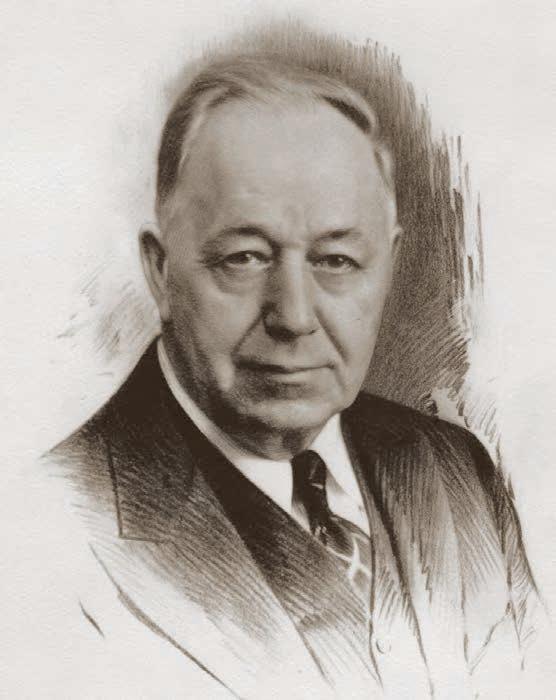 By DARRIN J. RODGERS
By DARRIN J. RODGERS
Few theologians or educators made a greater impact on the Assemblies of God than Peter Christopher (“P.C.”) Nelson (1868–1942).
Nelson was born in Denmark, immigrating to the U.S. with his family at age 4. He graduated from Rochester Theological Seminary in New York and became a leading Baptist evangelist, pastor and writer.
Following his Spirit baptism in 1920, Nelson joined the Assemblies of God. He founded Southwestern Bible School (now Southwestern Assemblies of God University in Waxahachie, Texas) and emerged as one of the most articulate Pentecostal theologians of his era.
The Early Years
Nelson did not become a theological powerhouse overnight. ifficult years of ministry and education stirred his heart and cultivated his abilities.
Sensing a calling to preach at age 20, Nelson enrolled at Baptist Theological Seminary in Chicago. However, Nelson struggled because of a weak academic foundation, so he switched to a university program that would help prepare him for seminary.
After his marriage in 1893, Nelson dropped out of school and took a pastorate in Iowa to support his wife. Yet he continued to feel a tug toward furthering his education, which Nelson believed was necessary for effective preaching.
In 1899, Nelson resigned his pastorate and took his wife and three small children to New York, where he attended Rochester Theological Seminary. There Nelson studied theology and languages and became missionary department editor of The aptist ecord magazine.
Nelson studied under Augustus Strong, one of the most notable Baptist theologians of the time. He adopted Strong’s beliefs that the Bible is the inspired Word of God and a Christian needs the Holy Spirit to understand Scripture.
Anointed Ministry
Although his ministry did not always go according to plan, Nelson learned to pivot and place his future in God’s hands. Upon graduating seminary in 1902,
38 Winter 2023 LEADERSHIP | HISTORY
Nelson sought to become a missionary. Finding no open door for missions, however, he accepted another pastorate in Iowa.
In 1904, Nelson launched into evangelistic ministry and a became a leading Baptist evangelist in the Midwest. He assembled an entourage of evangelists and musicians known as the Nelson Evangelistic Party and held large, extended revival campaigns in churches, city auditoriums, opera houses, and tents across dozens of states. God anointed Nelson’s ministry, and local newspapers reported that thousands of people converted to Christ.
World War I brought Nelson’s revival ministry to a close. In 1917, Nelson became a camp pastor at an Army base in Michigan. Two years later, he returned to local church ministry, assuming the pastorate of Conley Memorial Baptist Church in Detroit.
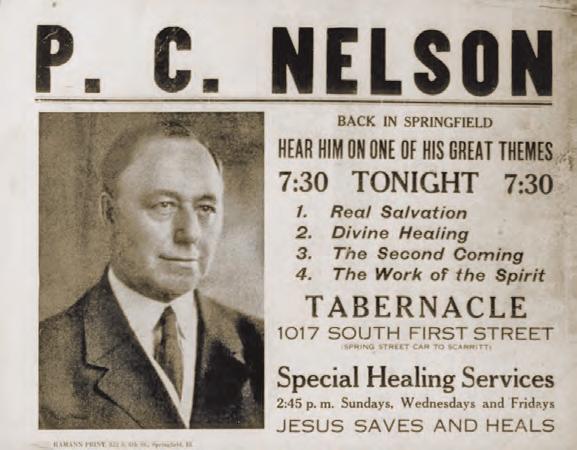
Biblical Foundations



A group of Baptist elders interviewing Nelson as a pastoral candidate once asked him, “Would you stay with the Baptists or stand on the Bible?”
Nelson responded, “I will stick with the Bible, no matter what becomes of the Baptists!”
At the time, Nelson had no intention of leaving the Baptists. However, it was Nelson’s bedrock belief in the authority of Scripture that eventually led him to embrace Pentecostalism.
Two experiences during 1920 challenged Nelson’s assumptions about how he read the Bible. Like many evangelicals at the time, Nelson read his experiences — or lack of experiences — into Scripture, assuming the cessation of certain biblical spiritual gifts and doubting the existence of modern-day miracles.
While having dinner with friends, Nelson heard someone speaking in an unknown tongue. Afterward, Nelson began to search the Scriptures and concluded he could not biblically support his belief that such gifts had ceased.
Several months later, an automobile struck Nelson and severely injured him. Following a miraculous healing, Nelson made a promise to God that he would tell the world about what happened to him.
Pentecostal Evangelist
Nelson kept his promise. Within a few weeks, he received the baptism in the Holy Spirit. Nelson resigned his pastorate and returned to evangelistic ministry.
Hundreds of people accepted Christ or experienced healing at elson s first campaign in ichita,
Winter 2023 39
Following a miraculous healing, Nelson made a promise to God that he would tell the world about what happened to him.
Kansas, during the spring of 1921.
Nelson was not alone in his spiritual pilgrimage. Several other well-known Baptist ministers became Pentecostal at about this time, including William Keeney Towner, J.N. Hoover, and Mae Eleanor Frey. Nelson’s ministry received widespread support from Baptists, Pentecostals, and Christians from other denominations.
After engaging in energetic ministry as an independent evangelist for several years, Nelson recognized the value of belonging to an organization that could provide networking opportunities and structures to help advance the young Pentecostal movement.
Upon joining the Assemblies of God in 1925, Nelson almost immediately began providing leadership within the Fellowship, which had formed only 11 years earlier.
Pentecostal Educator
A long-standing advocate of solid biblical training for ministers, Nelson started Southwestern Bible School in Enid, Oklahoma, in 1927. He also operated Southwestern Press, a publishing house that churned out numerous theological books for his students and the broader Pentecostal movement.
Nelson’s linguistic abilities were legendary. As a child of immigrants, he learned English and several Scandinavian languages at a young age. In college and seminary, Nelson concentrated on the study of foreign languages. He believed learning languages would help him get close to immigrants and provide opportunities for sharing the gospel.
According to a 1915 biographical sketch, Nelson had a reading knowledge of 25 languages (primarily biblical, classical, and European) and could conduct religious services in several of them.
The difficult years of training paid off. elson s theological training and mastery of Hebrew and Greek provided Pentecostals with solid biblical scholarship. is prolific pen yielded seven ma or theological works, many of which were published in

multiple editions, and a number of smaller booklets.
Nelson’s 1934 translation of Eric Lund’s Hermeneutics from Spanish into English remained a standard Bible college text for decades.
ost of elson s writings were first published in the midst of the reat epression, during the final 10 years of his life. i le octrines (1934), the most influential of elson s books, aimed to provide a simple explanation of the AG Statement of Fundamental Truths.
Nearly nine decades later and now in its eighth English-language edition, i le octrines holds the distinction of remaining continuously in print longer than any other current Gospel Publishing House title. The volume has also been translated into numerous other languages, making it one of the most widely read AG theological textbooks around the world.
Nelson worked long hours and slept little, dedicating himself to preaching, teaching, writing, and carrying out his administrative duties. These labors took a toll on his health, and Nelson literally worked himself to death. He died on Oct. 26, 1 4 , but elson s influence continues through the people his ministry touched, his writings, and Southwestern Assemblies of God University.

40 Winter
2023
DARRIN J. RODGERS, J.D., is director of the Flower Pentecostal Heritage Center at the Assemblies of God national office in Springfield, Missouri.
Nelson’s theological training and mastery of Hebrew and Greek provided Pentecostals with solid biblical scholarship.




Preserving and Sharing Our Heritage Access digitized periodicals, photographs and other research tools Invite Ruthie Oberg to preach at your church or district event Explore treasures in over 150 languages in the world’s largest Pentecostal archives Located in the Assemblies of God National Offices Open daily, Monday through Friday, 9:00 a.m. to 4:30 p.m. | No admission fee | Free parking | Handicap accessible 1445 N. Boonville Avenue, Springfield, MO 65802 | email: archives@ag.org | call: 877.840.5200 Discover 3,000 sq. ft. of fascinating exhibits and interactive video kiosks Flower Pentecostal Heritage Center ONLINE AT iFPHC.ORG EVENTS SPEAKER RESEARCH CENTER MUSEUM
Reading Quadrilaterally
What you should read in the coming year
 By GEORGE P. WOOD
By GEORGE P. WOOD
Pastors are public intellectuals. We don’t think of ourselves that way, but we should. After all, we stand before congregations and use words to apply Scripture to the various situations our audience members face.
That is why Paul exhorted Timothy, “Do your best to present yourself to God as one approved, a worker who does not need to be ashamed and who correctly handles the word of truth” (2 Timothy 2:15).
To do that, we need to be students of both Word and world. Graduating from Bible school is a start, but we must be lifelong learners. That means becoming lifelong readers.
So, what books should we read? The Wesleyan uadrilateral offers a good rubric for a balanced reading plan.
The Quadrilateral Coined by Albert C. Outler, the term “Wesleyan Quadrilateral” refers to the “distinctive theological method” of John Wesley, the founder of Methodism — a movement that significantly influenced entecostalism. The quadrilateral consists of Scripture, tradition, reason, and experience.
Those four things are not equal in authority, however. According to Outler, Wesley’s theology received “Scripture as its preeminent norm but interfaced with tradition, reason and Christian experience as dynamic and interactive aids in the interpretation of the Word of God in Scripture.”
The benefit of the quadrilateral is that it preserves the primacy of Scripture, it profits from the wisdom of tradition, it accepts the disciplines of critical reason, and its stress on the Christian experience of grace gives it existential force,” Outler wrote.
That last point is significant. pplying Scripture to various situations requires exegetical competence, historical understanding, and logical thinking. But it also requires personal experience. Pastors cannot apply Scripture to our audience members’ situations unless we have first applied it to ourselves.
The genius of the quadrilateral is that it joins together what we often put asunder: revelation (Scripture) and response (tradition, reason,
42 Winter 2023 LEADERSHIP | BOOKS
experience); co unit (tradition) and individuality (experience); intellect (reason) and feeling (experience).
The Wesleyan Quadrilateral thus presents a holistic theological method.
The Reading Plan
If we use the quadrilateral as a rubric, we will read books in four broad categories:
1. Scripture. This category includes the Bible and books that help us understand it, such as commentaries, biblical theologies, and reference works.
Scripture is infallible, so it takes pride of place in a pastor’s reading plan. We read it to prepare sermons, obviously. Just as importantly, however, we read it for spiritual and theological formation.
My devotional practice is to read Psalms and Proverbs monthly, the New Testament quarterly, and the Old Testament semiannually. Whatever your devotional practice, make sure to read all Scripture at least once a year.
For theological formation, I recommend reading two biblical books in depth — one from each testament.
This year, my primary source reading is Philip Schaff s Creeds of Christendom, which includes the texts of denominational creeds, confessions, and catechisms from the second to the 19th centuries.
My secondary source reading is Jaroslav Pelikan’s The Christian Tradition, which traces the development of Christian doctrine from the apostolic era to the 20th century. I also plan to revisit Assemblies of God histories by Edith L. Blumhofer and Gary B. McGee.
Scripture is ambivalent about tradition. It establishes certain traditions, such as Communion. “I received from the Lord what I also passed on to you,” Paul wrote in 1 Corinthians 11:23. But it also warns against tradition. “You have let go of the commands of God and are holding on to human traditions,” Jesus told the Pharisees (Mark 7:8).
revelation (Scripture)
response (tradition, reason, experience); community (tradition) and individuality
intellect (reason) and feeling (experience).
I’m reading Psalms and Romans this year in several translations, along with reputable commentaries on each.
Finally, consider tackling a single-volume introduction to or theology of the Old or New Testament, such as An Introduction to the e esta ent by David A. deSilva or he e esta ent in Its World by N.T. Wright and Michael F. Bird.
2. Tradition. This category includes historic books and historical books. The former are primary sources, important books by long-dead Christians. The latter are secondary sources, more recent books about Christian faith and practice through the ages.
This ambivalence explains why tradition does not hold ultimate authority.
By the same token, though, we would be fools to ignore tradition. Doing so is what C.S. Lewis called “chronological snobbery” — “the uncritical acceptance of the intellectual climate of our own age and the assumption that whatever has gone out of date is on that count discredited.”
The best corrective to such snobbery is reading old books and books about the past.
3. Reason. This category focuses on critical thinking and includes systematic theology, philosophy, ethics, apologetics, and serious nonfiction
Winter 2023 43
The quadrilateral joins together what we often put asunder:
and
(experience);
about current events and controversies. It asks, “What is the Christian worldview, and how does it affect how we live in the world

Pentecostals sometimes pooh-pooh reason, citing prooftexts such as 1 Corinthians 1:25: “The foolishness of God is wiser than human wisdom.” Or Colossians 2:8: “See to it that no one takes you captive through hollow and deceptive philosophy.”
Interpreted correctly, neither text indicts reason per se, however. God is rational, and He created us in His image. That’s why Jesus said the greatest commandment is to love God with “all your mind” (Mark 12:30).
Indeed, Jesus used logic and evidence to demonstrate the truth of His gospel. o ic “How can Satan drive out Satan? If a kingdom is divided against itself, that kingdom cannot stand” (Mark 3:23–24). idence: ut your finger here see my hands. Reach out your hand and put it into my side. Stop doubting and believe” (John 20:27).
Christianity is a reasonable faith. Logic and evidence are its friends. Thinking clearly, well, and truthfully are aids to spiritual devotion and ethical living.
If you don’t know where to start reading in this category, I recommend four titles by C.S. Lewis: Mere Christianity; The Problem of Pain; iracles; and The Abolition of Man. Lewis deconverted from atheism to Christianity, and these books make the case for faith.
4. Experience. This category is where the rubber of the gospel meets the road of life. It’s where, to use Paul’s words, “I no longer live, but Christ lives in me” (Galatians 2:20). This is the space where the Holy Spirit works.
The reading of Scripture and classic Christian literature plays a huge role in Christian experience. It certainly did in John Wesley’s life.
At a Bible study, listening to someone read Martin Luther’s commentary on Romans, Wesley wrote: “I felt my heart strangely warmed. I felt I did trust in Christ … and an assurance was given me that He had taken away my sins.”
That kind of experience is what we seek for ourselves and our church members. There are scores of devotionals, books on spiritual discipline, and works of practical theology to help us develop it. Well-known contemporary authors in this category include Eugene Peterson, Dallas Willard, and Richard J. Foster.
mong entecostals, have benefited especially from the writings of Gary Tyra. In Getting Real, Tyra coined the term “pneumatological realism” to describe the tremendous difference it makes when the Holy Spirit is experienced in ways that are real and existentially-impactful rather than merely theoretical, conceptual, or ritualistic.”
I’ve found that biographies also help me see how Christians have experienced grace in the various circumstances of their lives. Eerdmans’ Library of Religious Biography and Oxford’s Spiritual Lives series have several good books about well-known Christians.
What Matters Most
I conclude where I began. Pastors are public intellectuals who apply God’s Word to the world. Our goal is that through the Spirit, Christ can live in us and our audience. Reading quadrilaterally is a means to that end.
I’ve outlined why you should read books in the broad categories of Scripture, tradition, reason, and experience. I’ve shared my own goals, and I’ve suggested a few titles.
What matters most is not my reasons or suggestions, however, but your desire for growth. Whatever you read, do your best to present yourself to God as one approved!
44
Winter 2023
GEORGE P. WOOD is executive editor of Influence magazine.
all in a translation that is accessible to new believers.















Take a look inside or get your copies here Bulk deals and packs of 20 available at NavPress.com SHARE THE GOOD NEWS FOR THE BIGGEST DAYS OF THE YEAR Podcast: influencemagazine.com/podcast Facebook: @theinfluencemag Twitter: @theinfluencemag Web: influencemagazine.com Downloads: influencemagazine.com/downloads Back issues: influencemagazine.com/issues More than a magazine
Ideal for outreach, these pocket-sized booklets contain the essential narratives of Scripture covering the birth, death, and resurrection of Jesus,
Leading With


46 Winter 2023
Ten lessons from the apostle Paul
BY MIKE BURNETTE
s we start a new year, optimism feels elusive. After all, the past three years have not been easy. We have experienced a global pandemic, racial tensions, political divides, supply chain issues, international conflict, and rising inflation — with seemingly no end in sight.
The words of James challenge me in these times: “Consider it pure joy, my brothers and sisters, whenever you face trials of many kinds” (James 1:2).
Winter 2023 47
I love reminding others of the powerful promise of God in this text: “The testing of your faith produces perseverance” (verse 3). I have even preached on it. But in the midst of discouragement, I sometimes have a hard time receiving it for myself.
Notice the language, though: “Consider it pure joy” (emphasis added). This suggests a conscious decision to adopt a mindset of joy. Whatever we face in the months ahead, I hope we can take the command of James seriously — choosing to walk in oy, despite trials and difficulties.
How is that possible? How can we consider it pure joy when we’re going through pain? How do we trust God for a joyful disposition when everything around us seems to be falling apart? How can we hold onto joy when our church families are suffering, and our congregations are struggling to recover?


In his letter to the Philippians, the apostle Paul modeled for us a way to navigate pain without losing the oy of the ord. aul endured more suffering than any pastor or church planter I have ever met. He was chased by angry religious mobs, beaten, flogged, stoned and left for dead, arrested and imprisoned, and shipwrecked. Yet Paul maintained his love for the Lord and people through it all.
Even though Paul was in prison when he wrote it, Philippians is often called the “epistle of joy.” Paul’s passion for Jesus and heart of joy are evident throughout this letter.
Philippians reveals 10 disciplines for leading with joy in hard times. These lessons are as relevant in as they were in the first century.
1. Pray First
Paul began his letter not with complaints about his situation, but with references to his prayers for others (Philippians 1:3–11). His prayers were joyful, filled with gratitude for the spiritual growth of the hilippians. espite his suffering, aul re oiced in the knowledge that others were flourishing. Prayer is crucial for maintaining a joyful heart. No matter what we’re going through, God is deserving of our praise. He is still saving lost people, delivering the oppressed, restoring marriages, and bringing prodigals home. And even when it is not immediately apparent, God is still working on our behalf.
In Romans 8:18, Paul wrote, “I consider that our present sufferings are not worth comparing with the glory that will be revealed in us.” We can choose joy as we remember God is good, doing good, and has good things in store.
2. Keep Rejoicing



Paul recognized that his incarceration was advancing the gospel — inside and outside the prison (Philippians 1:12–14). He chose to see his struggles as opportunities, not reasons to pull away from his calling.

48 Winter 2023
Some people were preaching with wrong motives, trying to create more trouble for Paul (verses 15–17). Yet Paul saw the good even in that painful reality: “The important thing is that in every way, whether from false motives or true, Christ is preached. And because of this I rejoice … and I will continue to rejoice” (verse 18).
These past three years have been difficult for pastors. any of us have struggled to see challenges as avenues for advancing the gospel. Shutdowns, restrictions, and disruptions left us feeling limited, confined, and uncomfortable at times. There may have even been moments when some of our trials felt personal.




On days like these, the temptation to retreat or quit is real. But we are on assignment, so we cannot give up.
Instead, we can ask God to help us seize new ministry opportunities and see what He is doing. Our circumstances may change, but the Lord never changes. His mission is advancing. That reality should give us great joy.
God is still on His throne. He is not stressed out or worried. Jesus is changing lives through your ministry. That you get to participate in building od s kingdom, even in difficult times, is reason for rejoicing.
3. Boldly Live for Jesus




Knowing the Philippian church was earnestly praying for him was a source of great comfort and of joy for Paul (Philippians 1:19). eople are praying for you, too. any of them may never tell you about their prayers, but they are seeking God on your behalf. You are not alone in ministry. The power of the Holy Spirit and the prayers of God’s people are sustaining you.
Paul had no guarantees he would survive his situation. Yet Paul’s hope was ultimately in hrist. eagerly e pect and hope that will in no way be ashamed, but will have sufficient courage so that now as always Christ will be exalted in my body, whether by life or by death,” Paul wrote. “For to me, to live is Christ and to die is gain” (verses 20–21).
Winter 2023 49
Our circumstances may change, but the Lord never changes. His mission is advancing. That reality should give us great joy.
To paraphrase, “As long as I am alive, I will live every moment for Jesus, and should I leave this life, I will be with Jesus.” How can you lose with that outlook? Nothing could discourage Paul from the joy of serving Jesus.


Verse 27 is my favorite in all of Scripture: “Whatever happens, conduct yourselves in a manner worthy of the gospel of Christ.” That should be the goal of every minister, and indeed every follower of Jesus.
In the face of pain and uncertainty, remain fully devoted to Jesus and His mission. Don’t put your hope in fickle things, like attendance numbers, giving figures, online sermon views, or even your physical health. Hope in Christ, rejoicing in the privilege of serving Him faithfully. In good times and bad, live each day to glorify God and point people to Him.


4. Imitate the Lord efore aul suffered for the ord, the ord suffered for him — and us. n light of this, aul reminded the hilippians to do nothing out of selfish ambition, but to follow the model of Jesus (Philippians 2:1–8).
In fact, Paul told them to “have the same mindset as Christ Jesus,” who assumed “the very nature of a servant” (verses 5–7).

50 Winter 2023
When you are tempted to give up or lose your joy, remember the example of Jesus. He maintained motivation by seeing the big picture and the joyous victory that was just ahead.
What a privilege it is to serve others as our Lord served us. Hebrews 12:1–2 says, “Let us run with perseverance the race marked out for us, fi ing our eyes on Jesus, the pioneer and perfecter of faith. For the joy set before him he endured the cross, scorning its shame, and sat down at the right hand of the throne of God” (emphasis added).
Jesus is the ne we are to imitate. e suffered for us and ahead of us. saiah called hrist a man of suffering, and familiar with pain ( saiah 5 : ). Jesus was also full of oy through the Holy Spirit” (Luke 10:21). Our Lord knew pain like we do, but He always kept an eternal perspective and a servant’s heart.
When you are tempted to give up or lose your joy, remember the example of Jesus. He maintained motivation by seeing the big picture and the joyous victory that was just ahead. s you serve in painful times, ask the oly Spirit to fill you with the oy of the ord. our example will help bring people to Jesus, who deserves all the glory. For, “God exalted him to the highest place and gave him the name that is above every name, that at the name of Jesus every knee should bow, in heaven and on earth and under the earth, and every tongue acknowledge that Jesus Christ is Lord, to the glory of God the Father” (Philippians 2:9–11).
5. Watch Your Mouth
Paul told the Philippians, “Do everything without grumbling or arguing” (2:14). Perhaps he had heard something that prompted him to say this. Or maybe Paul had just dealt with church people long enough, he knew they needed a reminder.
Over the past few years, it has grieved me to see pastors and Christian leaders losing their cool, ranting online, and exploding at the very people they are called to shepherd. Such actions divide the Church and deepen the skepticism of many outside the faith.
Everyone has opinions, including ministers. But we should never let our personal views overshadow the message of the gospel. We are supposed to be salt and light, not vinegar in a wound or diesel fuel on a fire. Some leaders have lost their oy because they are disputing and grumbling with the world instead of leading people out of the world.
Sometimes the best course of action is to refrain from engaging — to hold your tongue and guard your heart. leader s words carry a lot of weight, so hold firmly to the word of life (verse 16). Leverage your platform to preach the gospel rather than your position on a cultural or political issue.
Don’t let your heart get so wrapped up in what is happening in the moment that you lose perspective on eternity. emember aul s charge in olossians :1– : Since, then, you have been raised with Christ, set your hearts on things above, where Christ is, seated at the right hand of God. Set your minds on things above, not on earthly things.”
hen we fi ate on temporal things, we risk losing our oy for the things above. aul refused to take that bait. Instead, he was able to say, “I am glad and rejoice with all of you. So you too should be glad and rejoice with me” (Philippians 2:17–18).
6. Look for Partnerships
One of the primary complaints I hear from pastors is that ministry is lonely, especially senior leadership. We give our lives to God and to the service of His people, and somehow along the way, we become isolated in ministry.
Paul did not do ministry alone, and we shouldn’t either. Paul partnered with others,
Winter 2023 51
including his spiritual son Timothy and co-worker paphroditus ( hilippians :1 – ). ven while incarcerated, Paul leaned on the help of friends. They lightened his load — and his mood (verse 1 ).
Pain and stress are inevitable. Sharing the burden with others is essential if you want to remain active and healthy in ministry. An African proverb says, “If you want to go fast, go alone. If you want to go far, go together.” I would rephrase it this way: “If you want to enjoy serving the Lord for a long time, do it with people who bring you joy.”
Build friendships. Invest in someone, or a few people. Attend ministers’ meetings. Take time to have meals with your team members. Give others the chance to minister alongside you while guiding and developing them.
7. Trust God
There is tremendous value in developing as a leader, growing your academic pedigree, sitting in the room with influential thinkers, advancing in your career, and having a long tenure where God has placed you. Every minister should be a lifelong learner and keep growing.
owever, our confidence should not come from our growth, academics, skills, or tenure. e are Spirit led, Spirit filled leaders. e walk by faith in Jesus, led by the oly Spirit.
Paul told the Philippians to trust the Lord above all else. After sharing his own impressive resume, aul said it was worthless compared to knowing Jesus ( hilippians : –8). n fact, Paul likened his list of accolades to a steaming pile of rubbish or dung by comparison.


Despite having one of the best ministry resumes of all time, Paul knew the real prize was to “gain Christ and be found in him,” having a “righteousness that comes from God on the basis of faith” (verses 8–9).

“I want to know Christ,” Paul said, “yes, to know the power of his resurrection and participation in his sufferings, becoming like him in his death, and so, somehow, attaining to the resurrection from the dead” (verses 10–11).
Like a hamster in a wheel, we have the tendency to spin and spin in our strengths and abilities. When something goes wrong or someone is hurting, we run to the rescue. Our motives are noble, but our energy is finite. nd when we become worn out from trusting in our own strength, we lose our joy.
Early in the pandemic, I had breakfast with another pastor. As I did with all my pastor friends, asked, ow are you doing ow are you handling all the cra y stuff that is happening around us?”
y friend calmly said, m doing great. o change for me at all.


e was the first person to say that. pushed back on this response, thinking my friend might quietly share some crisis moments with me. But he simply said, “None of this has surprised God, and none of it has disrupted my early mornings with the Lord. I still meet with Him every morning, and I do what He tells me. Nothing has changed.”
God has called us to follow Jesus, not a career path. He tells us to walk by faith, not in fear.
e must learn to find our oy in following hrist above any other pursuit. s we put our trust and confidence in Jesus, peace and oy will flood our hearts.
52 Winter 2023
8. Focus on the Future
The song “Moving Forward” by Israel Houghton has become a private battle cry for me over the past few years. The lyrics proclaim, “I’m not going back, I’m moving ahead. Here to declare to you my past is over in you. All things are made new, surrendered my life to Christ.”
Those words are reminiscent of what Paul wrote in Philippians 3:12–14:
I press on to take hold of that for which Christ Jesus took hold of me. Brothers and sisters, I do not consider myself yet to have taken hold of it. But one thing I do: Forgetting what is behind and straining toward what is ahead, I press on toward the goal to win the prize for which God has called me heavenward in Christ Jesus.
During pandemic disruptions, my wife and I got to a place where we expressed our grief to one another and to God. We mourned relationships lost and cried over what would never be again for our church and even our nation. Then we decided there was still a future for our purpose and calling, and we would press on toward it.

Paul admonished the Christians in Philippi to stay forward-focused in their faith and keep moving. He challenged them through his example not to look back — to forget what was behind them and focus on what was in front of them.
Keep putting one foot in front of the other, and keep your eyes on Jesus. Reach the lost. Build the Church. Feed the hungry. Pray for the sick. And above all, grow in your relationship with Christ (verse 10).

Many of us have spent more time remembering what was instead of focusing on where God is leading. The glory days for the Church are always ahead, never behind.
You will stay in grief if you remain in the past. If your focus remains on the good old days, you will never stop mourning the reality that those days are gone. If you keep your focus on the pain or mistakes of your past, you will constantly see life through the lens of loss and sorrow.
Be a futurist. Look ahead and dream again. God is always on the move. His kingdom is always advancing. Ask God to give you a vision for your ministry again. Then align your heart and focus with His plan.
Remember that “our citizenship is in heaven. And we eagerly await a Savior from there, the Lord Jesus Christ” (Philippians 3:20).
Winter 2023 53
As we put our trust and confidence in Jesus, peace and joy will flood our hearts.
9. Rejoice Again and Again




















s he prepared to close his letter, aul encouraged the believers to stand firm in the ord (Philippians 4:1).
Paul also told them to choose a joyful attitude: “Rejoice in the Lord always. I will say it again: Rejoice!” (verse 4). This is command language. Rejoicing is an imperative so vital to the Christian life Paul felt the need to repeat it.
Sometimes it seems there is little to feel e cited about in our pain filled world. So many things sap us of joy and distract us from worship and rejoicing. But we must choose a posture of re oicing — today, and again tomorrow, and multiple times the ne t day. aul went on to offer guidance on how to do this, e plaining that we need to keep our minds set on the right things:
Finally, brothers and sisters, whatever is true, whatever is noble, whatever is right, whatever is pure, whatever is lovely, whatever is admirable — if anything is e cellent or praiseworthy — think about such things. hatever you have learned or received or heard from me, or seen in me — put it into practice. nd the od of peace will be with you (verses 8–9).
If you keep your mind and heart in the right place, rejoicing again and again will become much easier. Turn off the network news for a season. nplug from social media for a long while. Devote more time to reading God’s Word and praying. Start dating your spouse again. Laugh with your kids. e oice in the ord — over and over, day after day.


10. Give Generously


Finally, Paul thanked the Philippians for their generosity (Philippians 4:10–19). They had become faithful financial partners in his ministry.
Paul was careful not to pressure the congregation for more money. He assured the Philippians his contentment was not dependent on his resources. God had sustained Paul
54 Winter 2023
If you keep your mind and heart in the right place, rejoicing again and again will become much easier.
through good and bad times and would continue to be with him. But Paul also wanted the hilippians to know he was deeply grateful for their renewed financial commitment.
As believers contributed to the ministry, Paul and his team were able to do more. Workers were preaching the gospel, serving the poor, and leading people to Christ because of the generosity of those who gave. The fruitfulness of Paul’s ministry was directly tied to the support of the Philippians, and God took notice, crediting it to their account (verse 17).

Jesus said, t is more blessed to give than to receive ( cts : 5). f you want to e perience joy again, give. Support missionaries. Go all in with compassion work through organizations like Convoy of Hope. Set aside time each month to serve the poor in your city and help the suffering. ive more than you ve ever given before. rovide your staff members with a generous bonus. all your district leaders to tell them you love them and are praying for them, and then send each one a gift card. enerosity brings oy and blessings. aul said, y od will meet all your needs according to the riches of his glory in Christ Jesus” (verse 19). Give generously, and watch the joy return to your life.
A Final Word
erhaps you are struggling to walk in the oy of the ord. aybe you are working hard for God without a sense of His presence, or you have forgotten what it’s like to minister out of the overflow of time with im. erhaps you feel like you are on the hamster wheel of running in your power instead of God’s.
Throughout the Bible, it is evident that God wants people to experience His joy. Consider these texts:
• “The joy of the LORD is your strength” (Nehemiah 8:10). eeping may stay for the night, but re oicing comes in the morning ( salm :5).
• “Do not be afraid. I bring you good news that will cause great joy for all the people. Today in the town of avid a Savior has been born to you he is the essiah, the ord” (Luke 2:10–11).
• “The fruit of the Spirit is love, joy, peace, forbearance, kindness, goodness, faithfulness” (Galatians 5:22).
sk od to fill you afresh with is Spirit and renew your oy. augh again. ope again. Follow the example of Christ. Refrain from pointless arguments. Develop partnerships in ministry. Remember the victory you have in Jesus. Leave the past behind. Choose joy daily. Give generously. Life is painful at times, but we have the promise of joy. So rejoice in the Lord always. I will say it again: Rejoice!
MIKE BURNETTE, D.Min., is lead pastor of LifePoint Church in Clarksville, Tennessee.

Winter 2023 55
MINISTRY IN EXILE














































































































































































































































































































































































































































































IN A POST-CHRISTIAN CULTURE
THRIVING
By HEATHER WEBER





















































































































































































































































































Winter 2023 57
In March 2020, our church’s rental space in downtown Iowa City, Iowa, suddenly closed to us. We had nowhere to gather but Zoom, an online platform I had never used before the pandemic.
The disruption was supposed to last only a few weeks. But as it turned out, Zoom became our congregation’s home away from home for more than a year. We felt like a church in exile.

Displacement wasn’t unique to us, of course. cross the globe, people left their offices to work from home. Kids attended school from kitchen tables. College students abandoned campuses and moved back into their childhood bedrooms. Frontline workers donned masks and retreated behind plexiglass barriers.
As perplexing as this new reality seemed, I found comfort in the words of Jeremiah to the Jewish exiles in Babylon: This is what the LORD Almighty, the God of Israel, says to all those I carried into exile from Jerusalem to Babylon: “Build houses and settle down; plant gardens and eat what they produce. Marry and have sons and daughters find wives for your sons and give your daughters in marriage, so that they too may have sons and daughters. Increase in number there; do not decrease. Also, seek the peace and prosperity of the city to which I have carried you into exile. Pray to the LORD for it, because if it prospers, you too will prosper” (Jeremiah 29:4–7).

Even during seasons of displacement, God’s people have a path forward. Jeremiah’s exhortations to build houses, plant gardens, multiply, and seek the peace of the city reminded the exiles they could prosper even as a displaced people.

Exile is part of our spiritual heritage. In fact, following Christ has always meant living far from “the city that is to come” (Hebrews 13:14).
In this world, we are always a bit out of place. Writers of the New Testament attest to this, framing members of the Early Church as citizens of heaven and exiles (Philippians 3:20; 1 Peter 1:1).
58 Winter 2023
THE EXILES
BABYLON, THE CHURCH FINDS ITSELF AT
WITH A
FEELS STRANGE.
STAY
PREACHING
LIKE
IN
ODDS
WORLD THAT
YET WE MUST
TRUE TO OUR MISSION OF
THE GOSPEL
ike the e iles in abylon, the hurch finds itself at odds with a world that feels strange. Yet we must stay true to our mission of preaching the gospel and making disciples.
Changing Culture
It’s hard to ignore the data. Americans are attending church and identifying with Christianity less than they once did.
While Christians make up 64% of the U.S. population today, Pew Research Center recently projected that by 2070, the share will drop to 35–54%.
Anecdotally, many church leaders are already seeing signs of decline. Yet we need not lose hope.
At times during the past two millennia, Christianity en oyed great social and cultural influence. The Early Church could not boast of such privilege, however. Despite its status as a minority community, the Church thrived.
America is moving closer to becoming a post-Christian nation — one in which Christianity is no longer the dominant religion. We can gain valuable insights by asking why the Church is shrinking. At the same time, we should remember the Church has always been a people in exile. Regardless of whether we en oy large scale social influence, our values, longings, and spiritual DNA are rooted in a Kingdom that is “not of this world” (John 18:36).
The Jewish exiles in Babylon learned to thrive in a culture that was, in many ways, at odds with their way of living.
The American Church must do the same. The question is, how can we flourish in this time and place of decreased social and cultural influence
Unhelpful Postures
Peter encouraged Christians living in a non-Christian culture to steward their witness well: “Live such good lives among the pagans that, though they accuse you of doing wrong, they may see your good deeds and glorify God on the day he visits us” (1 Peter 2:12).
However, the Church has not always succeeded in doing this. Too often, we have assumed one of
three postures that work against our witness. ithdra al is the first of these unhelpful postures. It is a means of preservation for the exiled community.
As a child, I watched with fascination as horses and buggies traveled alongside cars and trucks on our local highways. In town, I sometimes saw the occupants of those wagons: Amish men with long beards and women in black bonnets and plain, homemade dresses. Their way of life was a great mystery to me, representing an extreme form of withdrawal.
My evangelical upbringing taught more subtle forms of withdrawal. Fear of the world isolated and kept us from interacting with people who needed to know Christ.
Christians should certainly heed the warnings of Scripture, exercise discernment, and pay attention to their consciences. But fear-based postures of non-engagement are misguided means of preserving the exiled community.
While withdrawing might shield Christians from outside influences, it can also keep non hristians from the light of the gospel. This is exactly what Jesus said not to do (Luke 11:33).
he second unhelpful posture is acco odation. I’ve helped my kids navigate all kinds of adolescent trends, most of which were harmless. But the pressure to cave when I sense a check from the Holy Spirit is tremendous.
Guiding my daughters in faith sometimes means sending them to school knowing they might not fit in because they don’t have the latest app or can’t see the movie their friends are watching
Unbiblical philosophies also trend in public schools and public squares. For example, today’s secular culture teaches all consensual sexual interactions are fundamentally good and revenge is fine as long as the person deserves it.
Accommodation is the easiest posture to take. It requires no critical thought, interaction with Scripture, or theological foundation.
However, Jude 3 reminds us we are responsible to “contend for the faith that was once for all entrusted to God’s holy people.” Therefore, we must
Winter 2023 59
actively evaluate whether a cultural value aligns with biblical faith.

he third unhelpful posture is culture arrin . When I was a teenager, a friend and I published an underground newsletter we circulated in school. he hole ruth, as we called our publication, meagerly proclaimed the gospel alongside self-righteous articles condemning various politicians and the lifestyles of our classmates.
Rather than physical violence, culture wars involve contentious attitudes, dehumanizing arguments, sanctimonious provocation, and uncompassionate condemnation.
Unsurprisingly, warring on 1990s secular culture did nothing to bring my classmates to faith. Worse, my haughty and judgmental tone alienated many students and deepened their mistrust of Christianity.
Sincere and Spirit-empowered communication of the gospel should be the hurch s first priority. And while we shouldn’t be afraid to talk about our values, we should also not expect people who don’t know Christ to live as though they do.
That is why the apostle Paul was more concerned about the moral compass of the believers in Corinth than the rampant immorality outside the Church. In 1 Corinthians 5, Paul confronted the congregation about a member’s unchecked sexual sin. At the same time, Paul suggested it was not his business to judge non-Christians (verses 12–13).



Our foremost concern should be those things undermining the beautiful, holy and countercultural community the Lord intends the Church to be.
Softly Different

































I suggest a posture that is not cowering, compromising, or combative — one that is softl di erent Soft difference, a phrase first coined by theologian Miroslav Volf, doesn’t mean we are wishy-washy or feeble. Certainly, the Church must remain committed to sound doctrine.








ather, soft difference suggests a refusal to affirm, deny, or war against the land of our e ile. From this posture, we walk by faith, asking God to






























help us live courageously and love graciously. We do these things even as we long for “a better country — a heavenly one” (Hebrews 11:16).
We may feel like strangers in a foreign land, but we are also Christ’s ambassadors here (2 Corinthians 5:20; Ephesians 6:20). As such, our posture toward non-Christians should not be one of total withdrawal, blind accommodation, or self-righteous culture warring.
In a complex social world, there will be areas of agreement and disagreement between the Church and the culture. ecogni ing the differences requires a biblical worldview and spiritual discernment that keep us “in step with the Spirit” (Galatians

SOFT DIFFERENCE SUGGESTS
60 Winter 2023
A REFUSAL TO AFFIRM, DENY, OR WAR AGAINST THE LAND OF OUR EXILE. F ROM THIS POSTURE, WE WALK BY FAITH, ASKING GOD TO HELP US LIVE COURAGEOUSLY AND LOVE GRACIOUSLY.
5:25). Only then can we live out and demonstrate our faith within the broader culture.
ith that in view, believe there are five things we can do to flourish as e iles.
1. Follow the example of the Early Church. The gospel spread in the first century with little support from cultural power structures. The Church advanced “not by might nor by power” (Zechariah 4:6), but through the work of the Holy Spirit and the preaching of the Word.
Facing persecution and hostility, the members of the Early Church looked to God, praying, “Enable your servants to speak your word with great boldness. Stretch out your hand to heal and perform signs and wonders through the name of your holy servant Jesus” (Acts 4:29–30).
We would do well to follow their example, shifting our focus from the culture to Christ. We can then face a changing world with less angst and more faith.
2. Minister through invitation. Jesus’ ministry was one of invitation to repentance, discipleship, and the living water of the Spirit (Matthew 16:24; John 7:37–38).
When Jesus sent His disciples to heal the sick and proclaim the kingdom of God, He commissioned them with a ministry of invitation, too. They were to seek a household that would welcome them, but if they were not welcomed, they were to continue on, shaking the dust off their feet ( uke :4–5).
The Church in exile must adopt an invitational mindset and maintain the conviction that, even without widespread cultural influence, our honorable conduct (1 Peter 2:12), our love for one another (John 13:35), and our reliance on the Spirit (Matthew 10:19–20; Acts 4:31) will lead us into opportunities to share the gospel, just as the Early Church did.
We should avoid adopting the immature mindset Jesus called out in Luke 9. When some Samaritans failed to welcome them, James and John suggested calling down fire on their village. Jesus rebuked these disciples, and the group moved on to another village (verses 51–55).
The softly different hurch honors the refusals of its invitations. Yet even this provides another















opportunity to point to Jesus. When people mock and reject our message, what could be more countercultural than answering with love, kindness, respect and humility Such a response again invites non-Christians to consider the love and beauty of the gospel.
3. Build houses. God instructed the exiles to “build houses and settle down” (Jeremiah 29:5). They were to erect dwellings, put down roots, raise families, and live in community.
Church leaders today are similarly called to provide places for God’s family to take refuge, that they may grow and flourish in the conte t of community, discipleship, and mentoring.
As Paul explained in Ephesians 4:11–16, this is the purpose of the Church:
Christ himself gave the apostles, the prophets, the evangelists, the pastors and teachers, to equip his people for works of service, so that the body of Christ may be built up until we all reach unity in the faith and in the knowledge of the Son of God and become mature, attaining to the whole measure of the fullness of Christ.
Then we will no longer be infants, tossed back and forth by the waves, and blown here and there by every wind of teaching and by the cunning and craftiness of people in their deceitful scheming. Instead, speaking the truth in love, we will grow to become in every respect the mature body of him who is the head, that is, Christ. From him the whole body, joined and held together by every supporting ligament, grows and builds itself up in love, as each part does its work.
In Bible times, homes were also places of hospitality for travelers. Our churches should likewise be places of shelter for those outside the family of believers, so they may “taste and see that the LORD is good” and come to understand that “blessed is the one who takes refuge in him” (Psalm 34:8).
4. Plant gardens. God further told the exiles to “plant gardens and eat what they produce” (Jeremiah 29:5).
Winter 2023 61
THE EXILED COMMUNITY.

















































5. Seek the common good. Jeremiah told the exiles to pray for and seek the peace and prosperity of the city to which God had carried them (Jeremiah 29:7).


The divinely inspired logic was this: “If [the city] prospers, you too will prosper.” What was good for the city was good for everyone, including the exiles.








Similarly, Christians should be poised to seek the common good, praying for their neighborhoods, cities and countries. veryone benefits when neighborhoods are safe, the basic needs of the poor are met, and the land is secure from invasion and wartime losses.
These are not things the Church should seek for selfish reasons. ather, we pursue them because the Lord cares deeply for our neighbors and the world.

Without food and water, we die. The Church’s food and water are the Word and the Spirit, and our fruitfulness comes from abiding in Christ, the True Vine.
Jesus said, “I am the vine; you are the branches. If you remain in me and I in you, you will bear much fruit; apart from me, you can do nothing” (John 15:5).
Love is a fruit of abiding in Christ and living in the fullness of the Holy Spirit (John 15:9–17; Galatians 5:22). We give and receive love within the Church, and we share it with those outside the community of faith. In fact, Christlike love is a sign to e er one that we are true disciples of Christ (John 13:35).
This past summer, I grew heirloom tomatoes, but the harvest was more than my family and I could eat. So, I bagged up the plump fruits and dropped them off on doorsteps as walked around my neighborhood.
Gardens, like homes, are for hospitality, and Israel had a history that included feeding those on the margins. In the Church, our very lives are to become gardens that bless those outside the exiled community. This can mean providing physical nourishment. It can also involve sharing intangibles, such as encouragement and friendship.
In addition to building houses, planting gardens, and seeking the peace of the city, the exiles were told to marry and multiply (Jeremiah 29:6). When an exiled community is strong, multiplication is a natural byproduct.
Likewise, as we secure our hope in the work of the Spirit, minister with gospel invitation to others, cling to orthodox teaching, depend upon Christ for personal growth and transformation, and seek the peace of our cities, we will see the exiled community flourish and multiply.
Let us not lose heart when the kingdoms of this world oppose the kingdom of heaven. The Lord has uniquely called us to holiness, hospitality, and the proclamation of Christ’s resurrection.
May the people of God live into this high calling with courage, humility, and deep trust in the Lord of the harvest.
HEATHER WEBER

is a writer, a certified leadership coach, and an ordained Assemblies of God minister.



She serves as sectional presbyter for the Iowa Ministry Network and director of the Network of Women Ministers in Iowa and the North Central Region of the AG.

62 Winter 2023
IN THE CHURCH, OUR VERY LIVES ARE TO BECOME GARDENS THAT BLESS THOSE OUTSIDE



WHY WOMEN LEAVE CHURCH





AND HOW TO BRING THEM BACK
BY ERICKA ANDERSEN
When Jill Fullstone stopped attending church, it wasn’t an abrupt departure. She had children, her husband wasn’t interested in church, and life often felt overwhelming. Fullstone knew she wanted church to be a part of her children’s lives, even though she was losing interest herself. She found a church with a big kids’ program, but Fullstone never got involved in the life of the congregation.
By the time her kids reached youth group, Fullstone often dropped them o and left, feeling the church had nothing to o er her. Eventually, she stopped attending entirely.
64 Winter 2023
Fullstone’s experience is increasingly common. Women are leaving church at higher rates than ever, and not necessarily because they’ve become hostile to religion or plan to deconvert.
From 2003–19, weekly church attendance among female adults in the U.S. shrank from 48% to 31%, a decline of 17 percentage points, according to Barna Group. Men’s attendance fell 6 percentage points, from 37% to 31%, during that same period.
While the share of women and men attending weekly is now statistically equal, women have left church at nearly three times the rate of men in recent years. This exodus of women is troubling.
Church attendance across the U.S. has been in decline for decades. Yet the rate at which female participation is falling begs the question: What is going on with women?
According to data from Pew Research Center, women are generally more likely than men to attend church at least part of the time. Women are also more inclined to pray, read the Bible, and say religion is an important part of their lives. So what is causing many women to withdraw from regular attendance?
In researching a book I wrote on the topic, I sifted through quantitative surveys and interviewed women who have struggled with church attendance or stopped attending altogether. The results were telling.
Pain and Trauma
Many women cite painful or traumatic experiences as the primary reason they stopped attending church. Some are still reeling from spiritual, emotional, or even sexual abuse they experienced in church growing up. Others say they were shut down as adults for asking too many questions.
It can be hard to convince these women there are healthy, welcoming churches where they can find community, love, and healing.
The pain doesn’t always come from personal church experiences. Stories in recent years of sexual abuse and sexual misconduct among clergy members have led some women to question whether church is a safe place for them and their children.
A quarter of women in the U.S. have experienced rape or attempted rape, and one-third have been sexually harassed in a public place, according to the Centers for Disease Control and Prevention. When church leaders fail to take these issues seriously — choosing to defend the guilty instead of protecting the vulnerable — women notice. And for many, the pain feels intensely personal.
Winter 2023 65 WEEKLY CHURCH
AMONG U.S. WOMEN 2003 48% 2019 31% Barna Group
ATTENDANCE
In the wake of sexual abuse scandals within the Catholic Church, 80% of Catholic women from 104 countries said the church was not doing enough to address the problem. In addition, 90% called for more action to stop other forms of abuse, such as spiritual abuse and abuse of power.
One woman quoted in the International Survey of atholic omen report said, have suffered great harm. If the church does not make amends for the harm it caused, it will not survive.”
In a 2019 Lifeway Research survey of Protestants attending church at least once a month, 5% of respondents said they had stopped attending a
church because they felt leaders did not take sexual misconduct seriously. And 4% reported leaving a church because they did not feel safe from sexual misconduct.
No one should have to feel unsafe in church.
Doubt and Disillusionment Faith crises cause people of both genders to drift from church. Expressions of doubt can make congregants and leaders uncomfortable, which leaves some members feeling like outsiders. As a result, many doubters simply stop attending.
Deconstruction — a process that involves questioning certain aspects of faith, or dismantling faith entirely — is a popular topic online. A number of websites and life coaches cater specifically to women who feel out of place in church and want to shed evangelical culture, if not Christianity.

Among 18- to 25-year-olds, slightly more women than men now identify as religiously unaffiliated (49% versus 46%), according to Ryan Burge, a political science researcher and author of The Nones: Where They Came From, Who They Are, and Where They Are Going.
In The Struggle to Stay: Why Single Evangelical Women Are Leaving the Church, author Katie Gaddini says single women in particular often feel excluded in churches that emphasize marriage, families, and traditional gender roles.
Gaddini also cites male-dominated leadership structures as a source of disillusionment among women who are reconsidering their church affiliations.
According to the U.S. Census Bureau, women make up a majority of people 25 and older with at least four years of college education (53% in 2021). Yet women remain underrepresented in leadership positions across many parts of society, including the Church.
66 Winter 2023
WOMEN 49% MEN
46% Ryan Burge
“RELIGIOUSLY UNAFFILIATED” AMONG 18- TO 25-YEAR-OLDS
UNLESS LEADERS GIVE WOMEN REASONS TO SHOW UP AND PLACES TO SERVE AND BELONG, THE DECLINE IN FEMALE ATTENDANCE
Lack of Discipleship
In my conversations with women who are leaving church, I’ve noticed many do not understand why church attendance and Christian fellowship matter. This is symptomatic of a lack of discipleship.
Church leaders must prioritize teaching the foundational lessons of faith and instilling in congregants the reasons we gather. Unfortunately, many churchgoers see houses of worship as existing to serve them — and some churches have reinforced this narrative by entertaining rather than equipping the saints.
The Bible tells us to meet, engage in fellowship, pray together, support one another, and live in community. Many churchgoers show up only to hear sermons, failing to realize this is merely one portion of what it means to be part of a church.
When people are not invested as members of the congregation, serving and living in biblical community, they can easily find reasons to leave.
This is especially true for women, who often feel overworked, overlooked, and overwhelmed. Some are struggling to get kids out the door on Sunday mornings. Others are attending church alone and wondering where they fit in. f they don t understand the mission of the local church or recognize the value of coming back week after week, some of these women will give up on attending.
“I always liked going to church,” Kira, a 23-yearold mother of two told me. “But my husband doesn’t go, and I work a lot of weekends, so we really don’t go anymore.”

There are things church leaders can do to make it easier for women like ira to attend, such as offering multiple service options. But unless leaders also give women reasons to show up and places to serve and belong, the decline in female attendance will continue.
Discomfort
Finding a new church is an obvious alternative to leaving church entirely. But such moves are hard. Even seasoned churchgoers often feel awkward about entering new worship spaces.
Winter 2023 67
WILL CONTINUE.
ATTENDERS
12%
Every church has a unique set of rituals and schedules, even if the differences are small. n some buildings, finding classrooms, restrooms, and sanctuary entrances is perple ingly difficult.
Church transitions are especially challenging for women who are dropping off kids in unfamiliar childcare environments. f the process is difficult to navigate or the system doesn t feel secure, the first visit will likely be the last.
Lifestyle Changes
Of course, women are also neglecting church attendance for some of the same reasons as men, including habit and apathy.
Church attendance has been trending downward
for years across many demographics. The local church is no longer a mainstay of American society, and many women have adopted cultural habits of spending Sunday mornings at home or attending sporting events.
The pandemic has not helped matters. COVID created significant disruptions for women, many of whom served as frontline workers and caregivers. As schools went online, some mothers had to leave work or adjust their schedules to care for children at home.
Amid the upheaval, many discarded church attendance. Some still have not returned to a house of worship. Others show up only sporadically.
In a March 2022 report from Pew Research Center, 12% of those who described themselves as regular church attenders said they had not participated in a service within the past month — either online or in person.
Turning the Tide
What can church leaders do about this concerning trend? Many women who have stopped attending are still Christians and seem open to returning. There may be some ways to bring them back — and keep others from leaving.
Cultivate safe, healing environments. Make first impressions that will help put newcomers at ease, especially when it comes to caring for their kids. Be sure your children’s areas are clean, safe, and secure.
Create and follow appropriate policies for addressing sexual harassment and assault. Immediately report any allegations of criminal behavior to the police.
Small groups can provide opportunities for women to make friends, share their stories, and begin the process of healing from whatever church wounds they may have experienced.
Parishioners who are struggling from severe trauma might also need a referral to a Christian counselor. eep a list of qualified professionals on hand.
Make room for dialogue. In a culture of skepticism and deconstruction, women are seeking
68 Winter 2023
PERCENTAGE OF REGULAR CHURCH
WHO HAVE NOT PARTICIPATED IN A SERVICE WITHIN THE PREVIOUS MONTH
Pew Research Center
answers about their faith. Let them know it is OK to ask questions and discuss their doubts. Listen respectfully, and provide clear, biblical teaching.
Provide space for honest discussions about a range of topics, whether cultural, personal, or theological. Such exchanges can happen in the context of small group meetings, mentoring relationships, and perhaps even pastoral counseling sessions.
Practice inclusivity. Include women in every area of church leadership, from the pastoral team to the deacon board. Not only will this communicate that your church values the contributions of women, but it will also bring new perspectives and insights to your team.
Churches with male pastors and majority male leadership teams can inadvertently neglect the needs of women. Including women in leadership will make it easier to identify and address such blind spots.

Give women opportunities to preach, whether that means asking a staff member or parishioner to fill in or welcoming a guest speaker.
Consider the various kinds of women represented in your congregation, including never-married women, business professionals, missionaries, graduate students, caregivers, and retirees. Use sermon illustrations, stories, Bible narratives, and testimonies that highlight godly women from all walks of life. Be sure every woman knows there is a place for her in the congregation and in the kingdom of God.
Close discipleship gaps. Educate your congregants about the purpose of church attendance. A seeker-friendly focus may bring in new people, but if these individuals never move beyond a consumer mindset, they will have little reason to keep coming when it feels easier to stay home.
As members of the body of Christ, we have responsibilities to one another. When women understand the biblical reasons we gather, they are more likely to commit to church involvement and work through the challenges of showing up.
Welcome women. From creating and maintaining an informative, welcoming website to ensuring those at the front door are warm, engaging, and
69
IN A CULTURE OF SKEPTICISM AND DECONSTRUCTION, WOMEN ARE SEEKING ANSWERS ABOUT THEIR FAITH.
attuned to the needs of new attendees, do what you can to make it easier for people to come to church for the first time — or the thousandth time.
Clear signage, name badges for staff members and volunteers, quality children’s ministries, and a follow-up card or phone call can go a long way toward bringing visitors or infrequent attenders back to church.
ray specifically about how to help the women in your congregation and community. Take the time to listen to women, asking how the church can best support them.
PRAY SPECIFICALLY ABOUT HOW TO HELP THE WOMEN IN YOUR
CONGREGATION AND COMMUNITY.
Make it clear that both women and men can serve and lead in your church. Develop a vibrant women’s ministry, where women from diverse backgrounds and stages of life can engage in fellowship, study, and discipleship together. Whenever possible, provide childcare for church activities so mothers can more easily attend.
Attendance statistics don’t reveal what is happening in the lives of individuals. Each woman has a unique life story and faith journey. By listening to women, learning about their circumstances and concerns, and ministering to them where they are, you can reach them one by one — and keep them coming back.
The women visiting your church may be single and childless, raising young kids, or navigating life as empty nesters. They may be stay-at-home moms,
surgeons, soldiers, or CEOs. egardless of their differences, they all have needs your ministries can meet and gifts your church can use.
In 2021, something began to shift for Fullstone. Rather than just sending her kids to church, she felt a desire to start attending again herself. Fullstone tried to ignore it, but the tugging at her heart continued.
Finally, Fullstone started trying out some new churches, searching for a good fit for both her and her family. She finally discovered a small congregation that made her feel welcome and comfortable.
More than a year later, Fullstone and her husband are serving on the welcome team together, their kids are involved in the youth group, and their new church friends are walking with them as they grow in discipleship.
Fullstone is glad she returned to church. If local churches are intentional about ministering to them, many women who are not currently attending may soon be able to say the same.

70 Winter 2023
ERICKA ANDERSEN is the author of Reason to Return: Why Women Need the Church and the Church Needs Women




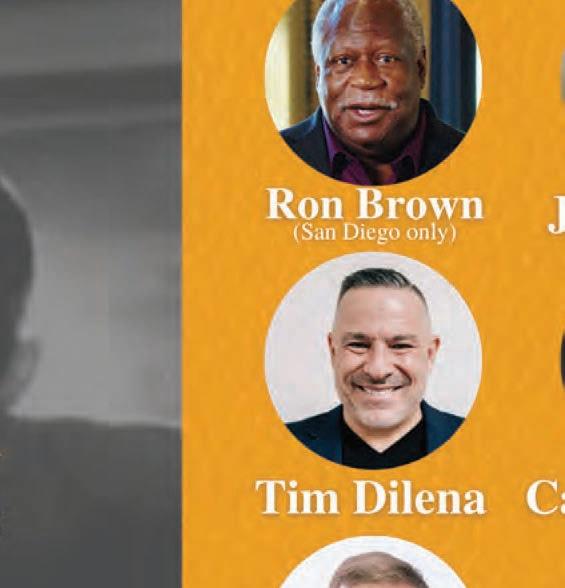





What We Believe About ...

THE TRINITY
A SERIES ON THE AG Statement of Fundamental Truths
72 Winter 2023
ARTICLE 2

The One True God
The one true God has revealed Himself as the eternally selfexistent “I Am,” the Creator of heaven and earth and the Redeemer of mankind. He has further revealed Himself as embodying the principles of relationship and association as Father, Son, and Holy Spirit (Deuteronomy 6:4; Isaiah 43:10,11; Matthew 28:19; Luke 3:22).
By ALLEN TENNISON
The Old Testament proclaims the oneness of God as the foundation for Israel’s witness and worship as God’s people. The New Testament proclaims the good news of Jesus as the incarnation of God, and also the Son of God.
The proclamation of the New Testament depends on the message of the Old Testament. Yet there is potential tension between this declaration of monotheism and the revelation of Jesus as God with His Father (and the Holy Spirit). The Early Church worked to resolve this tension by developing a grammar for talking about God, which we recognize today as the doctrine of the Trinity.
Winter 2023 73
Early Church
The Church has always insisted on the Jewish declaration of faith that “the LORD our God, the LORD is one” (Deuteronomy 6:4). The oneness of God served as the foundation of the Christian faith and, in an idolatrous culture of many gods, was the first thing the apostles proclaimed (Acts 17:23–29).
We can love God with everything we have (Deuteronomy 6:5) because God has no equals demanding our attention. The oneness of God frames our worship, witness and ethics as undivided obedience.
At the same time, the New Testament Church worshipped Jesus as od incarnate. The first hristians addressed Jesus as Lord, or kurios (John 20:28; Acts 2:36; Romans 10:9; Colossians 3:17; Revelation 22:20). In the Old Testament, this title was Adonai, a replacement word for Yahweh, the personal name of God (Genesis 2:4; Exodus 3:15; Psalm 23:1).
The Bible writers attributed the works of God to Jesus, including creation (John 1:1–4; Colossians 1:15) and judgment (Matthew 25:31–36; John 5:22–30; Acts 10:42; 17:31; 2 Timothy 4:1; Revelation 19:11). They used the messianic title “Son of God” as if a Son/Father relationship existed before the Incarnation (John 3:16–18; 10:36; 20:31; Romans 8:29; Colossians 1:15; Hebrews 1:3–8). John called Jesus the Logos, or Word of God from before creation (John 1:1–14).
New Testament believers talked of Jesus as God, but did that make Jesus a second God after the Father?
The Holy Spirit also existed with God the Father
before creation (Genesis 1:2). The apostle Paul attributed the giving of life to the Holy Spirit (Romans 8:10–11). Jesus spoke of the Holy Spirit in personal terms, as a paraclete or “advocate” for the disciples (John 14:16–17). Paul used personal verbs to explain the Spirit’s activity, describing the Holy Spirit as interceding (Romans 8:26–27), giving (1 Corinthians 12:11), and being grieved (Ephesians 4:30).
If the Holy Spirit is a distinct personality who shares in the traits of God along with Jesus, did that mean the Spirit represented a third God after Jesus and the Father?
Beginning with the second generation of believers, Christians struggled to understand and explain the biblical revelation of God amid a pagan culture. How could there not be three gods if the Father, Jesus, and the Holy Spirit are each God? If there is only one God, did Jesus pray to himself, and did He send himself to the Church on the Day of Pentecost? Could it be that Jesus and the Spirit were not God in the same way as the Father, so that only the Father is the one true God?
Answering “yes” to these questions led, respectively, to the early Christian heresies of tritheism (belief in three Gods), modalism (belief that God is the Father, Son, and Spirit at different times), and Arianism (belief that Jesus and the Holy Spirit are not truly God in the same way as the Father).
Heresies served a purpose by showing how not to understand and explain a doctrine. Early Church leaders worked hard to develop a grammar for

74 Winter 2023
proclaiming the full biblical revelation of God that avoided those heresies, while acknowledging that the mystery of God’s nature goes beyond human understanding.
By the fourth century, church leaders worked out a way of speaking that would preserve the biblical witness without falling into heresy. They described God as one eing in three ersons, unified as to divine nature but distinct as the Persons of the Trinity.
Pentecostals took the harmony of the Bible seriously, prompting discussions about whether certain passages agreed. One area of concern was the different baptismal formulas in atthew 8:1 ( in the name of the Father and of the Son and of the Holy Spirit”) and Acts 2:38 (“in the name of Jesus Christ”). What was the biblical formula for water baptism?
A novel solution, reportedly based on a personal revelation, was offered in 1 1 . The baptismal formulas could be harmonized if “Jesus” were the name of the Father, Son, and Holy Spirit.
To discuss the Being of God meant something different than to talk about the ersons of od. y keeping terms distinct and spelling out what could and could not be said based on biblical revelation, the Early Church created a grammar for understanding God that guided the worship, witness and discipleship of the community.
Assemblies of God
Early in the 20th century, Pentecostals divided over their understanding of the Trinity.
The implications of this revelation went beyond the practice of water baptism. For some, Acts 2:38 superseded Matthew 28:19 in Church practice, which led them to advocate baptizing or rebaptizing believers in the name of Jesus only. They reasoned Peter must have realized the Holy Spirit was Jesus on the Day of Pentecost.
These Pentecostals suggested baptism in the Spirit, with the evidence of speaking in tongues, was a spiritual baptism in Jesus. Some began teaching that speaking in tongues was the evidence for full conversion to Christ.
This teaching created controversy throughout Pentecostalism, but especially in the newly founded Assemblies of God (AG). Pastors raised questions about whether they should rebaptize members, whether someone could be a Christian without

Winter 2023 75
The Early Church created a grammar for understanding God that guided the worship, witness and discipleship of the community.
speaking in tongues, and how the Church could have been mistaken on the Trinity for most of its history.
What was called the “new issue” developed almost overnight, evolving from a question over the acceptable formula for water baptism to become a controversy concerning the reception of salvation and the nature of the triune God.

harkened back to the first four centuries of the Church.
Approximately 25% of ministers withdrew from the Fellowship over their refusal to sign this statement, reducing the number of AG credential holders from 585 to 429 in one year. Nevertheless, belief in the Trinity as a fundamental truth ensured the AG would belong to historic Christianity.
The doctrine of the Trinity preserves biblical revelation, reflects the nature of the gospel, and provides direction and boundaries for our worship, witness, and discipleship. The AG holds to 16 fundamental truths, but none is more foundational than belief in the Trinity.
One True God
In 1920, the Fundamental Truths were rearranged. The statement on the Trinity moved to No. 2, under the heading The ne True od. This truth affirms what we believe and teach concerning the nature and work of God.
In response, AG leaders during the 1916 General Council commissioned the writing of a “Statement of Fundamental Truths.” The largest of these fundamental truths was No. 13, “The Essentials as to the odhead. t affirmed the historic boundaries of Trinitarian orthodoxy, using language that
Concerning the nature of God, He is one, eternal and self-existent. There is no other besides Him (Deuteronomy 4:35). There is no beginning before God, no ending beyond Him, and nothing equal to Him. Furthermore, there is nothing upon which God depends for existence.
Concerning the work of God, He is the Creator, Redeemer, and Revealer of truth. God has revealed himself as the “I AM,” and as One who exists in relationship to himself eternally and in creation historically as Father, Son, and Holy Spirit.

76 Winter 2023
There is an orthodox limit on what humans can and cannot say about the Trinity because we can only speak of God based on His revelation, not our speculation.
One Triune God

It has been said that no one can talk intelligently about the Trinity for more than five minutes without committing an ancient Christian heresy.
There is an orthodox limit on what humans can and cannot say about the Trinity because we can only speak of God based on His revelation, not our speculation.
If we go beyond the teaching of Scripture, we speak arrogantly. If we violate the meaning of Scripture, we speak falsely. If we make the gospel impossible or significantly less likely, we speak heretically. (For example, treating Jesus as less than God changes the meaning of the Incarnation, which in turn calls into question the effectiveness of the Atonement.) If we do not speak of God for fear of violating a boundary, we have no witness to offer. So how should we speak of God?
The section on the godhead within the Statement of Fundament Truths contains 10 paragraphs, lettered (a) through (j), clarifying teaching on the Trinity in a way that lines up with the understanding of the Early Church. Paragraphs (a) through (d) deal with the nature of the godhead, while (e) through (j) address the nature of Jesus. Together, these teachings provide a sense of what the sought to affirm and defend in regard to the Trinity.
Father, Son, and Spirit
As paragraph (a) acknowledges, the word “trinity” is nowhere in Scripture, and the Bible writers never used the word “persons” to describe God.
The second-century Church developed this terminology to talk about the tri-unity of God. “Persons” delineated each member of the Trinity in His uniqueness, while “Being” described the nature of the one God.
The Trinitarian view of God as one Being in three Persons denies neither the deity nor the distinctiveness of the Father, Son, and Holy Spirit.
One mistake to avoid is the assumption that eing refers to some kind of divine stuff rather than God himself. Another is the error that “Persons” refers to separate individuals — as it does with humans — instead of distinction within the one God. This notion leads to the heresy of tritheism. aragraph (b) affirms the distinction, not separation, of the Persons of the Trinity. Their divinely revealed names are terms of relationship. However, those distinctions can go no further than the Bible allows. “I don’t know” is a biblical response for times when we don’t have a clear answer from Scripture (2 Corinthians 12:2–3).
As paragraph (c) explains, “the Father is the Begetter; the Son is the Begotten; and the Holy Spirit is the One proceeding from the Father and the Son.” What makes the Father, Son, and Holy Spirit distinct is how they relate to one another.
The New Testament provides the revelation of God as Father, Son, and Holy Spirit, but those relationships exist in eternity and not just in the biblical narrative. If we assume God’s actions in history created those relationships of Son and Spirit, we fall into the heresy of Arianism.

Winter 2023 77
If the Son and Spirit are not eternal, they are not God and their actions for salvation will not have the same effect. The Father is the Father to the Son eternally, the Son is the Begotten of the Father eternally, and the Spirit is the Procession from them both eternally.
Paragraph (d) further emphasizes the distinction and unity of the Father, Son, and Holy Spirit. They are not the same in person. Recognizing their relationships with one another helps preserve the distinctiveness of each Person. If we strip away those relational distinctions, we commit the heresy of modalism.
during the act of creation (Genesis 1:2; John 1:3; Colossians 1:16–17). The Father sent the Son for our salvation (John 3:16), while the Father and Son sent the Spirit to guide us to the truth of the gospel and empower us for mission (John 16:13; Acts 1:8).
The Son is the revelation of God the Father (John 14:9). The Holy Spirit is the agent of revelation in the conception of Jesus, the inspiration of Scripture, and the giving of prophecy (Luke 1:35; 2 Peter 1:21).
The Lord Jesus
There is something unique in the work of the Persons of the godhead. Only the Son became incarnate, which is why the title “Lord Jesus Christ” belongs exclusively to Him.
Paragraphs (e) through (j) explain Christ’s incarnation which, along with Fundamental Truth No. 3, provide our statement on the deity of Jesus (a topic for another article).

At the same time, there is no opposition between the Father, Son, and Holy Spirit. They understand, speak, and act in perfect harmony. They are united in their relationship and fellowship.
The Trinity works cooperatively in all the work of God, including creation, redemption and revelation. The Son and the Spirit were with the Father

Suffice it to say that we do not need Jesus to be the entire Trinity to honor Him as God, nor do we need to reduce the Trinity to Jesus to be monotheistic. Jesus is not the Father or the Holy Spirit, but Jesus is the one true God, as is the Father and the Holy Spirit.
Why It Matters
Our witness, discipleship and worship are deeply connected to our understanding and proclamation of the triune God. Following are three reasons to emphasize this teaching.
78 Winter 2023
The Trinity works cooperatively in all the work of God, including creation, redemption and revelation.










Visit us at www.njfag.com A/G Account Number 937001 Reaching The Jewish People Proclaiming Jesus in a distinctly Jewish Way Since 1971: - Evangelism - Pulpit Teachings - Jesus in the Passover Seder Learn at the National Jewish Fellowship online Yeshiva (school) Explore how to effectively reach Jewish people with the Gospel. Stand with the Jewish people by standing with the National Jewish Fellowship. Get in touch! 800-722-ROCK www.rockofisrael.org A/G Account Number 164039
1. For the sake of the gospel. Considering the difficult questions the topic raises, it can be tempting to avoid teaching on the Trinity. However, it is healthy for ministers to admit they know only what Scripture reveals. Showing humility concerning the things of od edifies the entire congregation.


relationship. In other words, God is love (1 John 4:8). The gospel reveals the love of a triune God for the world through the sacrifice of Jesus (John :1 1 John 4:10) and the love of God before the creation of the world through the revelation of the Trinity (John 15:9–13).
e are called to reflect the love of od in our relationships. Jesus told His disciples He loved them as the Father loved Him. He then called on the disciples to love one another in the same way.
The gospel depends on all three members of the Trinity for meaning. The story of Jesus includes His conception and birth, baptism and ministry, death and resurrection, ascension and return. The Spirit plays a role in each of these events.
Without the Father, we could not make sense of Christ’s coming, calling, ascension or returning. The Father sent Jesus to reconcile the world to himself (2 Corinthians 5:19).
As ministers of the gospel, we cannot avoid the doctrine of the Trinity. To understand the revelation of God as Father, Son, and Holy Spirit is to know the depths of God’s love for a world in need. And to fully understand this love of God is to experience transformation (Ephesians 3:14–19).
2. For the love of believers. If God exists eternally as Father, Son, and Holy Spirit in perfect unity, then He also exists throughout eternity in loving
aying down one s life e emplifies the love Jesus had for His disciples, and the love His disciples must have for one another. Such love overcomes and outlasts all things. If we can share in God’s eternal love, we can share in God’s eternal life. This is the promise of the gospel.
Our churches should be communities of the triune God, with each member working cooperatively as God works in unity (1 Corinthians 12:4–6). People in any community will disagree, but disagreement is not the same as strife.
Believers must understand that discord, gossip, slander, and other forms of selfish behavior ( orinthians 12:20) testify against us as communities God has called to proclaim His love. A community that does not reflect love cannot be a witness to the God who loves throughout all eternity.
astors must reflect the love of od through leadership that is not overbearing, manipulative, or self-centered.
Some pastors lead out of their insecurity, trying to exert a level of control that does not allow other
80 Winter 2023
The gospel depends on all three members of the Trinity for meaning.


team members to grow in their giftings. Some pastors lead using the wrong models, trying to guide congregants through manipulative tactics learned from secular environments where God’s love was not a concern.
Still others lead out of arrogance. They build community around their charisma and create implicit hierarchies, giving some people insider status and excluding others.
Pastoral leadership should communicate the love of God through service and the sharing of spiritual gifts.
The two greatest commandments are to love God with our whole being and to love our neighbor as if they were us (Luke 10:27). The love of God is at the heart of our worship, and love for neighbors is the focus of our ethics. In the doctrine of the Trinity, worship and ethics come together as we represent the loving God we revere.
Belief in the Trinity leads us to a deeper understanding of love as those who proclaim the gospel, serve our community, and worship God.
3. For the glory of God. Belief in the triune God shapes our worship because God is the subject, object, focus, center, and substance of it. When we worship together, we worship God together.

It is right and proper to honor the Father, Son, and Holy Spirit in our worship and prayers with the glory that belongs to God alone, and in acknowledgement of God’s gracious giving of himself to us.
Much of Pentecostal worship in the past has been
directed at Jesus to the exclusion of the Father. Much of the emphasis of the Church’s worship historically has been focused on the Father and the Son to the exclusion of the Holy Spirit. The doctrine of the Trinity can help us keep our worship of God in line with our conviction about God.

One of the more confusing parts of Fundamental Truth No. 2 is the phrase “The Adorable Godhead.”
An example of how language changes over time, today the word “adorable” most often applies to children, puppies, dolls or those to whom we would condescend. It makes little sense in a statement about God. When this was written, however, “adorable” was perfectly appropriate as a term to describe the highest worship. The One who is adorable is the One whom we adore.
The doctrine of the Trinity teaches us to adore God as the Father who sent His only Son and Holy Spirit, as the Son who reconciles us to the Father, and as the oly Spirit who glorifies the Son.
When we understand, even in a small measure, the meaning of the Trinity as God in the gospel, we can only marvel, praise, and adore God both for who He is and what He has done. To God be the glory!
ALLEN TENNISON, Ph.D., is a professor of theology and dean of the College of Church Leadership at North Central University in Minneapolis. He is chair of the AG Commission on Doctrines and Practices.

82 Winter 2023
Vs
Don’t just rely on volunteers and staff to point people in the right direction. Clear and effective wayfinding/graphics help guests navigate the campus.


Keep It Simple
If your church’s design feels complex, it can create stress for guests by feeling cluttered and disorganized. A simple design is more welcoming and inviting.
3. Make Room To Connect
When you create space for people to interact, community can happen. This turns the weekend service from being transactional to relational.
Whether you’re transforming a worn-out site, or building from the ground up, Visioneering Studios can produce mind-blowing creative solutions to help reach your community. Visioneering’s award-winning designers and contractors have helped thousands of churches align their mission and space–launching their vision into reality.
Santa
|
| Nashville W visioneeringstudios.com P (888)
E hello@visioneeringstudios.com If You Build It, Guests Will Come. THREE TIPS FOR CREATING ENVIRONMENTS FOR LIFE-CHANGE
Ana
Dallas
539-1957
1.
| Thousand Hills Church - Corinth, TX
CONNECT WITH US
2. Show
Tell
Here To Help... After
Before | AMC Theater - Corinth, TX
Praying for Awakening in 2023
A conversation with Rick DuBose

Prayer is a hallmark of Pentecostal spirituality. As assistant general superintendent of the Assemblies of God, Rick DuBose provides leadership and direction to General Council-sponsored prayer initiatives. In this Q&A, DuBose talks about the value of prayer and the nature of the initiatives he leads.
Why is prayer an important part of Pentecostal spirituality?

Prayer is the portal through which we reach into heaven. It is God’s method for us to contact Him, to ask for help, and to gain His provision. Prayer is the way we go from the natural into the supernatural.
Do you think AG churches and ministers are devoting enough time and attention to prayer, both corporately and individually?
We can always do better, of course, but I’m excited for where we’re heading!
few years ago, we tended to fill our schedules with stuff other than the spiritual. I’ve seen a shift more recently. Now we’re making prayer a priority. I’m seeing a hunger for something beyond what we’re humanly able to bring to the table.
MINISTRY | Q&A
84 Winter 2023
21st
SPEAKERS


Register here: ChristAliveChurch.com/SchoolofTheSpirit

As a guest speaker at churches, I’ve been surprised at how many times during the service I’ve seen worship leaders sense a shift in the spiritual atmosphere and go with it. They’re asking, “What is God doing at this moment?”
They’re responding to the shift with increased time at the altar. They are seeing the gifts of the Spirit manifest. It’s a little old-school in some ways, but it’s new to this generation.

The theme of the 2023 Assemblies of God Week of Prayer (Jan. 1–7) was “Awakening.” What kind of awakening should we pray for?

In U.S. history, we had the Great Awakening in the mid-18th century and the Second Great Awakening in the early 19th century. I want the early 21st century to experience the Greatest Awakening! To see that happen, we need to focus on four things:
First, the Church’s prayer force. Paul says, “Our struggle is not against flesh and blood, but against … the spiritual forces of evil in the heavenly realms” ( phesians :1 ). e can make more of a difference through the power of prayer than through anything else we do.
Second, Bible-based discipleship. The goal of discipleship, Jesus told us, is “teaching [the nations] to
obey everything I have commanded you” (Matthew 28:20). Discipleship is Christlikeness.
Third, the value of children. The next generation is the key to us fulfilling the reat ommission. Jesus said, “Let the little children come to me, and do not hinder them, for the kingdom of heaven belongs to such as these” (Matthew 19:14).
There’s a moment in children’s lives when they suddenly have the ability to receive Jesus as Savior. Churches need to make the most of that moment. And they need to provide adults with the same opportunity to exercise childlike faith.
Finally, Holy Spirit manifestations. We see the Spirit’s gifts in operation throughout Scripture. When the Holy Spirit is allowed to operate in a local church, that church e plodes in effectiveness.
So, I want to see an awakening characterized by a focus on prayer, discipleship, children, and the gifts of the Holy Spirit. If we do those things, we’ll see more revival than we know what to do with.
The World Prayer Center opened in November 2022. What is its purpose? And what other initiatives are associated with it?
A couple years ago, I read Mark 9:14–29. Jesus, Peter, James, and John are coming down from the ount of Transfiguration. n the valley, the nine
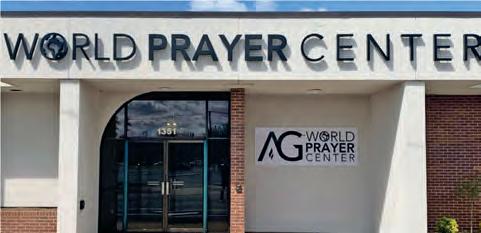
Winter 2023 85
uesday June
“Prayer is the way we go from the natural into the supernatural.”
— Rick DuBose
Join us and expect to encounter the Holy Spirit and be equipped to walk with Him, operate in the gifts and develop a spirit-led life.
other disciples are trying to cast out a demon unsuccessfully. So Jesus does it for them.
In verse 28, the disciples ask why they were unsuccessful. “This kind can come out only by prayer,” Jesus replies in verse 29. Notice, there are not four or three or even two options for success in this case. Prayer is the only option.
s reflected on that story, felt the oly Spirit say to me, “The kind of demons America is dealing with are not going to come out with the kind of prayer the Church is praying today. You’ve got to take prayer to the next level. You need to establish a place of prayer where those next-level prayers can be prayed.”
And so was born the World Prayer Center (PrayerCenter.ag.org). It is designed to lead, train, and inspire a prayer movement in the Assemblies of God that will shift the spiritual atmosphere in America and throughout the world.
We invite people from all across the United States to visit and pray. We have an LED screen on the floor tied to oogle aps. ou can bring up any location on Earth and pray for it. And we’ll sponsor prayer training in that place. We also want to raise up fully supported prayer missionaries.
Our ultimate goal is to connect prayer warriors and prayer centers in districts all over America. We want to coordinate our efforts so that we re praying in agreement for the same outcomes.
We believe we can change America through prayer like nothing else we do. And not just America. We’re going to change the world through prayer.
Another initiative is School of the Spirit. Tell us about that.
School of the Spirit is a one-day event for ministers and church leaders led by evangelist Joe Oden, Dr. Carolyn Tennant, and me. It’s part revival, part seminar. Its focus is on manifestations of the Holy Spirit.
The day starts with Joe Oden sharing his testimony. God saved and called him into ministry during the 1990s revival at Brownsville Assembly of God in Pensacola, Florida. Joe was a drug addict
and had been jailed a number of times, but God delivered him, and his testimony is powerful.
Then I teach about the gifts of the Holy Spirit, focusing on how they work in a congregational meeting, so we can flow with the oly Spirit. f we do church the way God designed it, then it’s easy for Him to come alongside us as we worship.
Finally, r. Tennant talks about the fivefold ministry of Ephesians 4, especially the gift of prophecy. Her presentation on the latter is one of the best, most theologically sound sessions on that gift you’ll ever hear.
School of the Spirit is not just teaching, though. Each session includes time for participants to experience the gifts of the Spirit. People who have never really experienced the Spirit encounter Him dynamically during these sessions.
If you’d like to know about upcoming School of the Spirit events, which are usually hosted by districts, contact Joe Oden at joden@ag.org.
Donald G. Bloesch wrote The Struggle of Prayer. Many ministers have struggled in prayer since the pandemic rocked our world. What encouragement would you give them to pray through?
Do you remember the story in Daniel 10? Daniel prayed for 1 days, seemingly without effect. Then, an angel shows up and tells Daniel that his prayers were heard from Day One on, but spiritual warfare in the heavenlies delayed God’s response.
What would have happened if Daniel stopped praying on Day 17? Would the angels have stopped their warfare?
We don’t know, but I would encourage you with this lesson: Prayer is working, whether you see it working or not. So, go into your prayer closet and get alone with God. He promises that if you pray in private, He will bless you in public. But you have to continue to do your part.
This Q&A is based on Episode 302 of the nfluence Podcast, “How to Pray and Why in 2023.” It has been edited for concision and clarity.
86
Winter 2023

SERMON: A Tale of Two Kings
The climax of Peter’s sermon on the Day of Pentecost was a bold confession: “Therefore let all Israel be assured of this,” he proclaimed, “God has made this Jesus, whom you crucified, both Lord and Messiah” (Acts 2:36). ing. Peter’s confession stood in marked contrast to that of the chief priests: “We have no king but Caesar ” (John 19:15). These two confessions expressed alternative gospels. The first centered on Jesus, who fulfilled G od’s promises to Israel by taking humanity upon himself and becoming their King. The second centered on a human being who came out on top
LIVESTREAM
Preaching Through the Multiverse
Effective sermons for a digital world
By JAY NEWLAND
The existence of a multiverse — multiple, parallel universes — is a topic of debate in some scientific circles. ut for preachers today, it feels like a reality.
Sermons increasingly travel through space and time via digital platforms — reaching far beyond the walls of our churches. As a result, preachers must develop messages that work in multiple worlds, including unknown and unobservable ones.
This idea is not entirely new. Jesus envisioned the gospel traveling through the known worlds of Jerusalem, Judea and Samaria to the unknown “ends of the earth” (Acts 1:8). The Lord wants His Spirit-empowered Church to take the good news to all people, in all places.
Technology is accelerating this vision, with in-person and online messages often delivered simultaneously. Unlike in-person experiences, though, digital messages can continue online through various platforms.
For sermons to stand the test of time, preachers must carefully prepare messages that work here and there, now and later.
The digital age is a brave new world, but it’s not without challenges. One message can travel digitally to multiple places over time, while the speaker visits only one of them.
Although ministers tend to focus on the known congregation when crafting sermons, the days of delivering messages and then burying them in a
88 Winter 2023 TRANSCRIPT
| PREACHING
MINISTRY
filing cabinet are largely over. To ma imi e a sermon s influence, it is worth considering who else might hear it.
It is impossible to imagine all the places one sermon can go. owever, there are three identifiable worlds that establish a beginning framework: the immediate world, the mobile world, and the unknown world. Preachers must understand the dynamics of these worlds to help messages travel more effectively.
The immediate world describes the time, context and location of the sermon delivery. In this world, cultural elements, current events, and shared values help contextualize the message. The familiarity with this world gives preachers a certain degree of comfort. However, that comfort can become an obstacle hindering the transferability of a message over time and distance.
When a message moves to a digital platform, it enters the mobile world. It shifts from a static time and place to dynamic times and places. People may access it through a church website, social media page, or YouTube channel.
Additionally, social media users may encounter an isolated quote from a sermon or hear a short clip while scrolling through their feeds. The dynamic reality of this mobile world is exciting for its possibilities and also challenging because of its complexities.
That brings us to the unknown world — the unlimited spaces and times in which people may hear or view a sermon. n effect, this is the ends of the earth.
A sermon can travel across digital highways to
reach a factory breakroom, a semitractor-trailer cab, or a college dorm room. Preachers have limited knowledge of these places and the specific needs of the individuals who inhabit them.
Unlike the immediate world where ministers can interact with attendees, the population of the unknown world is a mystery to the preacher (but very much known to God).
Preparing a sermon that travels well through immediate, mobile and unknown worlds requires intentionality. Among other things, it means rethinking how you share personal information, choose illustrations, and talk about dated issues.
Inclusive
People today long for authenticity. But authenticity does not necessarily equal familiarity. Assuming listeners know all about you can limit the reach of your message.
If you hope to connect with unknown worlds, you must assume there are listeners who know nothing about you. Even better, assume they don’t know Jesus and have little or no knowledge of church or the Bible.
Aiming your message at people with the least knowledge and understanding will also make it more accessible for visitors in your immediate context. This is inclusivity at its best.
Consider Paul’s example in his New Testament letters. Though he was both famous and infamous within the Early Church, Paul started most of his letters with a simple introduction about his calling as an apostle and his identity as a slave to Christ.
Winter 2023 89
A sermon can travel across digital highways to reach a factory breakroom, a semitractor-trailer cab, or a college dorm room.
Preachers have limited knowledge of these places and the specific needs of the individuals who inhabit them.
Paul refused to assume all his readers would know about his calling and ministry. Perhaps he knew his letters would travel to unknown worlds.
Today’s ministers should replicate Paul’s method, revisiting their stories and callings as if people are hearing this information for the first time.
Transferable
Jesus contextualized His message for the immediate setting through parables. Two millennia later, His stories are still relatable because they touch on universal themes.
For example, you don’t have to be a shepherd to understand the love and faithfulness evident in the Parable of the Lost Sheep.
Think beyond the head-nodding crowd that sits in front of you — bringing others along on the journey as well.
Timeless
Every sermon has temporal elements. But even the immediate presentation includes frequent visits to the past.
Ministers unpack the original, historical contexts of biblical passages to present truths for today and hope for tomorrow. They also use various moments from history for sermon illustrations.
Essentially, preachers are like time travelers, taking listeners through the past, present, near future, and eternal future. To avoid losing listeners during this journey, there are a couple of things to keep in view.

Today’s preachers should likewise make their messages transferable across multiple contexts. Stories, pictures and metaphors must have enough elasticity for all kinds of people to understand them.
Follow the most-everybody rule. For each illustration, ask, “Will most everybody understand this?” If not, help them understand.
During a recent sermon, I talked about driving in Pittsburgh. (Our church is located within the metropolitan area.) The local congregation smiled in agreement when I said, “The roads here are challenging.”
I then shared two pictures that prompted laughter among congregants and onboarded the mobile and unknown worlds. Without this step, my remarks might have been confusing for people who were unfamiliar with our city.
First, avoid sharing information that is only relevant for a limited time. These time stamps will only confuse future listeners, who may not remember the TikTok craze or television commercial on which your point hinged.
Also focus on transcendent needs rather than immediate issues. A sermon addressing COVID vaccines won’t age well. But a message highlighting the need for wisdom in a complex age will transcend the immediate context.
The digital age offers a wealth of opportunities for preaching the good news. With care and preparation, your messages can go further and reach more people than you ever thought possible.
90 Winter 2023
JAY NEWLAND is Oakmont Campus pastor of Riverside Community Church (AG) in Pennsylvania.
Today’s preachers should make their messages transferable across multiple contexts. Stories, pictures and metaphors must have enough elasticity for all kinds of people to understand them.










Making Space for God
How to lead spiritual gifts in public worship
By CAROLYN TENNANT
As a visitor at a Pentecostal church, I did not expect God to give me a prophetic word for that congregation.
Toward the end of the altar time, however, I strongly sensed the Spirit directing me to go up and quietly tell the pastor I had a message from the Lord. The pastor called for the congregation’s attention and handed me the microphone.
The message challenged the people to seek and obey God and come together in unity. It ended with the hopeful assurance that when they did these things, od would fill them with oy.
Appearing unsure of what to do next, the pastor hesitated for a moment before abruptly starting his sermon. I privately wept in my seat, wondering why the message seemed to drop without fruition.
After the service, the pastor approached me, along with the church s staff members and deacons. The pastor confessed he had intended to resign that morning. But after hearing the prophetic word, he felt encouraged that God was at work. He then pulled out his resignation letter and tore it up.
This story reminds me we need the gifts of the Spirit in our worship services — and in our lives. But making space for God to speak while maintaining order requires careful, intentional leadership. Following are eight best practices to keep in view.

92 Winter 2023 MINISTRY | WORSHIP
1. Welcome the Gifts
Scripture tells us to eagerly desire the gifts of the Spirit, especially prophecy (1 Corinthians 14:1).
When the Lord wants to speak to the congregation through a prophecy or message in tongues with interpretation, we ought not spurn His words (1 Thessalonians 5:19–21).
The pastor was open to the Spirit moving in the service. He was also hungry to hear from the Lord personally. God worked through the pastor’s willingness to listen and respond.
The Lord uses prophecy to guide and direct, exhort, correct, warn, foretell, shift, change, enlighten, encourage, build up, assure, motivate, console, cleanse, confirm, and provide vision and courage. How we need all of this!
2. Use Wisdom
Wisdom must accompany openness (1 Corinthians 14:39–40).
It is fair to wonder about this pastor’s readiness to give me, a virtual stranger, free rein to deliver a prophecy. Without even asking what the message was about, he handed me the microphone.
grip on the microphone. This makes it easier to stop a speaker if needed.
3. Create a Plan
Think through in advance what to do when the verbal gifts of the Spirit are in operation.
Noting that the gifts of the Spirit are scriptural (Romans 12:4–8; 1 Corinthians 12:1–11; Ephesians 4:11–13) and explaining their purposes helps those who do not have a Pentecostal background feel more comfortable.
Additionally, it is important to acknowledge the content of each message in some way. What practical action can people take regarding this word from the Lord? Perhaps God wants you to change the flow of the service or the sermon s emphasis.
If it is a particularly strong or resonant message, you might suggest it deserves deliberation, prayer, and further consideration in future gatherings. ny of these would have been a fitting reaction for the pastor in my story.
4. Exercise Discernment
All believers must be discerning when someone is delivering a message. The leader needs to hear the Spirit’s guidance to stop the worship music or any other aspect of a service and allow God to speak or act.
Likewise, those delivering a prophecy, speaking in tongues, or interpreting should remain sensitive to God’s timing and direction. They should honor the leadership in their choices, attitude, and tone, and their words must be in line with Scripture.
This is normally a bad idea. It should send up a cautionary flag when an unknown person from outside the congregation wants the platform. The best approach is for prophecy and tongues with interpretation to come from within the local body, from trusted members who have permission to minister freely in a service.
Perhaps my going to this pastor personally helped him feel safe. Or maybe the Spirit spoke to him. Still, the pastor probably should have kept a
Finally, those listening to God’s message should seek to hear and absorb what the Spirit is saying (Matthew 11:15). We all need to hear from God for ourselves and sense what He wants to do among us.
e ecti n
Take action when someone needs correcting (Matthew 24:24; 1 Thessalonians 5:21; 1 John 4:1).
One night as I was leading a service, I stopped a newcomer who tried to give a word. I simply said I did not sense this word was from the Lord and
Winter 2023 93
(1 Corinthians 14:1).
Scripture tells us to eagerly desire the gifts of the Spirit, especially prophecy
offered to talk with the individual about it later during the week in my office.
The person stomped out of the sanctuary with a show of haughtiness and never returned — a response that assured me I had discerned correctly.
We can identify false prophets and false teachers from their bad fruit (Matthew 7:16). We owe it to our congregants to protect them from those who might create confusion or cause trouble (Matthew 7:15).
Have discerning ushers nearby who are ready to escort someone out of a service if necessary. Use your leadership authority, trusting the Lord to provide wisdom for each situation.
6. Provide Teaching
Teach the entire church about the gifts of the Spirit (1 Corinthians 12:4–31).
Congregants sometimes wonder why God uses the same people to prophesy, speak in tongues, or interpret nearly every Sunday. Understanding what the Bible teaches on the subject may stir them to seek God for these gifts as well.
Every believer should be willing to respond to the Spirit as He leads. No member should be the only one who ever prophesies.
Encourage other Spirit-led expressions as well, including singing in the Spirit (1 Corinthians 14:15).
We can always go deeper and teach more on the nuances of operating in the spiritual gifts so more people will feel comfortable participating.
7. Facilitate Ministry
ifts of the Spirit are for the benefit of the entire congregation — “for the common good” (1 Corinthians 12:7).
The Spirit moves on different members of the body of Christ so they can be a conduit for ministry. For example, the person who receives healing is
the one who benefits from the gift of healing. The person who prayed simply passed on that gift.
In the same way, prophecy is not just for the one who prophecies, but for the whole body of believers. Therefore, we should not hesitate to step out in faith, or pause a service so the gifts can flow.
8. Encourage Seekers
Regularly provide opportunity and encouragement for those who have not yet received the baptism in the Holy Spirit (Acts 1:8; 4:31; 11:16).
Additionally, keep encouraging Spirit filled believers to seek a fresh outpouring.
Prophecy, tongues and interpretation, and other spiritual gifts emanate from people who remain saturated in God’s presence.
Don’t be afraid to allow moments of silence during your worship services as you wait on the Lord to move. Believers must learn to recognize God’s voice and respond.
As you seek God together, He will baptize people in the Spirit, refill, convict, teach, empower, act, and speak.
When we are open and poised to hear from God, yield to His plan, and respond to His Spirit, He will move more powerfully in our worship services to change lives and point people to Jesus.
CAROLYN TENNANT, Ph.D., is professor emerita at North Central University in Minneapolis, adjunct professor at the Assemblies of God Theological Seminary in Springfield, Missouri, and author of Catch the Wind of the Spirit: How the 5 Min istry Gifts Can Transform Your Church.

94
Winter 2023
Don’t be afraid to allow moments of silence during your worship services as you wait on the Lord to move.
The Life of Jesus







FOUNDATIONS



12-part video series and study guide Filmed in Israel



Examine the teachings of Jesus in their cultural, historical, geographical, and spiritual context. The life and teachings of Jesus will come alive in your heart and challenge you to apply His words in your daily life.



Visit thechls.org/LifeofJesus today for more information.
Visit thechls.org/LifeofJesus today for more information.


Abused and Neglected Kids
What to look for — and how to respond
By JULIE PRATT
Robbie had a reputation for being … difficult.
From one Sunday to the next, the kindergartner’s mood vacillated between angry and sullen. obbie resisted every effort leaders made to build a relationship with him.
One Sunday, Robbie acted out repeatedly, wrestling toys from other children and aggressively throwing objects. His Sunday School teacher asked him firmly but kindly to stop, but obbie refused. When the teacher knelt down to talk with him at eye level, Robbie punched her in the face.
Deciding it was time to talk with a parent, the teacher paged Robbie’s father and waited at the classroom door. When Robbie saw his father coming, he immediately burst into tears and cowered in a corner with his arms over his head.
After the teacher explained why she paged him, Robbie’s father violently grabbed his child by the arm and dragged him down the hall.
Concerned for Robbie’s safety, the teacher left her two helpers in charge of the classroom and followed Robbie and his father all the way out of the building and into the parking lot.
The teacher was horrified to see obbie s dad open the rear door of their car, throw Robbie in the back seat, and punch the boy repeatedly.
The teacher raced back into the church to find a security team member. By the time they got back outside, the car was gone. So, church leaders contacted the appropriate government authorities and filed a report.

Would you know what to do in a situation like this? Although this is a hypothetical story, such scenarios are more common than you may realize. In fact, I experienced a similar incident during my time as a children’s pastor.
According to the Centers for Disease Control and Prevention, 1 in 7 children throughout the United States experience child abuse or neglect each year. In 2020, 1,750 American children died as a result of abuse or neglect.
When discipling kids and families, we have a responsibility to protect the children in our ministries.
Signs of Abuse
Knowing the signs can help you spot potential cases of abuse and neglect. The U.S. Child Welfare Information Gateway lists a number of indicators. Based on that information, here are some questions to consider:
• Does a child always seem to be watching for something bad to happen?
• Is the child passive, withdrawn, or overly compliant?
• Have there been sudden changes in the child’s behavior?
• Does the child seem afraid to go home?
• Is the parent’s attitude toward the child frequently angry, harsh, or negative?
• Is the parent dismissive of the child’s problems or inclined to blame most problems on the child?
• Does the parent respond with harsh physical discipline when the child misbehaves?
• When the child and parent are together, do they avoid touching or looking at each other?
MINISTRY | KIDS 96 Winter 2023
Types of Abuse
Abuse may be physical, sexual, or emotional, or a child may suffer from neglect.
A child who is experiencing physical abuse may have unexplained injuries, seek to avoid going home, or seem frightened of other children’s parents.

Meanwhile, a sexually abused child may have difficulty walking or sitting, e perience sudden appetite changes, or demonstrate unusual sexual knowledge or behavior.
Emotional abuse can cause a variety of extreme behaviors in a child, from aggression to passivity. An emotionally abused child may seem overly mature or infantile or detached from his or her caregiver.
A child experiencing neglect may hide food to take home, wear inappropriate clothing for the weather, or consistently appear dirty and have a strong body odor.
These signs do not always indicate abuse or neglect, but if you see one or more of them in a child, it is wise to consider the possibility.
Intervention
Intervention starts with paying closer attention to the kids in your classrooms and ministry spaces.
As leaders, it is easy to become so busy with managing a group that we miss signs of distress in individual children. Educate yourself and your volunteers on these topics.
Reporting abuse or neglect is uncharted territory
Winter 2023 97
Intervention starts with paying closer attention to the kids in your classrooms and ministry spaces.
for many children’s workers. However, the potential consequences of looking the other way are far more serious than the personal discomfort of getting involved.
Speaking up is the right course of action, and The General Council’s own policy is to report all reasonable suspicions of child abuse. All states have mandatory reporting laws. And in most states, children’s workers are required by law to report suspected or known abuse.
Work with church leaders to create clear guidelines. Among other things, they should clarify where volunteers should go to report concerns and who is responsible for contacting authorities.

Regularly provide training for volunteers that includes guidance on recognizing signs of abuse and neglect. Teach and provide copies of your response plan to ensure workers know what to do if they see or suspect abuse or neglect.
Additionally, conduct background checks on every potential volunteer seeking to work with minors.
Caring for Kids
I hope you never encounter a case of abuse or neglect among the children in your ministry. But given the statistics and the prevalence of these problems across the country, there is a high likelihood you will.
For this reason, it is vital that you become familiar with the signs and symptoms of abuse and develop a plan for responding appropriately.
It is also imperative that you prioritize the creation of, and coordinate regular training on, ministry policies addressing these issues.
Jesus places a high value on children’s ministry. In Matthew 19:14, Jesus said, “Let the little
children come to me, and do not hinder them, for the kingdom of heaven belongs to such as these.”
And in Matthew 18:5, Jesus said, “Whoever welcomes one such child in my name welcomes me.”
As children’s leaders, the work we do is close to the heart of God. We must do everything possible to love, minister to, and protect the kids in our care.
If you suspect something, report it, and be the voice for a child who is suffering in silence.

98 Winter 2023
JULIE PRATT is director of discipleship for Assemblies of God Children’s Ministries in Springfield, Missouri.
It is vital that you become familiar with the signs and symptoms of abuse and develop a plan for responding appropriately.
SMALL GROUP RESOURCES For Youth and Adults



Build communities that study the Bible and apply it to life together.
Dive deep with discussion focused on what the Bible says.
Enrich the lesson with thought-provoking videos.


Get people into the Word with personal devotions. Download

at
sample lessons
BibleEngagementProject.com.
As a member of Generation X, I (Kara) got my first email account in college. y first home internet connection was so slow I could make breakfast in the time it took my modem to come online. Today, I can’t imagine my life without email. And waiting even 15 seconds for a Wi-Fi connection feels like an eternity.
I (Kristel) am a millennial, and the internet has always been a part of my everyday life. I used AOL Instant Messenger with friends in middle school. In high school, I took up blogging. During college, I discovered social media, using MySpace and Facebook for the first time.
Young people today are encountering social media much earlier than either of us did. By 13, many students have accounts on one or more social
Social Media Guidance Helping teens navigate digital spaces
By KARA POWELL and KRISTEL ACEVEDO
platforms, where they interact with other users, share details about their lives, and post personal videos and photos.
Access to such technology is not necessarily bad. Social media can help students interact with sports teammates off the field, keep in touch with grandparents and other family members who live many miles away, and even talk with peers about their faith.
Students may use social media to keep up with classmates during the summer break, stay connected with friends they met at youth camp, or read an announcement about an upcoming church event. They can find communities of people with similar interests, which may provide valuable opportunities to learn, grow and network.
100 Winter 2023 MINISTRY | YOUTH
However, because teenagers are still developing emotionally and mentally, they don’t always share and consume social media content wisely.
Scrolling through airbrushed photos and unrealistically perfect profiles can trigger self image problems, eating disorders, and depression.
Young people are particularly vulnerable to online sexual predators. In addition, bullying is rampant on social media.
A 2018 Pew Research Center report revealed that a majority of U.S. teens (59%) had experienced cyberbullying, a quarter had received unwanted explicit images via digital media, and 16% had been the objects of physical threats online. Twothirds of respondents said social media was not doing enough to combat such problems.
A lack of discretion on social media can lead to difficulties in the future as well. For e ample, companies and universities may check the social media accounts of applicants when making decisions about whom to hire or offer admission.
Finally, social media is a breeding ground for misinformation. Conspiracy theories and dangerous trends can lead students down the wrong path if they don’t have someone guiding them.
For all of these reasons, church leaders should take steps to help students learn appropriate boundaries. Navigating the digital world is hard enough for adults. t can be e tremely difficult for teenagers who are still forming their identities and sense of belonging.
outh leaders have a unique opportunity to influence students to make God-honoring choices wherever they go, including digital spaces. Following are three ways to guide young people in their social media use.
Talk About It
sk students how they feel after logging off social media. Are they happy, sad, jealous, or anxious? Do
they feel closer to God or more distant from Him after spending time on social media?
Listen respectfully to what students have to say. Then help them assess their feelings in light of biblical teaching. Ask them to consider what changes they might need to make for the sake of their mental health, spiritual growth, or Christian witness.
Remind students their emotions can indicate what is brewing beneath the surface. If social media is leaving them feeling depressed or anxious, it is a sure sign adjustments are in order.
Ask students what they are seeking online and what they hope to contribute to the social media world. Such discussions can lead to the development of strategies for navigating with greater intentionality, wisdom, and Kingdom purpose.
Start the discussion with this simple question: “What makes you want to show up on social media?”
Making room for students to process why they are on social media can be eye-opening for you and them. Some students may be looking for friendship online. Others may want to learn more about a particular topic. ou can offer suggestions for ways to find what they re looking for in a healthy manner — whether online or o ine.
Share your own reasons for using social media or other digital tools. Also talk about boundaries you set for yourself online, such as adjusting privacy settings, turning down connection requests from people you do not know, safeguarding personal data, limiting how much time you spend on social media, and disengaging from conflict. This may help students think about issues they had never considered.
Winter 2023 101
Youth leaders have a unique opportunity to influence students to make God-honoring choices wherever they go, including digital spaces.
Talk honestly about lessons you’ve learned. Members of Generation Z appreciate authenticity.
Establish Boundaries
Help students create a plan for their social media use that involves establishing healthy boundaries. This plan should address how they will interact and with whom.
Work on the plan together. If possible, include students’ parents or guardians in this discussion. Holistic discipleship involves the entire family. Respect boundaries parents or guardians may have already established.
Listen to your students’ perspectives, while also reminding them of the importance of honoring and obeying the loving adults God has placed in their lives. Remind them of the apostle Paul’s words in Ephesians 6:1–3: “Obey your parents in the Lord, for this is right. ‘Honor your father and mother’ — which is the first commandment with a promise — ‘so that it may go well with you and that you may enjoy long life on the earth.’”
Help students see that instead of interacting with the virtual world carelessly, listening to godly instruction and prayerfully forming a plan will serve them now and in the future. Such boundaries are not meant to hold them back, but to keep them safe.
Ephesians 5:15 says, “Be very careful, then, how you live — not as unwise but as wise.”
Build Trust
veryone has different reasons for using social media. Some see it as a fun space to unwind and laugh at memes. Others are looking to network or learn something new. Still others are simply longing for friendship and a place to belong.
Having conversations with your students about their social media use will help them navigate this space with greater clarity and intentionality. It will also help you know how best to minister to them.
Above all, build trust with your students on and off social media. They need to know you are a safe place, someone with whom they can share their
thoughts and feelings — a friend and mentor who always desires God’s best for them.
As you build that kind of relationship with students, you will gain opportunities to speak into every area of their lives, including their social media activity.
KARA POWELL is executive director of Fuller Youth Institute and a co-author of Three Big Questions That Shape Your Future: A 60-Day Exploration of Who You Were Made to Be.

KRISTEL ACEVEDO is a co-author of Three Big Questions That Shape Your Future.

102 Winter 2023
Help students create a plan for their social media use that involves establishing healthy boundaries.
KIDS CURRICULUM For Preschool and Elementary

Connect biblical truths to things kids understand.
Hands-on activities drive home biblical truths.
Interactive videos welcome kids into the story.

Leaders get everything they need on the dedicated app. Download



at
sample lessons
BibleEngagementProject.com.
Ministry in the Middle
Caring for your congregation’s midlife members
 By MICHELLE VAN LOON
By MICHELLE VAN LOON
They are not yet your congregation’s senior adults. Nor are they generally the parents of toddlers. But church members in the middle of these stages have needs, and many of them feel those needs are being overlooked.
Midlife, a period spanning roughly ages 40–65, is a time of transition. Children leave home and enter the adult world. Elderly relatives require care. Retirement planning becomes more urgent.
There can be changes at church as well. Active, faithful attenders who were at the center of congregational life while raising kids often feel invisible as

104 Winter 2023 MINISTRY | ADULTS
they move into the next season. Some midlife members quietly downshift their involvement in church — or stop attending entirely.
Empty Nesters
significant number of survey respondents told the same story: Most of the programming in their churches focused on families with children under 18. As their kids graduated high school and left home, middle-aged members began feeling like outsiders in their own congregations.
I have been writing about these issues for more than a decade. After hearing the stories of many midlife churchgoers, I decided to conduct a poll. The informal survey asked Christians over 40 whether their church involvement had increased, decreased, or remained the same, and why. More than 500 people responded.
Roughly half the respondents indicated their attendance and involvement had remained steady or increased. Many of them said midlife brought fresh opportunities for growth, ministry, and relationships.
The other half said they had pulled back from significant church involvement or dropped out of church entirely during their middle years.
There were some key themes that surfaced within the latter group. Some said increased caregiving and work responsibilities made it harder to attend worship services. Others cited politics and division in the Church. And many reported feeling there was no longer a place for them in their local congregations.
Those who were disengaging generally expressed a desire for spiritual growth and community. Yet they often felt alone at a time when they desperately needed the love and support of fellow believers.
Church leaders who are sensitive to these realities can meet midlife members where they are and minister to them in ways that will benefit the entire congregation.
Start by getting to know these members and learning about their situations.
A few empty nesters confessed with some embarrassment they didn’t notice the family emphasis in church while their own households were benefitting from the attention.
Generation X helped fuel the youth-focused culture in many congregations. Now some members of that generation are beginning to feel sidelined as they move beyond their child-rearing years.
Single Adults
A number of survey respondents reminded me attending church alone can be hard. Single congregants often feel as though they are continually pushing their folding chairs up to tables set only for couples and families.
Nearly half (45%) of the adult population in the United States is single, according to the U.S. Census Bureau.
Whether they are single because of divorce, the death of a spouse, or never marrying, single adults at midlife often feel even more acutely the disconnect between family-centric church culture and their own experiences.
Caregivers
ve heard numerous painful stories about the difficulties of trying to stay connected to a local church while serving as a caregiver.
Approximately one-quarter of all U.S. adults provide unpaid care for someone with a long-term illness or disability, according to the Centers for Disease Control and Prevention (CDC). Many are middle-aged people caring for aging parents, disabled children, or chronically ill spouses.
Winter 2023 105
Active, faithful attenders who were at the center of congregational life while raising kids often feel invisible as they move into the next season.
These responsibilities take a toll on caregivers. The CDC reports unpaid caregivers frequently experience depression, anxiety, declining health, and financial difficulties.
Churches that view caregiving as an extension of their mission have an opportunity to provide ongoing spiritual support to these families. Unfortunately, many caregivers who are unable to attend church in person or participate in ministry activities feel alone and forgotten.
Midlife Ministry
Of course, the categories above do not cover the full range of experiences of people in their middle years. Some in their 40s, 50s, and even 60s still have preschoolers at home. Others live with adult children who have returned to the nest. Still others are raising grandchildren.
Regardless of their circumstances, people need the continued support of a local church during their middle years and beyond.
Worshipping, learning, praying, serving, and giving should be lifelong practices for believers. Yet keeping members of all ages engaged in the life of the church requires care, insight, and intentionality.
Changing a church’s culture to become more welcoming and inclusive of all people begins with dialogue. Talk with middle-aged congregants who are still attending. If possible, have conversations with those who have left your church as well.
How are middle-aged members who remain active in the church using their gifts? What practices and programs are nurturing their maturity as followers of Jesus in this stage of their lives?
For those who have decreased their level of involvement, are there ways the congregation can better support and encourage them?
Although it might be uncomfortable talking with those who have stopped attending, such interaction can provide valuable perspective, as well as opportunities to reconnect. What challenges are they facing that the church might be overlooking?
These conversations may spark programming ideas. ge specific programs aren t always
the best answer, however. Consider these ideas for including midlife members in the life of the church: ffer small groups and classes focusing on issues that concern — but aren’t necessarily exclusive to — people in midlife. Examples include retirement planning, purpose, vocation, caregiving, and prodigal adult children.
• Encourage mentoring relationships between mature Christians and new believers.
• Organize intergenerational serving opportunities, such as church work events, community service projects, and short-term missions trips.
• Provide support groups for caregivers and those walking through divorce or bereavement.
• Plan fun, unstructured fellowship events where people can build relationships.
• Include people of all ages on the worship team and in other areas of high visibility. e live in a culture that glorifies youth and resists growing older. Sadly, that attitude sometimes creeps into the Church. salm :1 –15 paints a different picture of aging:
The righteous will flourish like a palm tree, they will grow like a cedar of Lebanon; planted in the house of the LORD, they will flourish in the courts of our God.
They will still bear fruit in old age, they will stay fresh and green, proclaiming, “The LORD is upright; he is my Rock, and there is no wickedness in him.”
This is the story the Church can model as we nurture spiritual maturity in all our members, whether they are young, old, or somewhere in the middle.
VAN LOON is author of Becoming Sage: Cultivating Meaning, Purpose, and Spirituality in Midlife.

106 Winter 2023
MICHELLE















SAMPLE LESSON Study Lessons – Videos Filmed in Israel Map of Israel – Timelines – Discussion Questions – Journal Prompts PERFECT FOR GROUP AND INDIVIDUAL USE Available at chls.link/devotedfaithprint FREE
A 10 -Week Study For Leadership Teams

What Is Make It Count?

Make It Count is a leadership development resource for use indi vidually or with staff, volunteers, or board members.


Each installment is also available online as a downloadable PDF, along with interactive pages for group member use. The underlined words and phrases in the following text correspond to fill-in-theblank sections on team member pages. Access these free resources at influence magazine. com/Downloads.
These lessons are writ ten by STEPHEN BLANDINO , lead pastor of 7 City Church in Fort Worth, Texas, and the author of several books.


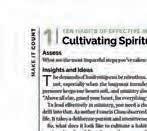
CRITICISM DECISION MAKING




Overcoming Leadership Fears
 By STEPHEN BLANDINO
By STEPHEN BLANDINO
If there’s one thing most news headlines have in common, it is the capacity to instill fear. Whether it’s politics, the economy, COVID, loss of rights, crime — you name it — there is often an anxiety inducing overtone.






As ministers, we lead others through their fears. And sometimes we find ourselves facing the same kinds of worries.

108 Winter 2023
MAKE IT COUNT
REJECTION
LACK FAILURE
CRITICISM



RISK TAKING

How do we overcome fears in leadership? What do we do when anxiety clouds our judgment, undermines our influence, and stands in the way of the vision God has given us?
This edition of ake t ount e amines 1 common leadership fears and considers ways to overcome them. Those fears include the following:

1. Failure. Leaders can overcome this fear when they remember failure is a what, not a whom, and that it can be a place of restoration.
2. Rejection. ost of us want to be liked, but when leaders face rejection, they must maintain allegiance to Christ and learn to separate their identity from their ideas.
3. Lack. Many leaders live with a scarcity mindset, afraid they won’t have enough to see their vision fulfilled. ut the best leaders embrace an abundance mindset, recognizing they serve a God who is limitless.

4. Criticism. very leader has critics. ut we can silence the naysayers when we lead with clarity, courage, credibility, and confidence.
5. Communicating. Many people cite public speaking as their biggest fear, but leaders need this skill to preach, cast vision, and conduct meetings. The key is embracing prayer, preparation, practice, and God’s power to cultivate our communication skills.
6. Decision Making. The toughest decisions always land on the leader s desk. That s why leaders need a decision making filter that includes God, research, experience, perspective, timing, and influencers.
7. Inadequacy. Imposter syndrome involves the fear that people will discover we’re not as good as many perceive us to be. We can overcome the fear of inadequacy when we remember God is with us, God sent us, and God has equipped us.
8. Risk Taking. eaders take risks, but with risk comes the fear it won t work out. To overcome this fear, our internal measure of faith must exceed the external measure of fear.
9. Standing Up. There are times in leadership when you must take an unpopular stand to do what’s right. In these moments, leaders commit to meet needs, solve problems, help people, and make disciples.
1 . Significance. Every leader wants his or her life and leadership to count. We can overcome the fear of not mattering by cultivating the character, contribution, and connections that leave a meaningful legacy.
As you read and discuss each lesson with your team, let it challenge you to walk by faith, not by sight. Face your fears and lead with confidence and courage.
Winter 2023 109
Failure
Assess
ow does the fear of failure affect you Insights
and Ideas
No leader wants to fail. Failure is painful — personally and organizationally. That’s why it is among the most common fears leaders face.
Of course, everyone will experience times of failure. Consider some of the failures from Peter’s life:
• Faithlessness. uring a violent storm, eter took his eyes off Jesus and began to sink. Jesus said, ou of little faith ( atthew 14: 1).
• Speaking foolishly. hen Jesus told is disciples e would suffer and die, eter pulled Jesus aside and reprimanded im. n turn, Jesus rebuked eter ( atthew 1 : – ).
• Pride. Jesus told is disciples they would all desert im, but eter insisted he would never do such a thing. Jesus e posed this prideful response, revealing eter would deny im three times ( atthew : – 5).
• Asleep on the job Jesus asked eter, James and John to pray with im in the arden of ethsemane, but they fell asleep ( atthew : –4 ).
• Overreaction t Jesus arrest, eter pulled out his sword and cut off the right ear of alchus, the high priest s servant. Jesus, recogni ing e must drink from the cup of suffering, told eter to put away his sword (John 18:1 –11).
• Disownment. fter disowning Jesus three times, eter heard the rooster crow and then wept bitterly ( atthew : 5).
From these examples, we can glean two lessons to help us overcome the fear of failure:
1. Failure is a what, not a whom. Failure might define what you ve done, but it does not define who you are. Failure may be a dot on the timeline of your life, but it doesn t represent the whole story.
Failure can define or develop you. The choice is yours. Rather than letting failure define you, let it be a defining moment that serves as a catalyst to help you grow.
2. Failure is a place for restoration, not rejection. It’s easy to beat ourselves up when we fail, but that failure shouldn’t become our permanent residence. hen eter failed, Jesus didn t let him live the rest of his life in shame and regret. fter is resurrection, Jesus told eter, Feed my sheep (John 1:1 ). nstead of re ecting eter, Jesus restored him to his ingdom calling. ou can overcome the fear of failure by leaning in to your true identity in hrist, and then leveraging the failure to grow and move forward.
Reflect and Discuss
1. hat is a failure you ve had to wrestle with in your life or leadership . ow does the statement, Failure is a what, not a whom speak to you . ow does eter s life, and Jesus response to eter, give you hope to overcome your own failures?
Apply
hat failure in your life or leadership has been your greatest struggle Take some time to acknowledge that failure, give it to od, and recogni e who you are in hrist.
110 Winter 2023
OVERCOMING LEADERSHIP FE ARS
MAKE IT COUNT 1
Re ecti n
Team Review
ow has your view of failure changed over the past week
Assess
How does rejection impact your leadership?
Insights and Ideas
Most of us want to be liked. fter all, it s more fun to make friends than enemies. ut good leaders understand the importance of making difficult decisions and changes. An unwillingness to do so turns us into people-pleasing puppets. e read about the dangers of people pleasing in the ospel of John: any even among the leaders believed in Jesus . ut because of the harisees they would not openly acknowledge their faith for fear they would be put out of the synagogue; for they loved human praise more than praise from od (John 1 :4 –4 ).
eople pleasing produced two debilitating weaknesses in the lives of these leaders: pride and paralysis. Pride is evident in their love of human praise more than praise from God. And paralysis is evident in their unwillingness to follow Jesus, even though they desired to do so. These leaders re ected hrist to win human approval. Jesus said, There is a judge for the one who re ects me and does not accept my words the very words have spoken will condemn them at the last day (John 1 :48).
So, how do we deal with the fear of re ection, especially when people begin to turn their backs on us? Consider three essentials:
1. Be faithful in your allegiance to Christ. People pleasing is a real struggle in leadership, but od didn t call you to do only what makes you popular. e called you to serve im faithfully.
2. Separate your identity from your ideas. When we let our ideas become our identity, we tend to interpret rejection of those ideas as a rejection of us. ature leaders understand ideas and identity are two different things. f you don t learn to separate them, you ll carry wounds of re ection for the rest of your life. Just because people don t like your idea doesn t mean they don t like you.
3. Keep your heart soft toward people. t s easy to let re ection make our hearts cold and aded toward others. e careful not to let re ection from others turn into rejection of others. Just because they don t like you doesn t mean you should harbor animosity toward them. eep your heart soft toward people.
Reflect and Discuss
1. n a scale from 1 to 1 , how much do you struggle with people pleasing
2. How do you typically respond to rejection from others?
3. How hard is it for you to separate your identity from your ideas?
Apply
ne key to dealing with re ection in leadership is learning how to receive feedback and value the ideas of others. eflect on how you generally respond to negative feedback, and then think of two ways you can welcome feedback and improve your response in upcoming meetings with others.
Winter 2023 111 OVERCOMING LEADERSHIP
FE ARS
MAKE IT COUNT 2
ac
Team Review
hat ideas did you come up with for processing feedback in healthy ways, especially when the feedback is negative Assess
ow would you define a scarcity mindset
Insights and Ideas
C hurch leaders are called to point people toward a better future, one in which they can flourish as od intends. owever, too often leaders let a lack of resources define their vision rather than letting their vision embolden them to trust in God’s provision. As a result, a scarcity mindset limits what they accomplish for God.
e see the difference in these mentalities through the story of the 1 spies oses sent to e plore the land of anaan. Joshua and aleb returned with an abundance mindset. fter describing Canaan as a land of plenty, they said, e should go up and take possession of the land, for we can certainly do it ( umbers 1 : ).
ut the other 1 spies had a different report. They said, e can t attack those people they are stronger than we are (verse 1). These 1 even described themselves as grasshoppers compared to the people of Canaan. And they spread a bad report among the Israelites.
Failing to trust od has consequences. For the sraelites, the consequence was 4 years in the wilderness.
eaders with a scarcity mentality will always live in the land of lack, but leaders with an abundance mentality will look beyond their circumstances and see that od is with them. To differentiate between a scarcity mindset and an abundance mindset, consider these insights:
• A scarcity mindset focuses on lack, while an abundance mindset focuses on God.
• A scarcity mindset complains about what it doesn’t have, while an abundance mindset gives thanks for what it does have.
• A scarcity mindset settles for its current reality, while an abundance mindset sees future possibility.
• A scarcity mindset resents the success of others, while an abundance mindset believes there is plenty of success to go around.
• A scarcity mindset resists change, while an abundance mindset believes new possibilities require change
• A scarcity mindset is driven by fear, while an abundance mindset is driven by faith hich mindset best describes you f you find yourself leaning in the direction of a scarcity mindset, change is possible. ou can overcome the fear of lack, but you must first release those fears to God.
Reflect and Discuss
1. ead umbers 1 : 5– . hat most speaks to you about the difference in mentality between Joshua and aleb and the other 1 spies
2. What are some examples of how a scarcity mindset limits leaders today?
3. Which characteristic of a scarcity mindset versus an abundance mindset most challenges you?
Apply
eflect on the differences between a scarcity mindset and an abundance mindset. hat changes do you need to make to develop more of an abundance mindset Share your observations with a friend, asking that person to pray for you and hold you accountable for the ne t days.
112 Winter 2023
OVERCOMING LEADERSHIP FE ARS
MAKE IT COUNT 3
iticism
Team Review
hat steps have you taken to cultivate an abundance mindset Assess
How good are you at handling criticism?
Insights and Ideas
One of the most celebrated stories in the ible is that of avid and oliath. hen oliath challenged the sraelites to send a man to fight him, Saul and his army were dismayed and terrified. oliath had been harassing the sraelites twice a day for 4 days.
Then David heard Goliath’s taunt and discovered the man who could defeat the Philistine giant would receive wealth, a wife, and e emption from paying ta es (1 Samuel 1 : 5). avid became emboldened by the challenge until his brother liab asked, hy have you come down here nd with whom did you leave those few sheep in the wilderness know how conceited you are and how wicked your heart is you came down only to watch the battle (verse 8). Eliab criticized David’s position as a shepherd and the posture of his heart. ut rather than returning home, avid silenced his critics. From avid s life, we discover four keys to overcoming the fear of criticism.
1. Clarity fter hearing liab s criticism, avid turned away to someone else and brought up the same matter, and the men answered him as before (verse ). gain avid clarified what would be done for the man who killed oliath. hen you lack clarity of vision, you are more likely to back off the vision when somebody critici es your efforts.
2. Courage. avid went to ing Saul, saying, et no one lose heart on account of this hilistine your servant will go and fight him (verse ). avid had the courage to do what no other sraelite had done during the previous 4 days. aysayers are the loudest when the verdict is still out. Courage delivers the verdict.
3. Credibility. ven Saul challenged avid s ability to take on oliath, but avid responded, our servant has been keeping his father s sheep. hen a lion or a bear came and carried off a sheep from the flock, went after it, struck it and rescued the sheep from its mouth. hen it turned on me, sei ed it by its hair, struck it and killed it (verses 4– 5).
Rather than caving to the criticism, David reminded Saul he had prepared for this day. Preparation gives leaders credibility in the face of critics.
4. Confidence avid concluded his remarks to Saul: The LORD who rescued me from the paw of the lion and the paw of the bear will rescue me from the hand of this hilistine (verse ). avid s confidence was in the ord.
Similarly, leaders today must cultivate an unwavering trust in od that gives them confidence in the face of critics.
Reflect and Discuss
1. hat is the most difficult kind of criticism for you to deal with
2. How does David’s response to criticism inspire and challenge you?
3. Which of the four responses above do you most need to develop?
Apply
ead and reflect on the story of avid and oliath. nvite the oly Spirit to use this te t to infuse courage and wisdom in your soul and help you overcome the fear of criticism.
Winter 2023 113
LEADERSHIP
OVERCOMING
FE ARS
MAKE IT COUNT 4
mmunicating
Team Review
What insights have you gleaned from the story of David and Goliath to help you overcome the fear of criticism?
Assess
What fears do you have when it comes to communication?
Insights and Ideas
Many people say public speaking is their biggest fear, but communication skills help ministry leaders more effectively cast vision, deliver sermons, and conduct meetings.
Throughout Scripture, we see instances of difficult communication and powerful communication. For e ample, in his burning bush encounter with od, oses said, ardon your servant, ord. have never been eloquent, neither in the past nor since you have spoken to your servant. am slow of speech and tongue ( odus 4:1 ). oses was willing to use his inability to speak as an excuse to disobey God. owever, on the ay of entecost, eter stood up with the leven, raised his voice and addressed the crowd: Fellow Jews and all of you who live in Jerusalem, let me e plain this to you listen carefully to what say ( cts :14). fter eter preached, , people accepted hrist. So, how do we overcome fears associated with communication elow are four places to start.
1. Prayer rayer prepares your heart to hear from od. hen you know you have a word from od, prayer gives you greater confidence to communicate it. Seeking od in prayer gives you ears to hear what the Spirit wants you to say.
2. Preparation. aul told Timothy, reach the word; be prepared in season and out of season; correct, rebuke and encourage — with great patience and careful instruction ( Timothy 4: ). Preparation is spiritual. In fact, preparation helps you say something worth listening to. create a manuscript for every sermon preach because it helps me cut out the fluff, focus the message, dissect Scripture, increase clarity, maximize illustrations, improve transitions, and start and end strong.
3. Practice. There is nothing spiritual about boring your audience. To become a better communicator, practice in front of three or four people, inviting their honest feedback. Then make necessary adjustments to improve your delivery.
4. Power. aul knew communicating the gospel effectively wasn t ust a matter of human effort. e told the church in orinth, y message and my preaching were not with wise and persuasive words, but with a demonstration of the Spirit’s power, so that your faith might not rest on human wisdom, but on od s power (1 orinthians :4–5).
ou can pray, prepare, and practice, but you must return to prayer and ask od to work through the message as only He can do. A sermon’s power is not about the volume of the preacher’s voice; it’s about the presence of the Holy Spirit.
Reflect and Discuss
1. hat makes communication most impactful to you
. hich of the four keys to communication most challenges you
3. What other ideas or tips have helped you become a better communicator?
Apply
Take time to prepare for your ne t speaking event. t might be a sermon, a vision casting talk, or even a presentation during a meeting. Put the four tips above into practice, and then evaluate how you’ve improved.
114 Winter 2023
LEADERSHIP
OVERCOMING
FE ARS
MAKE IT COUNT 5
Decisi n a ing
Team Review
How have the ideas from the last lesson helped you improve your communication? Assess
hat helps you make good decisions in leadership
Insights and Ideas
The toughest decisions always land on the leader s desk. nd when the stakes are high, it s easy to second guess what to do. ut good leaders develop a filter for decision making so they can overcome the fear of making the wrong choice. That decision making filter should take into account six ingredients.
1. God. any things can help with good decision making, but none of them can replace seeking od. James reminds us, f any of you lacks wisdom, you should ask od, who gives generously to all without finding fault, and it will be given to you (James 1:5).
2. Research. The best decision making usually happens when we have the most information. However, most doesn’t mean all. ou ll never have all the information, but you should still do appropriate research. Jesus said, Suppose one of you wants to build a tower. on t you first sit down and estimate the cost to see if you have enough money to complete it? For if you lay the foundation and are not able to finish it, everyone who sees it will ridicule you, saying, This person began to build and wasn t able to finish ( uke 14: 8– ).
3. Experience Job 1 :1 asks, Is not wisdom found among the aged? Does not long life bring understanding perience can be a good informer of future choices. ife e perience offers tested insight, and that wisdom should inform your decision making process.
4. Perspective. roverbs 1 : says, alk with the wise and become wise, for a companion of fools suffers harm. our associations shape your decisions. y seeking counsel, you broaden your perspective on the decisions you need to make. roverbs 1 : says, isten to advice and accept discipline, and at the end you will be counted among the wise.
5. Timing. The right decision at the wrong time is a lost opportunity. ut when your timing is right — for you, your team, and the church — the level of buy-in for the decision naturally increases. When the timing is wrong, even good decisions can produce poor outcomes.
6. Influencers. John a well said, eople buy in to the leader before they buy in to the vision. ou need buy in to create forward movement with the decisions you make. f your leaders and influencers don t buy in, you won t get far.
Reflect and Discuss
1. hat kinds of decisions make you most an ious . hich decision making ingredient is your greatest strength, and which is your greatest weakness
3. What is a decision you’re facing now, and to which of the six ingredients do you need to give more attention?
Apply se the filter above to work through a decision you re considering. eep this process in mind when approaching future decisions.
Winter 2023 115 OVERCOMING LEADERSHIP FE ARS
MAKE IT COUNT 6
Inade uac
Team Review
ow did you work through your decision Assess
hen are you most likely to feel inadequate in your calling Insights and Ideas
I mposter syndrome is the fear that people will discover we’re not as good as many perceive us to be.
For e ample, if you re known for speaking on a certain topic, you may feel you don t live up to the expertise you exude. Or if people often say you are a great parent, you may feel inadequate when your kids are acting up. e can begin to feel like imposters, hoping nobody finds out we re not that good.
Similarly, ministers can have a reputation as great leaders even while feeling inadequate for the job.
A biblical example of imposter syndrome is Moses. When God called Moses to lead the Israelites, oses said, ho am , Suppose go , hat if they , have never been , and, lease send someone else ( odus :11,1 4:1,1 ,1 ). Simply put, oses was saying, m not good enough.
How do we overcome the fear of inadequacy that leads to imposter syndrome? We can remind ourselves of three important truths from the story of Moses.
1. God is with you. oses asked, ho am ( odus :11). The ord responded by moving oses focus to od s faithfulness: will be with you. And this will be the sign to you that it is I who have sent you: When you have brought the people out of Egypt, you will worship od on this mountain (verse 1 ).
With God, nothing is impossible. We may feel inadequate, but He isn’t.
2. God sent you. od said to oses, I AM WHO I AM. This is what you are to say to the Israelites: ‘I AM has sent me to you ( odus :14).
We must remind ourselves that if the assignment is from God, He will see it through. Even when we feel inadequate, od believes in us enough to send us. That reality should fill us with confidence and dependence on od.
3. God equipped you. hen oses doubted, od asked him, hat is that in your hand oses replied that it was a staff, and the Lord said, Throw it on the ground. ( odus 4: –). The staff turned into a snake, and then back into a staff. This assured oses that od s power would go with him.
od has likewise equipped you with is gifts and power to carry out is work. hen you feel like an imposter, remind yourself, God has gifted me. God has empowered me. I have what I need to do what He has called me to do.
Reflect and Discuss
1. ow do feelings of inadequacy keep us from ma imi ing od s call on our lives
2. Which message from God do you most need to hear when you feel inadequate for your calling: God is with me, God has sent me, or God has equipped me?
3. How can we encourage one another when we experience imposter syndrome?
Apply
f you re e periencing imposter syndrome, read oses story in odus –4. Then rest in the knowledge that od is with you, e has sent you, and e has equipped you.
116 Winter 2023 OVERCOMING LEADERSHIP FE ARS
MAKE IT COUNT 7
Ris Ta ing
Team Review
ow has od encouraged you over the past week when you felt inadequate Assess
hat scares you most about taking risks Insights and Ideas W hen venturing into new territory, it can feel risky, and with every risk comes the fear it won t work out. e worry we ll look foolish, feel embarrassed, or e perience utter failure. ut od isn t a safe od. es, od is a Strong Tower to whom we can run for comfort and security, but He doesn’t call us to live safe, predictable, faithless lives. Instead, God calls us to step out of our comfort zones and do things that require trusting Him. s the saying goes, The point of life isn t to arrive safely at death. The apostle aul said, e live by faith, not by sight ( orinthians 5: ). Faith can feel risky, but faith is the currency of heaven. ebrews 11:1 describes faith as confidence in what we hope for and assurance about what we do not see.
The not seeing is the hard part. t s the part that feels risky. t s the part that whispers, What if it doesn’t work? ut faith is where od moves. Faith is where leaders see the greatest breakthroughs and the biggest victories.
Until our internal measure of faith exceeds the external measure of fear, we’ll never experience all od has for us. ere are 1 practical ways to increase your faith:
1. Engage God’s Word every day.
2. Keep a gratitude journal.
3. Surround yourself with positive, faith-filled people.
4. Disconnect from sources that perpetuate fear and anxiety.
5. Read biographies of leaders who believed God for big things.
6. Pray with people who actually believe what they’re praying.
7. Set bold goals that require more than you to reach them.
8. Immerse yourself in creative and innovative environments.
9. Faithfully and consistently pray and believe for something greater.
1 . Take a step of faith today.
These steps aren t rocket science, but it s ama ing how often we fail to take them. n fact, we often do the opposite. We neglect our time in God’s Word. We complain about what we don’t have. We listen to negative people and consume large doses of anxiety-inducing media. We read social media posts rather than books that bolster our faith. e pray with faithless people and set easy, comfortable goals. We don’t venture outside of our routine environments. And we’ve stopped praying and believing for something greater.
Simply put, we have a tendency to live by sight, not by faith.
Reflect and Discuss
1. hat bolsters your faith in od and moves you to take more risks hich of the 1 faith building steps most challenges you
3. For what things do you need to start praying and trusting more?
Apply
eview the list of 1 ways to increase your faith. ick two you aren t currently doing and make them daily habits over the ne t days. Journal the difference it makes, and then reflect on your ne t steps after days.
Winter 2023 117 OVERCOMING LEADERSHIP FE
ARS
MAKE IT COUNT 8
Standing Up
Team Review
Which two faith-building steps did you start?
Assess
When did you regret not standing up for someone or something that mattered?
Insights and Ideas
E veryone e periences regrets. n his e tensive research on the topic, author aniel ink collected more than 1 , regrets from people in 1 5 countries. ne of the four ma or categories ink identified was moral regrets — remorse over doing the wrong thing.
Failing to stand up for what’s right often leads to such regrets. For example, maybe you turned a blind eye when someone was being bullied. erhaps an organi ation you worked for did something unethical and you ignored it. Maybe you gave yourself a pass on subtle compromises in character.
Such situations are opportunities to take a stand and do the right thing, but fear can hold us back. e worry about how someone will respond. e fear what others might say. e dread the potential fallout.
Scripture is filled with stories of leaders who stood up and spoke up, and of others who sat down and did nothing. sther knew standing up could cost her everything. ut ordecai sent her a letter with a dire warning: o not think that because you are in the king s house you alone of all Jews will escape. For if you remain silent at this time, relief and deliverance for the Jews will arise from another place, but you and your father s family will perish. nd who knows but that you have come to your royal position for such a time as this ( sther 4:1 –14).
Our priorities in ministry should be the glory of God and the good of others. Therefore, if we want opportunities to stand up and do what s right, we should continually ask ourselves four questions:
1. What need can I meet?
2. What problem can I solve?
3. What person can I help?
4. What disciple can I make?
ur answers to these questions will show us how to stand up and make our leadership count. This process can help us overcome the fear of not standing up for what matters most. When we’re too scared to answer these questions, it’s an indicator we’ve lost our courage to lead.
Reflect and Discuss
1. hat are the most common e cuses you ve encountered for not standing up for what is right
. hat lessons from sther s life speak to you about having courage in the face of pressure and difficulty
. ow do the four questions above challenge you to stand up and make your leadership count
Apply
Take some time to answer four questions: hat need can meet hat problem can solve hat person can help hat disciple can make Then have the courage to stand up and make a difference in these areas.
118 Winter 2023
LEADERSHIP
OVERCOMING
FE ARS
MAKE IT COUNT 9
A Spirit-empowered disciple embodies seven dimensions.

BIBLE MISSION SPIRIT WORSHIP PRAYER SERVICE
GENEROSITY
A Spirit-empowered disciple is a lifelong follower of Jesus. All Spirit-empowered disciples are called to practices that identify us as disciples, deepen our relationship with Jesus, and strengthen our effectiveness in making disciples.
Download a free copy of the 7 Dimensions guide here:
Learn more at www.discipleship.ag.org Or scan QR code above
Significance
Team Review
What did you do this past week to stand up for what is right?
Assess
hat does living a life of significance mean to you
Insights and Ideas
Living a life that doesn t matter is a ma or fear for many people. Significance is not a matter of notoriety or fame. n fact, most people live and die in relative obscurity. ut that doesn t mean their lives are insignificant.
The question is, are we making each day count ow we invest our days determines what kind of legacy we leave. ou can t decide when you finish, but you can determine how you finish. egacy doesn t happen in a single day it happens every day. t doesn t start when you take your last breath. t starts when you make your first choice. our daily decisions form the runway of your legacy. ou choose your legacy every day. eath is simply the stamp that delivers it — for good or bad — to future generations. f you want to leave a legacy worth remembering when you die, you have to write a legacy worth recording while you re alive.
salm :1 says, Teach us to number our days, that we may gain a heart of wisdom. nstead of worrying, we can ma imi e our days in three areas:
1. Character ho you are matters more than what you accomplish. our character is e traordinarily important. erhaps more than anything else, character is what people remember. s your life marked by integrity o you e hibit the fruit of the Spirit re you loving, generous, humble, forgiving and honest
. Contribution. ost people make a contribution of some kind. That contribution is usually connected to their gifts, abilities, skills and resources. ow are you leveraging your od given gifts and resources to make the world a better place and point people to Jesus ow do you ma imi e your giftedness for the good of others
. Connection. Forming connections is all about the people in whom you invest. astor ndy Stanley said, our greatest contribution to the kingdom of od may not be something you do, but someone you raise. The investments you make in people — whether family members, friends, mentees, employees, church members, or the needy — are part of your legacy.
Reflect and Discuss
1. hat person did you know who left a remarkable legacy you hope to emulate
. For what do you most want your life to be remembered . hat do the three areas of significance and legacy — character, contribution and character — mean to you
Apply
Think about what a significant life looks like. hat changes do you need to make now to invest your days well and leave a legacy
120 Winter 2023
OVERCOMING LEADERSHIP FE ARS
MAKE IT COUNT 10

PRISONER TO PASTOR
By CHENO ECHEVARRIA
My mother was three months pregnant with me when she boarded a boat and fled uba. grew up in a gang infested iami neigh borhood, oining my first gang at age 8. y initiation took place in an empty parking lot, where had to fight three kids simultaneously.
The beating left me with a badly swollen face, but quickly learned to act tough. That same year, was arrested twice and e pelled from two schools.
By the time I was 16, I had served nine jail sen tences and been kicked out of nearly every school attended.

man named on regularly visited the uvenile detention center, preaching messages about Jesus. sat through a few of his meetings, but only because on brought cookies and soda pop.

y family practiced Santeria, a form of witch craft, so was used to hearing about the spiritual world. The spirits of my childhood were distant
and frightening, but on talked about a od who was personal and loving. This od offered hope and fresh starts — even for people like me.
lthough my life had barely begun, felt like it was over. ther kids my age were learning to drive, attending proms, and touring colleges. was facing multiple felony charges, any of which could have resulted in a lengthy prison sentence. ith the specter of life behind bars hanging over me, started reading the ible and searching for this od whom on seemed to know. n despera tion, called out to od, asking im to rescue me.
To my surprise, was soon released on proba tion. wish could say served Jesus from that day forward. ut with no church and no hristian friends, was like a hot coal plucked from the fire. The small ember of faith in my heart quickly cooled and died out. radually, returned to a life of drugs, street
122 Winter 2023
IS MY
THIS
STORY
FALLING ON MY BED, I BURIED MY FACE IN THE STIFF, STATE-ISSUED SHEETS AND WEPT. IN THAT MOMENT, AMID THE TEARS, I KNEW I NEEDED TO CHANGE.
crime, and se ual immorality. ven after my girl friend and became parents, continued down a path of self destruction.
t 1 , was incarcerated again. nce more, pleaded with od to get me out. thought a quick release would somehow fall into place, ust as before. ut this time, the udge presiding over my arraignment denied bond and enhanced my charges. The prosecutor offered a plea deal — of years in prison.
s returned to my prison dormitory, thought about my 1 year old son growing up without a dad. Falling on my bed, buried my face in the stiff, state issued sheets and wept. n that moment, amid the tears, knew needed to change.
Some hristian inmates were gathering in a near by commons area for their nightly ible study. decided to oin them.
That night, when I heard the gospel, I gave the message my full attention. nd for the first time, truly understood. reali ed Jesus offered freedom from the sin that bound me spiritually. n response, asked od to have mercy on me, forgive me, and change me.
s the peace of od enveloped me, sensed my life would never be the same. s Jesus put it in John 8: , was free indeed. ratefully, thought of on, who had planted the first gospel seed during my childhood.
still hoped od would free me from my physi cal prison, but that did not immediately happen. spent five more years behind bars. owever, what thought would be the darkest time of my life turned out to be the greatest.
uring that season, as fully surrendered every part of my life to hrist, began growing and serv ing. led ible studies in nglish and Spanish, developing such a passion for ministry dreamed of one day becoming a pastor.
received a certificate, learned computer skills, and even took some ible classes.
Finally, in ovember 4, completed my sen tence and went home — free in every way. connected
with my son and finally became a father to him. met and married an ama ing hristian woman, ydia, and od blessed us with three more children. Together, we traveled the country, sharing my tes timony and ministering through music. e also opened a car wash business, which helped fund our ministry.
n 1 , ydia and became staff members at Trinity hurch, an ssemblies of od congregation in iami led by ich and obyn ilkerson. e completed ministry degrees through the church s leadership school. Soon after graduating, became a youth pastor at Trinity.

y family and moved to eorgia during 1 to start a life giving church in the tlanta metropoli tan area. hat began as a dream in the heart of a newly converted 1 year old in ail became a reality as we launched reater hurch ( ) on ug. 1 of that year.
hurch planting hasn t always been easy, but our calling to make disciples is clear. e are convinced the hurch is the hope of the world. y ourney to the pulpit was far from conven tional. evertheless, am living proof the gospel we preach still changes lives.
RAMESES “CHENO” ECHEVARRIA is lead pastor of Greater Church (AG) in Kennesaw, Georgia.
Winter 2023 123
College Guide 2023 ASSEMBLIES OF GOD












124 Winter 2023





Winter 2023 125 Assemblies of God higher education prepares students for a lifetime of service. 126 PRE PARE TO LAUNCH F ive essentials for college success 136 D IRECTORY OF AG COLLEGES A ND UNIVERSITIES
prepare to launch


FIVE ESSENTIALS FOR COLLEGE SUCCESS


 By JOSHUA EDMON
By JOSHUA EDMON
lAUNCHING YOUNG PEOPLE into the adult world is one of the most gratifying yet challenging aspects of discipleship for the local church.
When they leave the security of our youth groups and church families, the faith we have diligently nurtured will either bear more excellent fruit or reveal the formational gaps in their relationships with Christ.
There are some important things you can do to prepare the next generation for a robust college experience — and a lifetime of serving Jesus. Following are five essentials to start developing in them now.
1. SPIRIT EMPOWERMENT
Every student needs to know what it means to “walk by the Spirit” (Galatians 5:16).
Assemblies of God schools are unashamedly Pentecostal. Chapel services, classroom instruction, and student-life interactions focus heavily on the power and presence of the Holy Spirit in our lives.
Many students come to college with little or no understanding of the baptism in the Holy Spirit. I am grateful some are receiving the Baptism on our AG campuses. However, I am concerned those heading to college without the strength that comes from the infilling of the Spirit will find themselves lacking the power they need to live godly lives in a broken world.
Jude 20–21 says, “You, dear friends, by building yourselves up in your most holy faith and praying in the Holy Spirit, keep yourselves in God’s love as you wait for the mercy of our Lord Jesus Christ to bring you to eternal life.”
Praying in the Spirit and growing in discipleship helps students build an internal infrastructure that will withstand their launch into the adult world.
So many Christian young people fall apart when facing the pressures of the world around them and the uncertainties inside them. But when we teach students to live Spirit-empowered lives, we are fortifying them to endure the journey and keep their faith intact.
2. SPIRITUAL DISCIPLINES
At the core, student discipleship must include tools to equip young people to take ownership of their walk with Christ.
Students might have been exposed to excellent teachers, leaders, and speakers. But unless they are seeking God, hearing from God, and studying God’s Word for themselves, they will be ill-equipped to launch their college years.
Make sure your students are biblically literate. Give them resources for reading and interpreting Scripture independently. Help them develop personal prayer habits.
Teaching students spiritual disciplines is a critical step in their formation.
3. DIVERSE WORLDVIEW
Attending a university is one of the most eye-opening experiences in a young person’s life. The world they knew in their first 18 years suddenly breaks wide open as they encounter new people and new ideas.
Many students have little experience interacting with people of different races, ethnicities, nationalities, cultures, socioeconomic statuses, and perspectives. Help them prepare for this transition by making diversity a valued part of your church culture.
AG universities embrace diversity — not just for representation, but also because we want to give students opportunities to lead in the ways God has formed and shaped them. We believe every person is created in the imago Dei, or the image of God. As image bearers, we have unique qualities that reflect God’s love for diversity. When we celebrate diversity, we honor our Creator.
Diversity is God’s idea. He created all the people of the world for His glory. Prepare your students for diverse college environments by teaching them about God’s love for “every nation, tribe, language and people” (Revelation 14:6).
4. CRITICAL THINKING SKILLS
Students are facing a world that gets more confusing every day. They are bombarded with competing perspectives and ideas that are presented as facts.
Young people need spiritual discernment and critical thinking skills to sift through cultural conversations with grace and truth. Students crave honest discussions regarding gender, sexuality, justice, sin, and repentance. Too often, leaders avoid these topics because they are uncomfortable discussing them.
Students need a framework for processing the information and claims they encounter. Engaging in honest conversations with them gives students categories for sifting through what they hear and read.
Winter 2023 127
As young people interact with new ideas, they can then determine whether those viewpoints are accurate or misleading, biblical or unbiblical, godly or ungodly. Helping students think critically and distinguish between spiritual truths and false statements is fundamental to preserving their faith.

This type of discipleship requires patience and self-control. When a young person questions a concept, don’t react harshly or simplistically. Learn to ask open-ended questions. Be willing to leave the door open for further discussion.
Give students space to consider an issue and come back later with another thought. Rather than immediately shutting down their opinions, it is often more helpful to let teens work through the discovery process, providing gentle guidance along the way.
difficult times (James 1:4–5). Teach young people how to apply biblical principles, pray, and lead victorious lives.
Model and talk about resilience in Christian living. Be honest about your struggles, discussing how God and the support of others helped you overcome them. Students need to know there will be challenging moments ahead, but that God will see them through.
Young people
Many of the issues with which young people wrestle are not abstract concepts but deeply personal ones that have big implications for them and their friends.
Teach students the Bible, but also help them develop the ability to correctly handle the Word (2 Timothy 2:15). Support them, pray for them, and lead them lovingly and graciously. And as students launch, trust the Holy Spirit to continue to guide them into all the truth (John 16:13).
5. RESILIENCE
At the university level, we see a trend of young people lacking resilience. Many students are easily overwhelmed and struggle to overcome anxieties, fears, and doubts.
Help students grow perseverance by encouraging them to trust God and seek His wisdom during
I often tell students who are struggling that I, too, face hard days. I then take them through my process of personal prayer and Bible reading and talk about how these disciplines help me move from fear to faith. Inviting students on my journey of overcoming gives them a template to follow so they can become more resilient.
Encourage students to reach out for help if they are feeling depressed or struggling with anxiety.
If seeing a counselor has been a part of your journey, consider sharing that experience. Students will appreciate your authenticity.
Today’s young people are facing unprecedented pressures. But the Holy Spirit remains our greatest Advisor and Advocate. He will provide you with creative methods, timely instruction, and divinely inspired words to help students embark on their college adventures with strength, resilience, and faith.
128 Winter 2023
JOSHUA EDMON is associate vice president of spiritual life and dean of multicultural engagement at North Central University in Minneapolis.
need spiritual discernment and critical thinking skills to sift through cultural conversations with grace and truth.
•
•
•




Prepare for it at Evangel University. ON SITE OR ONLINE Schedule a campus visit and:
Tour our beautiful campus
Meet faculty and staff
•
Check out a class in your intended area of study
Attend a chapel service
Experience our Valor community firsthand evangel.edu/visit 417.268.1000
•







NORTHPOINT BIBLE COLLEGE AND SEMINARY NORTHWESTU.EDU @NORTHWESTU BACHELOR’S MASTER’S 100% ONLINE YOUR HIGHEST CALLING FOUND HERE. PRIVATE CHRISTIAN UNIVERSITY U.S. NEWS BEST VALUE









Knowledge enhancement means career advancement. It’s your turn — time to chase that dream you thought was out of reach with Southeastern University. Your Doctoral Degree Awaits SEU.edu 800.500.8760 | Lakeland, Florida @seuniversity 100+ degrees available at the associate, bachelor’s, master’s & doctoral levels Online | On-Campus | Partner Sites Nationwide Education (EdD) Ministry (DMin) Missiology (DMiss) Organizational Leadership (PhD) Strategic Leadership (DSL)








SAVE UP TO 25% ON TUITION FOR OUR GRADUATE STUDIES DEGREE PROGRAMS! SAGU.EDU / VALUE to acheive your goals and realize your calling! NEWLY REDESIGNED D.MIN Doctor of Ministry in Leadership Specializations available in COMMUNICATION & TECHNOLOGY CULTURAL ENGAGEMENT GENERAL MINISTRIES ACCREDITED MASTER’S DEGREES AVAILABLE IN MINISTRY | BUSINESS | EDUCATION | THEOLOGY | LEADERSHIP | PSYCHOLOGY



van g uard . ed u Orange Count y, CA • Onlin e PAVIN G TH E WAY F OR W ORLD -C HAN GER S Acade mi c E xcel l ence S i nce 1920

















ASSEMBLIES OF GOD Colleges and Universities

1 . Assemblies of God Theological Seminary
1435 N. Glenstone Ave., Springfield, MO 65802-2131 1-800-467-AGTS agts.edu
2 . Caribbean Theological College
P.O. Box 1335, Bayamón, PR 00960 (787) 780-5555 ctcad.com
3 . Christ Mission College
10822 FM 1560 N., San Antonio, TX 78254 (210) 688-3101 cmctx.org
4 . Evangel University
1111 N. Glenstone Ave., Springfield, MO 65802 1-800-EVANGEL (382-6435) evangel.edu
5 . Global University 1211 S. Glenstone Ave., Springfield, MO 65804 1-800-443-1083 globaluniversity.edu
6 . Korean Assemblies of God Theological School of New York 13030 31st Ave., Flushing, NY 11354-2818 (718) 461-9700
7. LABI College 14209 E. Lomitas Ave., La Puente, CA 91746 (626) 968-1328 labi.edu
8 . Native American Bible College
355 Albert Currie Rd., Shannon, NC 28386 (910) 843-5304 nabc.edu
9. North Central University
910 Elliot Ave., Minneapolis, MN 55404 1-800-289-6222 northcentral.edu
10 . Northpoint Bible College
320 S. Main St., Haverhill, MA 01835 (978) 478-3400 northpoint.edu
11. Northwest University 5520 108th Ave. N.E., Kirkland, WA 98033 (425) 822-8266 northwestu.edu
12 . Southeastern University 1000 Longfellow Blvd., Lakeland, FL 33801 (863) 667-5000 seu.edu
13 . Southwestern Assemblies of God University 1200 Sycamore St., Waxahachie TX 75165 1-888-YES-SAGU sagu.edu
14 . Southwestern Assemblies of God University American Indian College 10020 N. 15th Ave., Phoenix, AZ 85021 (602) 944-3335 aicag.edu
15 . Trinity Bible College & Graduate School 50 Sixth Ave. S., Ellendale, ND 58436 1-800-523-1603 trinitybiblecollege.edu
16 . University of Valley Forge 1401 Charlestown Rd., Phoenixville, PA 19460 1-800-432-8322 valleyforge.edu
17. Vanguard University 55 Fair Dr., Costa Mesa, CA 92626-9601 1-800-722-6279 vanguard.edu
136
2 15 10 6 16 13 12 1 5 8 9 3 11 7 17 14 4
Winter 2023







































































































































































































T M What is your outreach plan this year? WWW.REALITYOUTREACH.ORG 800-263-2114 ANY CHURCH ANY SIZE ANY CITY Evangelistic Drama Outreaches 2021-Current






































































 FROM THE EDITOR
FROM THE EDITOR




 GEORGE P. WOOD is executive editor of Influence magazine.
GEORGE P. WOOD is executive editor of Influence magazine.




















 By DOUG CLAY
By DOUG CLAY





 By GEORGE P. WOOD
By GEORGE P. WOOD
















































































 By ROLLIE AND TAMMY DIMOS
By ROLLIE AND TAMMY DIMOS










 JOHN CRUZ
JOHN CRUZ


 By DONNA BARRETT
By DONNA BARRETT






 By DARRIN J. RODGERS
By DARRIN J. RODGERS










 By GEORGE P. WOOD
By GEORGE P. WOOD





































































































































































































































































































































































































































































































































































































































































 By MICHELLE VAN LOON
By MICHELLE VAN LOON

























 By STEPHEN BLANDINO
By STEPHEN BLANDINO
































 By JOSHUA EDMON
By JOSHUA EDMON


































































































































